SPR Welcomes New Members in 2020
Ayse Akcan Arikan
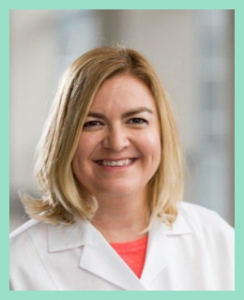 I am board certified in pediatric critical care medicine and pediatric nephrology. I serve as the Medical Director of Critical Care Nephrology and Acute Dialysis and Medical Director of Extracorporeal Liver Support.I am a clinician scientist with expertise in clinical research. I mentor many learners and junior attedings in their research activities. My main areas of research interest are Acute kidney injury diagnosis and management, outcomes of continuous renal replacement therapy (CRRT), nutirion in CRRT, pharmacokinetics in extracoporeal therapies, shock management, fluid and electrolytes.
I am board certified in pediatric critical care medicine and pediatric nephrology. I serve as the Medical Director of Critical Care Nephrology and Acute Dialysis and Medical Director of Extracorporeal Liver Support.I am a clinician scientist with expertise in clinical research. I mentor many learners and junior attedings in their research activities. My main areas of research interest are Acute kidney injury diagnosis and management, outcomes of continuous renal replacement therapy (CRRT), nutirion in CRRT, pharmacokinetics in extracoporeal therapies, shock management, fluid and electrolytes.
Deepthi Alapati

Dr. Deepthi Alapati is an Attending Neonatologist at Nemours Al duPont Hospital for Children and has witnessed the significant burden of lung disease in preterm infants admitted to neonatal intensive care unit which led to her interest to pursue bench research to understand the pathogenetic mechanisms leading to bronchopulmonary dysplasia (BPD). She received her initial training in basic science research and mentorship from Dr. Shu Wu and Dr. Eduardo Bancalari at University of Miami during her clinical neonatology fellowship. During this time, her work was focused on evaluating the role of Cellular communication network factor 2 (CCN2), and she demonstrated that CCN2 was significantly increased in lungs of infants who died from BPD and that CCN2 mediated lung injury in a neonatal rat model of BPD. For this work, she received the Advancing Newborn Medicine Research Grant for Fellows sponsored by the American Academy of Pediatrics. After graduation from clinical fellowship, she moved to Nemours AI duPont Hospital for Children as a clinical attending neonatologist. In the initial years as attending neonatologist, she initiated and led a clinical program for improving clinical care and outcomes of infants with severe BPD complicated by pulmonary hypertension. She also sought mentorship from Dr. Thomas Shaffer in Nemours Research Lung Center and procured research grants from Extracorporeal Life Support Organization and ACCEL– Delaware Clinical and Translational Research development program and did clinical research pertaining to risk factors leading to severe BPD, practice variations in the use of oxygen and ventilator pressures for treatment of severe lung disease in neonates and developed in vitro models to study biological effects of different levels of oxygen and ventilator pressures on airway epithelial and pulmonary artery smooth muscle cells. She further completed a Masters degree in Translation Research at the University of Pennsylvania with mentorship from Dr. Edward Morrisey and collaborated with Dr. William Peranteau at The Children’s Hospital of Philadelphia, to develop a novel technique to deliver gene editing reagents to the fetal lung and demonstrated successful and efficient gene editing in lung epithelium. Importantly, this approach also resulted in reversal of toxic effects caused by a lethal mutation in alveolar type 2 epithelial cells and led to improved alveologenesis and improved survival of these mice that would otherwise die within few hours after birth. Her current research is focused on evaluating the alveolar epithelial role of CCN2 and expand the application of recent advances in gene editing technology to complex lung diseases such as BPD, a very important area of unmet need in neonatology. Her research examines the pulmonary cell-specific molecular mechanisms within the lung microenvironment using complex genetic mouse models and co-culture systems and applies gene editing technologies as a mechanistic and therapeutic tool to modulate candidate genes in complex lung diseases such as BPD with a long-term goal to develop novel therapies to promote lung repair and regeneration for treatment of neonatal lung diseases such as BPD.
Aline Andres
 Dr. Andres is an Associate Professor in the Department of Pediatrics at the University of Arkansas for Medical Sciences and the Associate Director for Clinical Research at Arkansas Children’s Nutrition Center. Her team’s research focuses on examining the effects of prenatal and postnatal nutrition on anthropometrics, body composition, metabolism and physical activity of infants and children. Dr. Andres leads two longitudinal cohorts, one focused on the effects of early infant feeding (breastmilk, cow’s milk-based infant formula and soy-based infant formula) on growth and development spanning infancy to age 14 years and one focused on maternal adiposity during pregnancy and its effect on offspring growth, development and metabolism up to age 8 years. She is also the principal investigator on a randomized controlled trial of exercise during pregnancy in obese, sedentary women which follows their offspring up to age 8 years. A novel area of research for her team is ascertaining the effect of obesity on oocyte gene expression and follicular fluid content and testing whether dietary and physical activity interventions can offset these effects. A second emerging area of interest is on the effect of maternal adiposity on breastmilk composition and its impact on child growth and body composition. All these projects require the estimation of growth and body composition in infants and children.
Dr. Andres is an Associate Professor in the Department of Pediatrics at the University of Arkansas for Medical Sciences and the Associate Director for Clinical Research at Arkansas Children’s Nutrition Center. Her team’s research focuses on examining the effects of prenatal and postnatal nutrition on anthropometrics, body composition, metabolism and physical activity of infants and children. Dr. Andres leads two longitudinal cohorts, one focused on the effects of early infant feeding (breastmilk, cow’s milk-based infant formula and soy-based infant formula) on growth and development spanning infancy to age 14 years and one focused on maternal adiposity during pregnancy and its effect on offspring growth, development and metabolism up to age 8 years. She is also the principal investigator on a randomized controlled trial of exercise during pregnancy in obese, sedentary women which follows their offspring up to age 8 years. A novel area of research for her team is ascertaining the effect of obesity on oocyte gene expression and follicular fluid content and testing whether dietary and physical activity interventions can offset these effects. A second emerging area of interest is on the effect of maternal adiposity on breastmilk composition and its impact on child growth and body composition. All these projects require the estimation of growth and body composition in infants and children.
Mehreen Arshad
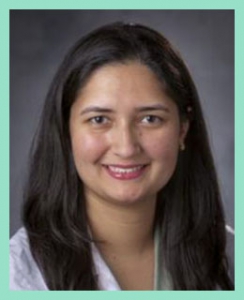 The Arshad lab largely focuses on the following areas of interest: 1. Mechanisms of bacterial pathogenesis and antimicrobial resistance. They have recently described a novel co-regulation of multi-drug resistant (MDR) efflux pumps and an important virulence factor, the E. coli polysaccharide capsule. This co-regulation is mediated by a transcription factor, MprA, which is a member of the well-known MarR family of proteins. They have shown that targeting MprA in vivo in a murine model of sepsis protects against an otherwise lethal infection. 2. Novel targets for pathogen-specific therapeutics. In the face of a rapidly diminishing pool of effective antimicrobials there is a dire need to investigate therapeutics with novel mechanisms of action. An important area of the Arshad lab’s research focuses on a unique small molecule, DU011, which targets the transcription factor MprA. They have previously shown DU011 to be extremely active in vitro at sub-micromolar concentrations. Furthermore, unlike previously known ligands of MprA that result in upregulation of the MDR efflux pumps, DU011 is able to effectively uncouple the co-regulation of efflux pumps and capsule expression in E. coli. This makes DU011 an attractive prototypic molecule that can render E. coli avirulent without driving antibiotic resistance. Using structure-function relationship assays they have determined that DU011 binds to MprA uniquely compared to its canonical ligands and have identified the amino acid residues that play a role in MprA-ligand interaction. 3. Perinatal transmission and gut colonization of MDR Gram negatives. The Arshad lab has recently conducted a molecular epidemiological survey of healthy infants in a community with a high incidence of community acquired infections with MDR bacteria. Almost half of the infants were found to be carriers of MDR Enterobacteriaceae of which the majority were E. coli. They have further characterized these isolates and determined that they are non-epidemic strains, most belong phylogenetic group B or D and are carriers of IncF plasmids. They have also developed an animal model of perinatal transmission to understand the transmission dynamics of these strains between mother and infants.
The Arshad lab largely focuses on the following areas of interest: 1. Mechanisms of bacterial pathogenesis and antimicrobial resistance. They have recently described a novel co-regulation of multi-drug resistant (MDR) efflux pumps and an important virulence factor, the E. coli polysaccharide capsule. This co-regulation is mediated by a transcription factor, MprA, which is a member of the well-known MarR family of proteins. They have shown that targeting MprA in vivo in a murine model of sepsis protects against an otherwise lethal infection. 2. Novel targets for pathogen-specific therapeutics. In the face of a rapidly diminishing pool of effective antimicrobials there is a dire need to investigate therapeutics with novel mechanisms of action. An important area of the Arshad lab’s research focuses on a unique small molecule, DU011, which targets the transcription factor MprA. They have previously shown DU011 to be extremely active in vitro at sub-micromolar concentrations. Furthermore, unlike previously known ligands of MprA that result in upregulation of the MDR efflux pumps, DU011 is able to effectively uncouple the co-regulation of efflux pumps and capsule expression in E. coli. This makes DU011 an attractive prototypic molecule that can render E. coli avirulent without driving antibiotic resistance. Using structure-function relationship assays they have determined that DU011 binds to MprA uniquely compared to its canonical ligands and have identified the amino acid residues that play a role in MprA-ligand interaction. 3. Perinatal transmission and gut colonization of MDR Gram negatives. The Arshad lab has recently conducted a molecular epidemiological survey of healthy infants in a community with a high incidence of community acquired infections with MDR bacteria. Almost half of the infants were found to be carriers of MDR Enterobacteriaceae of which the majority were E. coli. They have further characterized these isolates and determined that they are non-epidemic strains, most belong phylogenetic group B or D and are carriers of IncF plasmids. They have also developed an animal model of perinatal transmission to understand the transmission dynamics of these strains between mother and infants.
Isa Ashoor
 Dr. Isa Ashoor, MD is an associate professor of clinical pediatrics at LSU Health New Orleans in the division of pediatric nephrology. He joined LSU after completing his residency training in general pediatrics at the University of Florida followed by pediatric nephrology fellowship training at Harvard Medical School and Boston Children’s Hospital. During his fellowship, Dr. Ashoor worked in the Transplantation Research Center at the Brigham and Women’s Hospital where the first successful living donor kidney transplant was performed back in 1954. There, he started his translational research interest in transplant immunology and nurtured his clinical research focus on improving the care delivered to children with chronic kidney disease and kidney transplantation. Dr. Ashoor’s research has focused on identifying gaps in knowledge in the care of those children in order to develop successful screening and treatment strategies to improve their outcomes. This has included shining a spotlight on the burden of sexually transmitted infections in pediatric kidney transplant recipients, identifying providers’ knowledge regarding reproductive health counseling, and characterizing the burden of cardiovascular disease risk factor in children with glomerular disease. Currently, Dr. Ashoor is engaged in collaborative multi-center research efforts to better understand the optimal induction immunosuppression strategy for pediatric kidney transplant recipients.
Dr. Isa Ashoor, MD is an associate professor of clinical pediatrics at LSU Health New Orleans in the division of pediatric nephrology. He joined LSU after completing his residency training in general pediatrics at the University of Florida followed by pediatric nephrology fellowship training at Harvard Medical School and Boston Children’s Hospital. During his fellowship, Dr. Ashoor worked in the Transplantation Research Center at the Brigham and Women’s Hospital where the first successful living donor kidney transplant was performed back in 1954. There, he started his translational research interest in transplant immunology and nurtured his clinical research focus on improving the care delivered to children with chronic kidney disease and kidney transplantation. Dr. Ashoor’s research has focused on identifying gaps in knowledge in the care of those children in order to develop successful screening and treatment strategies to improve their outcomes. This has included shining a spotlight on the burden of sexually transmitted infections in pediatric kidney transplant recipients, identifying providers’ knowledge regarding reproductive health counseling, and characterizing the burden of cardiovascular disease risk factor in children with glomerular disease. Currently, Dr. Ashoor is engaged in collaborative multi-center research efforts to better understand the optimal induction immunosuppression strategy for pediatric kidney transplant recipients.
Sudeepta Basu
 Sudeepta Basu is a junior faculty of neonatology investigating brain development and injury in preterm infants with advanced neuroimaging techniques. His current research focuses on the role of gamma-amino butyric acid (GABA) in the developing preterm brain and its in-vivo measurement by using innovative magnetic resonance spectroscopy techniques. During his academic and clinical training in neonatology Dr. Basu has gained understanding of the clinical significance of neuroprotective interventions influencing underlying mechanisms of pathophysiology of brain development and injury. His research integrates advanced neuroimaging tools in quest of exploring mechanisms of injury and effect of neuroprotective interventions. As a pediatric resident, Dr. Basu investigated the clinical effects of antenatal magnesium sulfate administered for neuroprotection in preterm infants and developed keen interest in field of preterm brain injury. This laid the groundwork for his neonatal neuroprotection research during postdoctoral fellowship under mentorship of Dr. Jeffrey R. Kaiser at Baylor College of Medicine. Dr. Basu investigated the role of glucose homeostasis in neurodevelopmental outcomes after perinatal brain injury from hypoxic ischemic encephalopathy in term infants. The findings indicated that deranged glucose homeostasis may be a biomarker and/or contribute to brain injury, and may influence therapeutic effect of neuroprotective hypothermia. At Children’s National as a junior faculty, Dr. Basu is further exploring the effect of preterm birth and postnatal clinical events on the developing brain with advanced neuroimaging techniques under the mentorship of Dr. Catherine Limperopoulos, a world renowned neuroscientist in field of neuroimaging. His current research project involves cutting edge magnetic resonance imaging techniques to understand the microstructural and metabolic profile of the preterm brain. With his recent KL2 Career Development Award, he is using magnetic resonance spectral editing techniques for in vivo regional GABA quantification in the preterm brain to understand its relationship with various clinical factors and role in determining neurodevelopmental outcomes in premature infants. Dr. Basu’s long term research goal is to guide neuroprotective strategies based on clear understanding of the mechanisms of perinatal brain injury and repair to improve neurodevelopmental outcomes in the vulnerable infants.
Sudeepta Basu is a junior faculty of neonatology investigating brain development and injury in preterm infants with advanced neuroimaging techniques. His current research focuses on the role of gamma-amino butyric acid (GABA) in the developing preterm brain and its in-vivo measurement by using innovative magnetic resonance spectroscopy techniques. During his academic and clinical training in neonatology Dr. Basu has gained understanding of the clinical significance of neuroprotective interventions influencing underlying mechanisms of pathophysiology of brain development and injury. His research integrates advanced neuroimaging tools in quest of exploring mechanisms of injury and effect of neuroprotective interventions. As a pediatric resident, Dr. Basu investigated the clinical effects of antenatal magnesium sulfate administered for neuroprotection in preterm infants and developed keen interest in field of preterm brain injury. This laid the groundwork for his neonatal neuroprotection research during postdoctoral fellowship under mentorship of Dr. Jeffrey R. Kaiser at Baylor College of Medicine. Dr. Basu investigated the role of glucose homeostasis in neurodevelopmental outcomes after perinatal brain injury from hypoxic ischemic encephalopathy in term infants. The findings indicated that deranged glucose homeostasis may be a biomarker and/or contribute to brain injury, and may influence therapeutic effect of neuroprotective hypothermia. At Children’s National as a junior faculty, Dr. Basu is further exploring the effect of preterm birth and postnatal clinical events on the developing brain with advanced neuroimaging techniques under the mentorship of Dr. Catherine Limperopoulos, a world renowned neuroscientist in field of neuroimaging. His current research project involves cutting edge magnetic resonance imaging techniques to understand the microstructural and metabolic profile of the preterm brain. With his recent KL2 Career Development Award, he is using magnetic resonance spectral editing techniques for in vivo regional GABA quantification in the preterm brain to understand its relationship with various clinical factors and role in determining neurodevelopmental outcomes in premature infants. Dr. Basu’s long term research goal is to guide neuroprotective strategies based on clear understanding of the mechanisms of perinatal brain injury and repair to improve neurodevelopmental outcomes in the vulnerable infants.
Brian Becknell
 As a physician-scientist at Nationwide Children’s Hospital and The Ohio State University College of Medicine, Dr. Becknell aims to identify therapeutic strategies to preserve renal function in children with congenital urinary tract obstruction. The urothelial lining of the urinary tract serves classical roles in establishing the urine permeability barrier and shielding organs from invading bacteria. Recently published data from the Becknell Laboratory identify novel roles for urothelium in protecting the kidney from injury during states of infection and obstruction. During bacterial infection, urothelial antimicrobial peptide secretion limits mucosal invasion and ascending infection. During urinary tract obstruction, the renal urothelium undergoes massive reorganization, culminating in secretion of an apical, Uroplakin (Upk) plaque. Depletion of the Upk plaque from obstructed kidneys accelerates the onset of obstructive nephropathy and renal failure, attesting to a key role for the Upk plaque in limiting obstructive kidney injury. Dr. Becknell completed postdoctoral training in the laboratory of Dr. Kirk McHugh from 2010-2013, where he developed the skills needed to study the roles of urothelium during states of urinary tract obstruction and infection. In 2013, Dr. Becknell joined the faculty at the Research Institute at Nationwide Children’s Hospital as a primary investigator. His NIH-funded research continues to investigate the roles and regulation of the urothelium across the spectrum of urinary tract obstruction and infection, through mouse models, primary cell culture, and translational studies in children.
As a physician-scientist at Nationwide Children’s Hospital and The Ohio State University College of Medicine, Dr. Becknell aims to identify therapeutic strategies to preserve renal function in children with congenital urinary tract obstruction. The urothelial lining of the urinary tract serves classical roles in establishing the urine permeability barrier and shielding organs from invading bacteria. Recently published data from the Becknell Laboratory identify novel roles for urothelium in protecting the kidney from injury during states of infection and obstruction. During bacterial infection, urothelial antimicrobial peptide secretion limits mucosal invasion and ascending infection. During urinary tract obstruction, the renal urothelium undergoes massive reorganization, culminating in secretion of an apical, Uroplakin (Upk) plaque. Depletion of the Upk plaque from obstructed kidneys accelerates the onset of obstructive nephropathy and renal failure, attesting to a key role for the Upk plaque in limiting obstructive kidney injury. Dr. Becknell completed postdoctoral training in the laboratory of Dr. Kirk McHugh from 2010-2013, where he developed the skills needed to study the roles of urothelium during states of urinary tract obstruction and infection. In 2013, Dr. Becknell joined the faculty at the Research Institute at Nationwide Children’s Hospital as a primary investigator. His NIH-funded research continues to investigate the roles and regulation of the urothelium across the spectrum of urinary tract obstruction and infection, through mouse models, primary cell culture, and translational studies in children.
Jennifer Bermick
 Jennifer Bermick is a Board-certified Pediatrician and Neonatologist who is invested in studying neonatal immune system development. She has established a neonatal immunology research program at the University of Michigan from the ground up. She has built up a repository of over 450 umbilical cord blood samples from preterm and term neonates, a vulnerable and understudied patient population. She has also implemented well validated animal models of neonatal immune system development, chorioamnionitis and neonatal sepsis in the laboratory. All of this work has allowed her to study differences in inflammatory gene expression between extremely preterm, late preterm and term infants under normal conditions and after inflammatory exposures. She has also begun to explore the role of histone modifications in the development and maturation of the neonatal immune system under normal and inflammatory conditions. She has also developed expertise in performing and analyzing next generation sequencing data. As a practicing Neonatologist, she is in a unique position to translate her findings to human patients, with the ultimate goal of developing novel preventative, diagnostic, and treatment strategies to improve neonatal health and outcomes.
Jennifer Bermick is a Board-certified Pediatrician and Neonatologist who is invested in studying neonatal immune system development. She has established a neonatal immunology research program at the University of Michigan from the ground up. She has built up a repository of over 450 umbilical cord blood samples from preterm and term neonates, a vulnerable and understudied patient population. She has also implemented well validated animal models of neonatal immune system development, chorioamnionitis and neonatal sepsis in the laboratory. All of this work has allowed her to study differences in inflammatory gene expression between extremely preterm, late preterm and term infants under normal conditions and after inflammatory exposures. She has also begun to explore the role of histone modifications in the development and maturation of the neonatal immune system under normal and inflammatory conditions. She has also developed expertise in performing and analyzing next generation sequencing data. As a practicing Neonatologist, she is in a unique position to translate her findings to human patients, with the ultimate goal of developing novel preventative, diagnostic, and treatment strategies to improve neonatal health and outcomes.
Hans Bjornsson
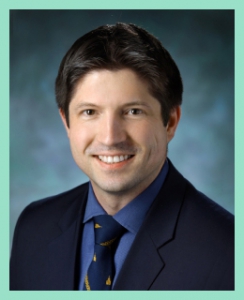 Hans Tomas Bjornsson MD PhD is currently an associate professor of genetics, pediatrics and translational medicine at Johns Hopkins University and the University of Iceland. Dr. Bjornsson received his MD from the University of Iceland (2001), and a PhD in human genetics from Johns Hopkins (2007), followed by combined clinical training in pediatrics and clinical genetics at Johns Hopkins (2012). Dr. Bjornsson joined the faculty at the McKusick- Nathans Institute of Genetic Medicine and the Department of Pediatrics in 2012, where he runs a clinic dedicated to patients with imprinting disorders and Mendelian disorders of the epigenetic machinery (Epigenetic and Chromatin Clinic). Since 2018 Dr. Bjornsson has had a joint appointment at the University of Iceland (Associate Professor of Pediatrics and Translational Medicine) and the Landspitali University Hospital (Clinical director, Clinical Genetics). Dr. Bjornsson research on a mouse model of Kabuki syndrome, a Mendelian disorder of the histone machinery, has revealed that manipulation of the epigenome may be a possible therapeutic approach for the intellectual disability seen in this disorder. Dr. Bjornsson has also recently decribed a novel genetic cause of speech apraxia, Pilarowski-Bjornsson syndrome. Dr. Bjornsson has received numerous awards for both clinical care and scientific work, including the Frank Coulson, Jr. Award for Clinical Excellence (2012), an NIH director’s Early Independence Award (2013), the Sir William Osler Young Investigator Award from the Interurban Clinical Club (2014) and the William K. Bowes Jr. Award in Medical Genetics (2014).
Hans Tomas Bjornsson MD PhD is currently an associate professor of genetics, pediatrics and translational medicine at Johns Hopkins University and the University of Iceland. Dr. Bjornsson received his MD from the University of Iceland (2001), and a PhD in human genetics from Johns Hopkins (2007), followed by combined clinical training in pediatrics and clinical genetics at Johns Hopkins (2012). Dr. Bjornsson joined the faculty at the McKusick- Nathans Institute of Genetic Medicine and the Department of Pediatrics in 2012, where he runs a clinic dedicated to patients with imprinting disorders and Mendelian disorders of the epigenetic machinery (Epigenetic and Chromatin Clinic). Since 2018 Dr. Bjornsson has had a joint appointment at the University of Iceland (Associate Professor of Pediatrics and Translational Medicine) and the Landspitali University Hospital (Clinical director, Clinical Genetics). Dr. Bjornsson research on a mouse model of Kabuki syndrome, a Mendelian disorder of the histone machinery, has revealed that manipulation of the epigenome may be a possible therapeutic approach for the intellectual disability seen in this disorder. Dr. Bjornsson has also recently decribed a novel genetic cause of speech apraxia, Pilarowski-Bjornsson syndrome. Dr. Bjornsson has received numerous awards for both clinical care and scientific work, including the Frank Coulson, Jr. Award for Clinical Excellence (2012), an NIH director’s Early Independence Award (2013), the Sir William Osler Young Investigator Award from the Interurban Clinical Club (2014) and the William K. Bowes Jr. Award in Medical Genetics (2014).
Sharyn Brown
 Dr. Sharyn Parks Brown currently serves as a senior epidemiologist in the CDC National Center for Chronic Disease Prevention and Health Promotion’s Division of Reproductive Health. Her primary responsibility entails leading the Sudden Unexpected Infant Death (SUID) and Sudden Death in the Young (SDY) Case Registry. Dr. Parks Brown is responsible for scientific oversight of the SUID and SDY Case Registry including guidance on a wide range of related, yet diverse, epidemiological and surveillance topics using Registry data. Since joining CDC, she has been providing agency and national-level leadership on SUID case identification, compilation of case level data, assurance of data timeliness and quality, analysis of data, interpretation and dissemination of results, and evaluation of associated programs. Dr. Parks Brown’s efforts have resulted in increased the surveillance capacity and data quality for 16 states and 2 jurisdictions for SUID and SDY case identification. She also led the development, implementation and evaluation of a vigorous program to train awardees on the CDC SUID Case Registry classification system. Through her work on SUID, she made significant contributions to public health practice, including leading the implementation of a robust surveillance evaluation including quarterly data reports for SUID and SDY Case Registries measuring case ascertainment, timeliness, and data completeness. Subsequently, the methodology for this surveillance evaluation system has been included in the federal funding requirements for the larger National Center for Fatality Review and Prevention’s (CFRP) National Fetal and Infant Mortality Programs. The CFRP has since replicated Dr. Parks Brown’s data quality plan for technical assistance and analysis methods for all 45 states with funding from the Health Resources and Services Administration. The data quality plan allows states to monitor and improve data quality among 1,200+ state and local Child Death Review programs leading to the dissemination of accurate data to increase understanding of child death and prevention programs. The impacts of her work include improved use of high-quality child death data in states and jurisdictions. Better quality data allows states to identify higher risk populations, monitor trends and implement data driven prevention efforts. Prior to the changes modeled after her work, poorer quality data impacted the National Fatality Review Case Reporting System, seriously limiting data utilization for analysis on infant and child deaths. These limitations are described in papers published in the American Journal of Public Health and in Injury Prevention. As a result of Dr. Parks Brown’s technical assistance and data quality improvement methodologies, it is now possible to publish more reliable analyses on infant and child deaths. She continually pushes for improved accuracy and increased breadth of death investigation information so that these deaths are fully understood, accurately tracked for trend and risk factor monitoring, and states can promote development of data driven prevention efforts. Prior to her work in CDC’s Division of Reproductive Health, Dr. Parks Brown served as a pediatric abusive head subject matter expert in CDC’s Division of Violence Prevention. During that time, she produced several groundbreaking scientific products including CDC’s recommended AHT definition for public health surveillance and research and the first estimates of the economic burden of this specific type of child maltreatment. Her work served as the basis of a successful federal-private-academic partnership which spurred at least 30 research studies. These products are the foundation for future AHT research, surveillance, and evaluation studies. Prior to Dr. Parks Brown’s assignment to the Division of Violence prevention, she was selected to serve in CDC’s Epidemiologic Intelligence Service, a two-year, applied epidemiology post-doctoral training program. During her two-year tour of duty, she was assigned to the Texas Department of State Health Services. Dr. Parks Brown’s key activities included leading investigations, disaster responses, and research studies that led to immediate health impacts for Texans. Her work helped inform disease and injury prevention during major public health emergencies, served as the basis of a successful DFPS and DSHS collaboration, and spurred funding of a new statewide survey which generated data upon which resource allocation and intervention efforts could be based.
Dr. Sharyn Parks Brown currently serves as a senior epidemiologist in the CDC National Center for Chronic Disease Prevention and Health Promotion’s Division of Reproductive Health. Her primary responsibility entails leading the Sudden Unexpected Infant Death (SUID) and Sudden Death in the Young (SDY) Case Registry. Dr. Parks Brown is responsible for scientific oversight of the SUID and SDY Case Registry including guidance on a wide range of related, yet diverse, epidemiological and surveillance topics using Registry data. Since joining CDC, she has been providing agency and national-level leadership on SUID case identification, compilation of case level data, assurance of data timeliness and quality, analysis of data, interpretation and dissemination of results, and evaluation of associated programs. Dr. Parks Brown’s efforts have resulted in increased the surveillance capacity and data quality for 16 states and 2 jurisdictions for SUID and SDY case identification. She also led the development, implementation and evaluation of a vigorous program to train awardees on the CDC SUID Case Registry classification system. Through her work on SUID, she made significant contributions to public health practice, including leading the implementation of a robust surveillance evaluation including quarterly data reports for SUID and SDY Case Registries measuring case ascertainment, timeliness, and data completeness. Subsequently, the methodology for this surveillance evaluation system has been included in the federal funding requirements for the larger National Center for Fatality Review and Prevention’s (CFRP) National Fetal and Infant Mortality Programs. The CFRP has since replicated Dr. Parks Brown’s data quality plan for technical assistance and analysis methods for all 45 states with funding from the Health Resources and Services Administration. The data quality plan allows states to monitor and improve data quality among 1,200+ state and local Child Death Review programs leading to the dissemination of accurate data to increase understanding of child death and prevention programs. The impacts of her work include improved use of high-quality child death data in states and jurisdictions. Better quality data allows states to identify higher risk populations, monitor trends and implement data driven prevention efforts. Prior to the changes modeled after her work, poorer quality data impacted the National Fatality Review Case Reporting System, seriously limiting data utilization for analysis on infant and child deaths. These limitations are described in papers published in the American Journal of Public Health and in Injury Prevention. As a result of Dr. Parks Brown’s technical assistance and data quality improvement methodologies, it is now possible to publish more reliable analyses on infant and child deaths. She continually pushes for improved accuracy and increased breadth of death investigation information so that these deaths are fully understood, accurately tracked for trend and risk factor monitoring, and states can promote development of data driven prevention efforts. Prior to her work in CDC’s Division of Reproductive Health, Dr. Parks Brown served as a pediatric abusive head subject matter expert in CDC’s Division of Violence Prevention. During that time, she produced several groundbreaking scientific products including CDC’s recommended AHT definition for public health surveillance and research and the first estimates of the economic burden of this specific type of child maltreatment. Her work served as the basis of a successful federal-private-academic partnership which spurred at least 30 research studies. These products are the foundation for future AHT research, surveillance, and evaluation studies. Prior to Dr. Parks Brown’s assignment to the Division of Violence prevention, she was selected to serve in CDC’s Epidemiologic Intelligence Service, a two-year, applied epidemiology post-doctoral training program. During her two-year tour of duty, she was assigned to the Texas Department of State Health Services. Dr. Parks Brown’s key activities included leading investigations, disaster responses, and research studies that led to immediate health impacts for Texans. Her work helped inform disease and injury prevention during major public health emergencies, served as the basis of a successful DFPS and DSHS collaboration, and spurred funding of a new statewide survey which generated data upon which resource allocation and intervention efforts could be based.
Jane Brumbaugh
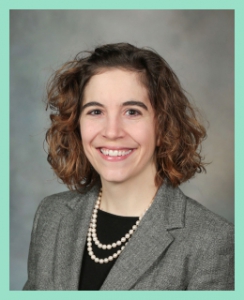 Dr. Brumbaugh is a neonatologist engaged in clinical research focused on cognition, behavior, and neuroimaging of the preterm population in childhood. She has experience using neuropsychological assessment, physical examination, and imaging modalities for the functional assessment of the developing brain in children. There is a need for research focused on the late-appearing, and historically assumed to be low severity, morbidities associated with preterm birth. Dr. Brumbaugh’s research aims to lay the groundwork to bridge the gaps between clinical medicine and public health policy by better defining the effects of prematurity on the developing brain.
Dr. Brumbaugh is a neonatologist engaged in clinical research focused on cognition, behavior, and neuroimaging of the preterm population in childhood. She has experience using neuropsychological assessment, physical examination, and imaging modalities for the functional assessment of the developing brain in children. There is a need for research focused on the late-appearing, and historically assumed to be low severity, morbidities associated with preterm birth. Dr. Brumbaugh’s research aims to lay the groundwork to bridge the gaps between clinical medicine and public health policy by better defining the effects of prematurity on the developing brain.
Brian Campfield
 Brian Campfield is an Assistant Professor of Pediatrics at the University of Pittsburgh School of Medicine, where he specializes in Pediatric Infectious Diseases. He received his B.A. from the University of Virginia and an M.D. from the University of Pittsburgh School of Medicine in 2006. He completed Pediatrics residency and Pediatric Infectious Diseases fellowship training at the Children’s Hospital of Pittsburgh in 2009 and 2012, respectively. His research centers on novel immune mechanisms regulating host defense to infection, specifically the role of Follistatin-like 1. His laboratory is supported by the NHLBI to examine novel models of inflammation and lung disease. He also maintains a clinical research program focusing on Lyme disease in children and infectious complications of immunocompromised children.
Brian Campfield is an Assistant Professor of Pediatrics at the University of Pittsburgh School of Medicine, where he specializes in Pediatric Infectious Diseases. He received his B.A. from the University of Virginia and an M.D. from the University of Pittsburgh School of Medicine in 2006. He completed Pediatrics residency and Pediatric Infectious Diseases fellowship training at the Children’s Hospital of Pittsburgh in 2009 and 2012, respectively. His research centers on novel immune mechanisms regulating host defense to infection, specifically the role of Follistatin-like 1. His laboratory is supported by the NHLBI to examine novel models of inflammation and lung disease. He also maintains a clinical research program focusing on Lyme disease in children and infectious complications of immunocompromised children.
Scott Canna
 Dr. Canna has been actively pursuing the mechanisms of autoinflammatory diseases since 2005. This began with formative training in human translational autoinflammation at the National Institutes of Health (NIH), where he contributed to the pivotal discovery that blockade of the inflammasome-activated cytokine Interleukin (IL)-1beta abolishes systemic inflammation in children with mutations of the NLRP3 inflammasome. Dr. Canna’s work in this field continued throughout his Pediatric Rheumatology fellowship where he characterized a novel murine model of the systemic hyperinflammatory disorder Macrophage Activation Syndrome (MAS) that examined the balance of pro- and anti-inflammatory cytokines in a relevant in vivo system. Dr. Canna than began a fellowship as a Metzger Scholar of translational research at the NIH. He led a group that discovered that NLRC4 inflammasome hyperactivity drove both elevated IL-18 (the other inflammasome activated cytokine) and life-threatening MAS. He also demonstrated that IL-18 blockade may be a rational and feasible treatment strategy in NLRC4-MAS, supporting development of an orphan clinical trial in monogenic MAS. Dr. Canna’s training and approach have been consistently translational, beginning with (particularly genetic) observations in human autoinflammatory diseases, and then leveraging human cellular immunology and in vivo murine models to better understand mechanisms of human auto- and hyperinflammation. Since beginning his independent, NIH-funded laboratory in 2017, his group has elaborated the links between NLRC4, IL-18, and MAS: a path that has led through dysregulation of intestinal immunity. He recently published biomarker evidence linking IL-18 with MAS alongside murine mechanistic work establishing an intestinal epithelial source. Meanwhile, he has contributed to the discovery of several new autoinflammatory disorders. Since 2010, he has co-authored 13 peer-reviewed manuscripts and 11 invited review articles focused on auto- and hyperinflammation. His trainees have presented at international conferences, and moved into promising post-doc and NIH-funded MD/PhD programs. Dr. Canna was recently recognized as an outstanding junior physician-scientist by the American Society for Clinical Investigation.
Dr. Canna has been actively pursuing the mechanisms of autoinflammatory diseases since 2005. This began with formative training in human translational autoinflammation at the National Institutes of Health (NIH), where he contributed to the pivotal discovery that blockade of the inflammasome-activated cytokine Interleukin (IL)-1beta abolishes systemic inflammation in children with mutations of the NLRP3 inflammasome. Dr. Canna’s work in this field continued throughout his Pediatric Rheumatology fellowship where he characterized a novel murine model of the systemic hyperinflammatory disorder Macrophage Activation Syndrome (MAS) that examined the balance of pro- and anti-inflammatory cytokines in a relevant in vivo system. Dr. Canna than began a fellowship as a Metzger Scholar of translational research at the NIH. He led a group that discovered that NLRC4 inflammasome hyperactivity drove both elevated IL-18 (the other inflammasome activated cytokine) and life-threatening MAS. He also demonstrated that IL-18 blockade may be a rational and feasible treatment strategy in NLRC4-MAS, supporting development of an orphan clinical trial in monogenic MAS. Dr. Canna’s training and approach have been consistently translational, beginning with (particularly genetic) observations in human autoinflammatory diseases, and then leveraging human cellular immunology and in vivo murine models to better understand mechanisms of human auto- and hyperinflammation. Since beginning his independent, NIH-funded laboratory in 2017, his group has elaborated the links between NLRC4, IL-18, and MAS: a path that has led through dysregulation of intestinal immunity. He recently published biomarker evidence linking IL-18 with MAS alongside murine mechanistic work establishing an intestinal epithelial source. Meanwhile, he has contributed to the discovery of several new autoinflammatory disorders. Since 2010, he has co-authored 13 peer-reviewed manuscripts and 11 invited review articles focused on auto- and hyperinflammation. His trainees have presented at international conferences, and moved into promising post-doc and NIH-funded MD/PhD programs. Dr. Canna was recently recognized as an outstanding junior physician-scientist by the American Society for Clinical Investigation.
Lama Charafeddine
 Dr. Lama Charafeddine is an Associate Professor at the American University of Beirut, Department of Pediatrics and Adolescent Medicine in the division of Neonatology. She has been in practice for over 25 years. Dr. Charafeddine established the Developmental Care and Early Intervention Program (DCEIP) in the Neonatal Intensive Care Unit (NICU); she has received certification from the Neonatal Individualized Developmental Care Program (NIDCAP) Federation International as a NIDCAP professional. In addition, she is a consultant for WHO and UNICEF and a trainer for the Care for Child Development (CCD) that aims at promoting caregiver-child interaction to enhance early child development. Dr. Charafeddine is also the director of the Neonatal Continuity Clinic where NICU graduates are followed until the age of two years. Her research is focused on developmental care and ultra-early interventions to improve the neurodevelopmental outcome of premature infants. She is currently the lead investigator on a number of funded studies. The “Neurodevelopmental outcome of infants and children after exposure to different prenatal Vitamin D supplementation”: this is a follow up study of a randomized controlled trial where pregnant women were exposed to different doses of vitamin D during their pregnancy; the “Effect of maternal scent on nutrition and development of preterm infants”: this is a randomized controlled trial investigating the effect of exposure to maternal scent on preterm infants; and the “Noninvasive Monitoring and Diagnosis of Physiologic Disturbances in Term and Preterm Newborns Using Video Analysis Techniques”: in this study we aim to identify patterns of skin color changes through the analysis of video images using developed computer software. A number of publications have resulted from the DCEIP work: the effect of sensorimotor therapy and time to full oral feeding In preterm infants (2016); the effect of music on pain in preterm infants (2016); combination analgesia for neonatal circumcision: a randomized controlled trial (2017); the effectiveness of a targeted educational intervention in improving infant positioning in the NICU (2018) and the adaptation and validation of the Arabic version of the Parental Stressor Scale: Neonatal Intensive Care Unit (PSS-NICU) (2019).
Dr. Lama Charafeddine is an Associate Professor at the American University of Beirut, Department of Pediatrics and Adolescent Medicine in the division of Neonatology. She has been in practice for over 25 years. Dr. Charafeddine established the Developmental Care and Early Intervention Program (DCEIP) in the Neonatal Intensive Care Unit (NICU); she has received certification from the Neonatal Individualized Developmental Care Program (NIDCAP) Federation International as a NIDCAP professional. In addition, she is a consultant for WHO and UNICEF and a trainer for the Care for Child Development (CCD) that aims at promoting caregiver-child interaction to enhance early child development. Dr. Charafeddine is also the director of the Neonatal Continuity Clinic where NICU graduates are followed until the age of two years. Her research is focused on developmental care and ultra-early interventions to improve the neurodevelopmental outcome of premature infants. She is currently the lead investigator on a number of funded studies. The “Neurodevelopmental outcome of infants and children after exposure to different prenatal Vitamin D supplementation”: this is a follow up study of a randomized controlled trial where pregnant women were exposed to different doses of vitamin D during their pregnancy; the “Effect of maternal scent on nutrition and development of preterm infants”: this is a randomized controlled trial investigating the effect of exposure to maternal scent on preterm infants; and the “Noninvasive Monitoring and Diagnosis of Physiologic Disturbances in Term and Preterm Newborns Using Video Analysis Techniques”: in this study we aim to identify patterns of skin color changes through the analysis of video images using developed computer software. A number of publications have resulted from the DCEIP work: the effect of sensorimotor therapy and time to full oral feeding In preterm infants (2016); the effect of music on pain in preterm infants (2016); combination analgesia for neonatal circumcision: a randomized controlled trial (2017); the effectiveness of a targeted educational intervention in improving infant positioning in the NICU (2018) and the adaptation and validation of the Arabic version of the Parental Stressor Scale: Neonatal Intensive Care Unit (PSS-NICU) (2019).
Xiaodi Chen
 Dr. Chen received his M.D. Degree from Shanghai Medical College of Fudan University (Formerly known as Shanghai Medical University) in Shanghai, China, and Master Degree in Neurobiology and Ph.D. Degree in Human Biology from the Philipp University of Marburg, Germany. In 2010, he joined Dr. Barbara Stonestreet’s research team (Department of Pediatrics at Women & Infants’ Hospital) as a postdoc research associate. Currently, he is a senior researcher and assistant professor. He is working focused on the hypoxic-ischemic perinatal brain injury using unique fetal ovine and neonatal rat in vivo models, and primary cerebral and cerebellar neural cultures, and stem cell-derived in vitro blood-brain barrier models. As a dedicated researcher, he has worked for more than ten years in a wide range of biomedical areas, including drug discovery, pharmacology, cell signaling, molecular and cell biology, and neurobiology. He majorly specializes in the perinatal brain injury and its underlying mechanisms (e.g., neuroinflammation, blood-brain barrier breakdown, and cell death) and neuroprotective strategy development (e.g., therapeutical antibody and proteinase inhibitor).
Dr. Chen received his M.D. Degree from Shanghai Medical College of Fudan University (Formerly known as Shanghai Medical University) in Shanghai, China, and Master Degree in Neurobiology and Ph.D. Degree in Human Biology from the Philipp University of Marburg, Germany. In 2010, he joined Dr. Barbara Stonestreet’s research team (Department of Pediatrics at Women & Infants’ Hospital) as a postdoc research associate. Currently, he is a senior researcher and assistant professor. He is working focused on the hypoxic-ischemic perinatal brain injury using unique fetal ovine and neonatal rat in vivo models, and primary cerebral and cerebellar neural cultures, and stem cell-derived in vitro blood-brain barrier models. As a dedicated researcher, he has worked for more than ten years in a wide range of biomedical areas, including drug discovery, pharmacology, cell signaling, molecular and cell biology, and neurobiology. He majorly specializes in the perinatal brain injury and its underlying mechanisms (e.g., neuroinflammation, blood-brain barrier breakdown, and cell death) and neuroprotective strategy development (e.g., therapeutical antibody and proteinase inhibitor).
Erika Cheng
 Erika R. Cheng, PhD, MPA, is an epidemiologist, public health, and health services researcher for the Division of Children’s Health Services Research and the Director of the CHSR Fellowship Program in the Department of Pediatrics at the Indiana University School of Medicine. Dr. Cheng received her PhD in Population Health Sciences and her Masters in Public Affairs from the University of Wisconsin-Madison, and then completed a pediatric health services research fellowship at Harvard Medical School and the Massachusetts General Hospital for Children.
Erika R. Cheng, PhD, MPA, is an epidemiologist, public health, and health services researcher for the Division of Children’s Health Services Research and the Director of the CHSR Fellowship Program in the Department of Pediatrics at the Indiana University School of Medicine. Dr. Cheng received her PhD in Population Health Sciences and her Masters in Public Affairs from the University of Wisconsin-Madison, and then completed a pediatric health services research fellowship at Harvard Medical School and the Massachusetts General Hospital for Children.
Dr. Cheng’s research focuses on children’s health within the context of the family, with particular emphasis on social and life course determinants. She has published extensively on topics including health and health care disparities for women during the periods of pregnancy and child birth, the role of fathers to children’s health, and early life determinants of obesity in children. Her most recent work, which is funded through a NIH career development award, applies the life course approach to chronic disease prevention to improve the identification and potential treatment of infants and toddlers with high risk for obesity.
Sarita Chung
 Sarita Chung, MD is the Director of Disaster Preparedness in the Division of Emergency Medicine at Children’s Hospital Boston. Board certified in pediatrics and pediatric emergency medicine, Dr. Chung is actively involved in all aspects of pediatric emergency preparedness and response, including research, teaching, and clinical care. In terms of her research, Dr. Chung published one of the first post-9/11 articles, examining the efficacy of web-based training in bioterrorism (at a time when such websites were proliferating, without evidence of their value). Dr. Chung was the principal investigator of an Emergency Medical Services for Children Targeted Issue grant to develop a novel image based family reunification system which proved to be effective and has presented this work in national forums and peer reviewed journals. Her research has also included the effects of the H1N1 pandemic influenza on pediatric emergency departments, alternate care sites and laboratory testing as well as developing and testing educational curriculum for pediatric disaster preparedness for clinicians and public health professionals. In terms of teaching, Dr. Chung is a nationally recognized lecturer on pediatric aspects of disaster preparedness, having presented at federal sponsored workshops and national meetings on disaster topics including family reunification, mass casualty events and caring for children in disasters. She is the Co-Director of the Disaster Domain at the Emergency Medical Services for Children Innovation and Improvement Center and a member of the Disaster Preparedness Advisory Council for the American Academy of Pediatrics as well as a former member of the FEMA National Advisory Council. Dr. Chung is an Assistant Professor of Pediatrics and Emergency Medicine at Harvard Medical School. Most importantly, she and her husband, Howard, are the proud (and tired) parents of three children (ages 17, 13 and 6).
Sarita Chung, MD is the Director of Disaster Preparedness in the Division of Emergency Medicine at Children’s Hospital Boston. Board certified in pediatrics and pediatric emergency medicine, Dr. Chung is actively involved in all aspects of pediatric emergency preparedness and response, including research, teaching, and clinical care. In terms of her research, Dr. Chung published one of the first post-9/11 articles, examining the efficacy of web-based training in bioterrorism (at a time when such websites were proliferating, without evidence of their value). Dr. Chung was the principal investigator of an Emergency Medical Services for Children Targeted Issue grant to develop a novel image based family reunification system which proved to be effective and has presented this work in national forums and peer reviewed journals. Her research has also included the effects of the H1N1 pandemic influenza on pediatric emergency departments, alternate care sites and laboratory testing as well as developing and testing educational curriculum for pediatric disaster preparedness for clinicians and public health professionals. In terms of teaching, Dr. Chung is a nationally recognized lecturer on pediatric aspects of disaster preparedness, having presented at federal sponsored workshops and national meetings on disaster topics including family reunification, mass casualty events and caring for children in disasters. She is the Co-Director of the Disaster Domain at the Emergency Medical Services for Children Innovation and Improvement Center and a member of the Disaster Preparedness Advisory Council for the American Academy of Pediatrics as well as a former member of the FEMA National Advisory Council. Dr. Chung is an Assistant Professor of Pediatrics and Emergency Medicine at Harvard Medical School. Most importantly, she and her husband, Howard, are the proud (and tired) parents of three children (ages 17, 13 and 6).
Paige Church
 Dr. Church is a graduate of the University of Vermont College of Medicine. Her paediatrics training was completed at the University of Chicago, focusing on inner city medicine and complex care. She then undertook a combined fellowship in Neonatal-Perinatal Medicine and Developmental Behavioral Paediatrics at Tufts University School of Medicine in Boston.
Dr. Church is a graduate of the University of Vermont College of Medicine. Her paediatrics training was completed at the University of Chicago, focusing on inner city medicine and complex care. She then undertook a combined fellowship in Neonatal-Perinatal Medicine and Developmental Behavioral Paediatrics at Tufts University School of Medicine in Boston.
Dr. Church is currently an Assistant Professor in the Department of Paediatrics at the University of Toronto. She is on staff at Sunnybrook Health Sciences Centre as a staff neonatologist and is a consulting developmental behavioral pediatrician at Bloorview Kids Rehab. She is the director of the Neonatal Follow Up Clinic at Sunnybrook Health Sciences Centre.
Christopher Cielo
 Dr. Cielo is a pediatric pulmonologist and sleep medicine physician whose research focuses on the evaluation and management of obstructive sleep apnea syndrome (OSAS) in children, with a focus on 1) children with craniofacial abnormalities, 2) infant populations, and 3) using imaging to understand the structural contributors to OSAS. Dr. Cielo completed fellowship training in pediatric pulmonary medicine and sleep medicine under the mentorship of Dr. Carole Marcus and joined the faculty at Children’s Hospital, where he is Assistant Professor of Pediatrics. Dr. Cielo’s clinical and translational research program, supported by NIH and foundation grants, is currently exploring the mechanisms and consequences of OSAS in several populations, including infants with micrognathia and children with Beckwith-Wiedemann syndrome through the use of MRI, polysomnography, and other assessments. This multidisciplinary work includes collaboration with plastic surgery, genetics, neonatology, and others.
Dr. Cielo is a pediatric pulmonologist and sleep medicine physician whose research focuses on the evaluation and management of obstructive sleep apnea syndrome (OSAS) in children, with a focus on 1) children with craniofacial abnormalities, 2) infant populations, and 3) using imaging to understand the structural contributors to OSAS. Dr. Cielo completed fellowship training in pediatric pulmonary medicine and sleep medicine under the mentorship of Dr. Carole Marcus and joined the faculty at Children’s Hospital, where he is Assistant Professor of Pediatrics. Dr. Cielo’s clinical and translational research program, supported by NIH and foundation grants, is currently exploring the mechanisms and consequences of OSAS in several populations, including infants with micrognathia and children with Beckwith-Wiedemann syndrome through the use of MRI, polysomnography, and other assessments. This multidisciplinary work includes collaboration with plastic surgery, genetics, neonatology, and others.
Eyal Cohen
 Dr. Eyal Cohen trained in pediatrics at the Hospital for Sick Children and Children’s Hospital at Westmead in Sydney, Australia, completed an MSc in health research methodology at McMaster University in 2008. Dr. Cohen co-founded the Complex Care Program in the Division of Pediatric Medicine at The Hospital for Sick Children (SickKids) where he is Program Head of Child Health Evaluative Sciences in the SickKids Research Institute. He is an Professor of Pediatrics at the University of Toronto with cross-appointments in the Institute of Health Policy, Management and Evaluation. He is also a Scientist with the CanChild Centre for Childhood Disability Research at McMaster University.
Dr. Eyal Cohen trained in pediatrics at the Hospital for Sick Children and Children’s Hospital at Westmead in Sydney, Australia, completed an MSc in health research methodology at McMaster University in 2008. Dr. Cohen co-founded the Complex Care Program in the Division of Pediatric Medicine at The Hospital for Sick Children (SickKids) where he is Program Head of Child Health Evaluative Sciences in the SickKids Research Institute. He is an Professor of Pediatrics at the University of Toronto with cross-appointments in the Institute of Health Policy, Management and Evaluation. He is also a Scientist with the CanChild Centre for Childhood Disability Research at McMaster University.
Amélie Collins
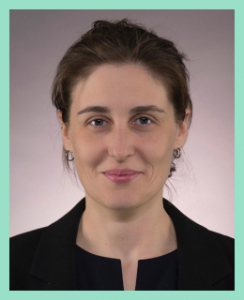 Amélie Collins, MD PhD, received her undergraduate degree from the University of Chicago in 2001, then moved to New York City to pursue her MD and PhD degrees at New York University School of Medicine. She completed her PhD in 2009 in the laboratory of Dr. Dan Littman where she focused on developmental immunology of T cells. After finishing medical school in 2011, she went to Columbia University Medical Center for Pediatrics Residency, and “fast-tracked” to Neonatology-Perinatology Fellowship. During her time as a resident and fellow, she pursued mentored research in the laboratory of Dr. Steven Reiner, where she studied the development of natural killer cells in human fetal tissue. She is now an Assistant Professor of Pediatrics and an attending physician in the Neonatal Intensive Care Unit. She is interested in understanding how global aspects of hematopoietic ontogeny unique to the fetal and neonatal periods contribute to preterm and term susceptibility to inflammation and infection. To that end, she is pursuing mentored research with Dr. Emmanuelle Passegué, focusing on investigating the role of hematopoietic stem and multipotent progenitor cells in the fetus and neonate.
Amélie Collins, MD PhD, received her undergraduate degree from the University of Chicago in 2001, then moved to New York City to pursue her MD and PhD degrees at New York University School of Medicine. She completed her PhD in 2009 in the laboratory of Dr. Dan Littman where she focused on developmental immunology of T cells. After finishing medical school in 2011, she went to Columbia University Medical Center for Pediatrics Residency, and “fast-tracked” to Neonatology-Perinatology Fellowship. During her time as a resident and fellow, she pursued mentored research in the laboratory of Dr. Steven Reiner, where she studied the development of natural killer cells in human fetal tissue. She is now an Assistant Professor of Pediatrics and an attending physician in the Neonatal Intensive Care Unit. She is interested in understanding how global aspects of hematopoietic ontogeny unique to the fetal and neonatal periods contribute to preterm and term susceptibility to inflammation and infection. To that end, she is pursuing mentored research with Dr. Emmanuelle Passegué, focusing on investigating the role of hematopoietic stem and multipotent progenitor cells in the fetus and neonate.
Thomas Connors
 Dr. Connors is an Assistant Professor of Pediatrics within the Division of Critical Care Medicine at Columbia University Medical Center in New York. In addition to his clinical work Dr. Connors conducts translational immunologic research on the adaptive immune system with a special focus on T cells. The immune system in children is known to be distinct from adults, which led Dr. Connors to focus on how the developing immune system mediates protection from pathogens while preventing immunopathology. As the adaptive immune system has the ability to confer lifelong protection to previously encountered antigens, Dr. Connors is particularly interested in the immune system response to early life events and the resultant impact on the health of children. Dr. Connors has made use of unique sampling to gain insight into local immune responses in children. Utilizing airway aspirates from children admitted to the pediatric intensive care unit due viral respiratory tract infections, he has gained new insight into the formation of T cell memory and how T cell responses mediate lung injury. His work has found an association between the accumulation of cytotoxic T cells and the development of Pediatric Acute Respiratory Distress Syndrome. Dr. Connors is currently working to further dissect the role of T cells in pediatric health and disease using a variety of methods including patient samples, organ donor tissue, and mouse models. His work is funded by a K23 award from the National Institutes of Health, the Irving Institute at Columbia University, and the Gerstner foundation. His ongoing work includes the study of localized T cell immunity in pediatric respiratory tract infections and the impact of iron deficiency on early life immune development.
Dr. Connors is an Assistant Professor of Pediatrics within the Division of Critical Care Medicine at Columbia University Medical Center in New York. In addition to his clinical work Dr. Connors conducts translational immunologic research on the adaptive immune system with a special focus on T cells. The immune system in children is known to be distinct from adults, which led Dr. Connors to focus on how the developing immune system mediates protection from pathogens while preventing immunopathology. As the adaptive immune system has the ability to confer lifelong protection to previously encountered antigens, Dr. Connors is particularly interested in the immune system response to early life events and the resultant impact on the health of children. Dr. Connors has made use of unique sampling to gain insight into local immune responses in children. Utilizing airway aspirates from children admitted to the pediatric intensive care unit due viral respiratory tract infections, he has gained new insight into the formation of T cell memory and how T cell responses mediate lung injury. His work has found an association between the accumulation of cytotoxic T cells and the development of Pediatric Acute Respiratory Distress Syndrome. Dr. Connors is currently working to further dissect the role of T cells in pediatric health and disease using a variety of methods including patient samples, organ donor tissue, and mouse models. His work is funded by a K23 award from the National Institutes of Health, the Irving Institute at Columbia University, and the Gerstner foundation. His ongoing work includes the study of localized T cell immunity in pediatric respiratory tract infections and the impact of iron deficiency on early life immune development.
Christy Cummings
 Dr. Christy L. Cummings’ research and scholarly activities focus broadly on medical ethics and humanism and their intersection with medical education in pediatrics and neonatology, as well as counseling and communication. She is passionate about research that cultivates the moral, human aspect of medicine. A graduate of Colby College, Dr. Cummings received her medical degree from the University of Rochester, and training in pediatrics, neonatology and ethics at Yale. She participated in Yale’s Interdisciplinary Center for Bioethics Program in Bioethics (2011) and completed the Fellowship Program in Medical Ethics through the Division of Medical Ethics at Harvard Medical School (2012-2013). Dr. Cummings is currently an Assistant Professor in Pediatrics at Harvard Medical School and an attending neonatologist in the Division of Newborn Medicine at Boston Children’s Hospital and Beth Israel Deaconess Medical Center. As an Ethics Associate, she is a member of the Ethics Advisory Committee at Boston Children’s Hospital, Director of Medical Ethics & Humanities for the Division of Newborn Medicine, and Associate Director of the Harvard Neonatal-Perinatal Fellowship Program. Dr. Cummings also serves on the hospital’s Institutional Review Board.
Dr. Christy L. Cummings’ research and scholarly activities focus broadly on medical ethics and humanism and their intersection with medical education in pediatrics and neonatology, as well as counseling and communication. She is passionate about research that cultivates the moral, human aspect of medicine. A graduate of Colby College, Dr. Cummings received her medical degree from the University of Rochester, and training in pediatrics, neonatology and ethics at Yale. She participated in Yale’s Interdisciplinary Center for Bioethics Program in Bioethics (2011) and completed the Fellowship Program in Medical Ethics through the Division of Medical Ethics at Harvard Medical School (2012-2013). Dr. Cummings is currently an Assistant Professor in Pediatrics at Harvard Medical School and an attending neonatologist in the Division of Newborn Medicine at Boston Children’s Hospital and Beth Israel Deaconess Medical Center. As an Ethics Associate, she is a member of the Ethics Advisory Committee at Boston Children’s Hospital, Director of Medical Ethics & Humanities for the Division of Newborn Medicine, and Associate Director of the Harvard Neonatal-Perinatal Fellowship Program. Dr. Cummings also serves on the hospital’s Institutional Review Board.
Recent work has involved the ethics of parental counseling and shared decision making in pediatric medicine. Dr. Cummings is researching the acquisition of ethical principles and knowledge during training, including interpersonal competence and professionalism, via simulation and enacted role-play. She has developed a global, freely-available on-line curriculum in Ethics and Professionalism in Neonatology through OPENPediatricsTM, and assessment tools to evaluate ethics knowledge (TEK-Neo) as well as ethical behavior and professionalism (Pedi-EPAT) in pediatric trainees. Dr. Cummings is also PI of an NICHD-funded RO1 award on optimizing prenatal counseling for families facing extremely premature delivery. Antenatal family counseling for anticipated extremely preterm deliveries remains ethically and practically challenging for maternal-fetal medicine specialists and neonatologists alike. The overall goal of her project is to improve antenatal counseling and counseling outcomes for families facing anticipated extremely preterm delivery through innovative, interdisciplinary simulation-based education for maternal fetal medicine specialists and neonatologists, using language preferred by families, and focusing on eliciting values and building partnerships through advanced communication and relational skills.
Recent work has appeared in Pediatrics, Hastings Center Report, J Perinatology, J Pediatrics, AJOB and Journal of Medical Ethics. Dr. Cummings is the mother of 4 young children, and enjoys time with her family, running, swimming, reading and playing the ‘cello.
Ian Davis
 Ian Davis is the G. Denman Hammond Professor of Childhood Cancer at the University of North Carolina. Following undergraduate studies in Biochemistry, Cell and Molecular Biology at Northwestern University, he received a PhD from University of Illinois at Chicago (with Dr. Lester Lau) and an MD from Northwestern University Medical School. He went on to pediatric residency and chief residency at Boston Children’s Hospital. He was a fellow in pediatric hematology-oncology at the Dana-Farber Cancer Insitute and Boston Children’s Hospital, engaging in postdoctoral studies in the lab of Dr. David Fisher. He joined the Departments of Pediatrics and Genetics at the University of North Carolina at Chapel Hill in 2006. Dr. Davis’ research explores chromatin biology, epigenomics and drug discovery in cancer blending experimental strategies and genome-wide computational analytics. He co-leads the Cancer Genetics Program in the Lineberger Comprehensive Cancer Center and serves as Associate Chief for the Division of Pediatric Hematology-Oncology.
Ian Davis is the G. Denman Hammond Professor of Childhood Cancer at the University of North Carolina. Following undergraduate studies in Biochemistry, Cell and Molecular Biology at Northwestern University, he received a PhD from University of Illinois at Chicago (with Dr. Lester Lau) and an MD from Northwestern University Medical School. He went on to pediatric residency and chief residency at Boston Children’s Hospital. He was a fellow in pediatric hematology-oncology at the Dana-Farber Cancer Insitute and Boston Children’s Hospital, engaging in postdoctoral studies in the lab of Dr. David Fisher. He joined the Departments of Pediatrics and Genetics at the University of North Carolina at Chapel Hill in 2006. Dr. Davis’ research explores chromatin biology, epigenomics and drug discovery in cancer blending experimental strategies and genome-wide computational analytics. He co-leads the Cancer Genetics Program in the Lineberger Comprehensive Cancer Center and serves as Associate Chief for the Division of Pediatric Hematology-Oncology.
Aliva De
 Dr. Aliva De is a Pediatric Pulmonologist, at Columbia University Irving Medical Center. Her interest in pulmonary function and pulmonary physiology stems from her days as a post-doctoral fellow when she investigated lung function patterns following cancer therapy at Children’s Hospital Los Angeles, University of Southern California. As she started working as a junior attending physician at Children’s Hospital at Montefiore, Albert Einstein College of Medicine, NY, she was inspired by the pulmonary morbidity among children with sickle cell disease (SCD), lack of understanding of the pathophysiology of the heterogenous pulmonary involvement in SCD and the absence of management guidelines. This led her on a quest for the understanding of pulmonary complications in SCD. At the Children’s Hospital at Montefiore, Albert Einstein College of Medicine, NY, Dr. De conducted preliminary investigations studying inflammatory pathways in SCD and their impact on pulmonary function. Pilot grant funding from the Clinical and Translational Scientific Award (CTSA) component of the National Center for Advancing Translational Sciences (NCATS) supported her studies. In a small sample population, her studies have indicated that sickle cell airway inflammation is a distinct clinical and immune phenotype and although patients with such pulmonary manifestations are often categorized as having asthma (as there can be overlapping clinical presentations), their immune profiles are very distinct from classic allergic asthma patients. The management of pulmonary involvement in SCD is ambiguous given the lack of understanding of the disease pathophysiology. In an international physician survey, she further demonstrated this lack of consensus and variability in evaluation and management for SCD pulmonary complications. Further, in a large retrospective database of SCD patients in the inner-city region of Bronx, NY, she noted a high pulmonary disease burden with particularly more severe disease in the Hispanic population compared to African Americans. She is interested in continued investigations of SCD inflammation in larger populations, to further characterize patterns of the immune phenotypes and correlate them to the clinical phenotypes encountered in SCD. This approach is necessary to identify specific therapeutic targets based on the etiologies of disease, to halt and prevent progression of pulmonary morbidity. Dr. De’s other research interests include studying long term pulmonary complications in survivors of cancer and post stem cell transplant patients. She is a member of the Special Interest Working of the American Thoracic Society and is involved in several activities as part of this initiative. She is also a member of the Childhood Interstitial Lung Disease Research Network, and was previously site PI for the National Registry Study at Children’s Hospital at Montefiore, Albert Einstein College of Medicine, NY. Dr. De is passionate and motivated to continue her research in the field of pulmonary disorders and effects of other chronic conditions.
Dr. Aliva De is a Pediatric Pulmonologist, at Columbia University Irving Medical Center. Her interest in pulmonary function and pulmonary physiology stems from her days as a post-doctoral fellow when she investigated lung function patterns following cancer therapy at Children’s Hospital Los Angeles, University of Southern California. As she started working as a junior attending physician at Children’s Hospital at Montefiore, Albert Einstein College of Medicine, NY, she was inspired by the pulmonary morbidity among children with sickle cell disease (SCD), lack of understanding of the pathophysiology of the heterogenous pulmonary involvement in SCD and the absence of management guidelines. This led her on a quest for the understanding of pulmonary complications in SCD. At the Children’s Hospital at Montefiore, Albert Einstein College of Medicine, NY, Dr. De conducted preliminary investigations studying inflammatory pathways in SCD and their impact on pulmonary function. Pilot grant funding from the Clinical and Translational Scientific Award (CTSA) component of the National Center for Advancing Translational Sciences (NCATS) supported her studies. In a small sample population, her studies have indicated that sickle cell airway inflammation is a distinct clinical and immune phenotype and although patients with such pulmonary manifestations are often categorized as having asthma (as there can be overlapping clinical presentations), their immune profiles are very distinct from classic allergic asthma patients. The management of pulmonary involvement in SCD is ambiguous given the lack of understanding of the disease pathophysiology. In an international physician survey, she further demonstrated this lack of consensus and variability in evaluation and management for SCD pulmonary complications. Further, in a large retrospective database of SCD patients in the inner-city region of Bronx, NY, she noted a high pulmonary disease burden with particularly more severe disease in the Hispanic population compared to African Americans. She is interested in continued investigations of SCD inflammation in larger populations, to further characterize patterns of the immune phenotypes and correlate them to the clinical phenotypes encountered in SCD. This approach is necessary to identify specific therapeutic targets based on the etiologies of disease, to halt and prevent progression of pulmonary morbidity. Dr. De’s other research interests include studying long term pulmonary complications in survivors of cancer and post stem cell transplant patients. She is a member of the Special Interest Working of the American Thoracic Society and is involved in several activities as part of this initiative. She is also a member of the Childhood Interstitial Lung Disease Research Network, and was previously site PI for the National Registry Study at Children’s Hospital at Montefiore, Albert Einstein College of Medicine, NY. Dr. De is passionate and motivated to continue her research in the field of pulmonary disorders and effects of other chronic conditions.
Lisa DeCamp
 Dr. DeCamp is an associate professor and the University of Colorado School of Medicine and Children’s Hospital Colorado. Dr. DeCamp has research and programmatic expertise focused on increasing healthcare engagement of Spanish-speaking Latino families and reducing disparities in healthcare quality and safety for Latino patients and families with limited English proficiency. Dr. DeCamp is faculty in the Adult and Child Consortium for Health Outcomes Research and Delivery Science and the CU School of Medicine and the Latino Research and Policy Center at CU School of Public Health. Dr. DeCamp graduated from the University of Virginia with a BA in Spanish. She graduated from Duke University School of Medicine and completed a general pediatrics residency at University of North Carolina Hospitals, where she also served as a chief resident. She is an alumna of the Robert Wood Johnson Foundation Clinical Scholars Program at the University of Michigan.
Dr. DeCamp is an associate professor and the University of Colorado School of Medicine and Children’s Hospital Colorado. Dr. DeCamp has research and programmatic expertise focused on increasing healthcare engagement of Spanish-speaking Latino families and reducing disparities in healthcare quality and safety for Latino patients and families with limited English proficiency. Dr. DeCamp is faculty in the Adult and Child Consortium for Health Outcomes Research and Delivery Science and the CU School of Medicine and the Latino Research and Policy Center at CU School of Public Health. Dr. DeCamp graduated from the University of Virginia with a BA in Spanish. She graduated from Duke University School of Medicine and completed a general pediatrics residency at University of North Carolina Hospitals, where she also served as a chief resident. She is an alumna of the Robert Wood Johnson Foundation Clinical Scholars Program at the University of Michigan.
Matthew Di Guglielmo
 Dr. Di Guglielmo’s current research in pediatric patients focuses on the regulation of satiety, the early development of obesity, and the development of food intake self-regulation through the study of the gut-brain-adipose axis, circulating satiety peptides, and the gut microbiome. His doctoral work in the Waldman laboratory at TJU focused on the intestinal mucosal enzyme guanylyl cyclase C (GUCY2C), its ligands, and its regulation/signal transduction. After completing a pediatric residency, and practicing in the community for 4 years, he returned to academic work at Nemours in Delaware as the “Gastroenterology Access Pediatrician.” In this new health care delivery role, he evaluated and treated outpatients with low- to moderate-complexity gastrointestinal (GI) diseases who would typically wait weeks to see a subspecialist but with less than a 3-day wait for an appointment; this work led to manuscripts and national presentations. His work in the GI division caring for infants with feeding issues, children with constipation, and adolescents with non-alcoholic fatty liver disease (NAFLD) sparked translational research ideas: the regulation of food intake in children, the pathophysiologic role of satiety hormones – including the endogenous ligand for GUCY2C – and the gut microbiome. In published pilot studies, Dr. Di Guglielmo and his team examined the role of the uroguanylin-guanylyl cyclase C (GUCY2C) brain-to-gut pathway in adolescents with obesity. These data have generated additional questions about the development of food-intake regulation and a child’s pre-disposition to the development of obesity in the context of infant diet, gut hormones, and the brain. In addition, recent collaborative studies on adolescents with NAFLD and/or obesity have led to observations of two other novel proteins, spexin and asprosin, that are differentially expressed in children with and without obesity. These data have led to national poster presentations and are supporting an R01 application. Finally, the data and results led to additional research questions about early gut microbiome changes in infants in the context of nutrition and how the gut microbiome (and its changes) influences obesity development. Completing a Delaware CTR funded project on the infant gut microbiome led to a recent publication and securing of additional funding through the Nemours Center for Pediatric Research COBRE. This funding for collecting infant and toddler fecal samples (into the Nemours BioBank) has allowed for an expansion of the project and recent data from these samples have led to another manuscript in process. A small grant from the Wawa Foundation supported a study examining the role of uroguanylin/GUCY2C in children with autism in the summer of 2019. Dr. Di Guglielmo is research mentor or PI on two other projects regarding the microbiome, supporting past and current GI fellows in their scholarly projects on NAFLD, obesity, and constipation. As program director for the Nemours Academic General Pediatrics Fellowship, he has supported the recently graduated AGP fellow (now faculty) in two research projects both now submitted to pediatric journals, one on plagiocephaly and developmental delay, the other on care of the opioid-exposed infant. In March of 2019, he became the Division Chief of General Pediatrics at Nemours in Delaware, with one primary goal to advance the academic and scholarly productivity of the Division while continuing his own work and increasing faculty and trainee mentorship. He was recently appointed to the Nemours Institutional Review Board as a voting member.
Dr. Di Guglielmo’s current research in pediatric patients focuses on the regulation of satiety, the early development of obesity, and the development of food intake self-regulation through the study of the gut-brain-adipose axis, circulating satiety peptides, and the gut microbiome. His doctoral work in the Waldman laboratory at TJU focused on the intestinal mucosal enzyme guanylyl cyclase C (GUCY2C), its ligands, and its regulation/signal transduction. After completing a pediatric residency, and practicing in the community for 4 years, he returned to academic work at Nemours in Delaware as the “Gastroenterology Access Pediatrician.” In this new health care delivery role, he evaluated and treated outpatients with low- to moderate-complexity gastrointestinal (GI) diseases who would typically wait weeks to see a subspecialist but with less than a 3-day wait for an appointment; this work led to manuscripts and national presentations. His work in the GI division caring for infants with feeding issues, children with constipation, and adolescents with non-alcoholic fatty liver disease (NAFLD) sparked translational research ideas: the regulation of food intake in children, the pathophysiologic role of satiety hormones – including the endogenous ligand for GUCY2C – and the gut microbiome. In published pilot studies, Dr. Di Guglielmo and his team examined the role of the uroguanylin-guanylyl cyclase C (GUCY2C) brain-to-gut pathway in adolescents with obesity. These data have generated additional questions about the development of food-intake regulation and a child’s pre-disposition to the development of obesity in the context of infant diet, gut hormones, and the brain. In addition, recent collaborative studies on adolescents with NAFLD and/or obesity have led to observations of two other novel proteins, spexin and asprosin, that are differentially expressed in children with and without obesity. These data have led to national poster presentations and are supporting an R01 application. Finally, the data and results led to additional research questions about early gut microbiome changes in infants in the context of nutrition and how the gut microbiome (and its changes) influences obesity development. Completing a Delaware CTR funded project on the infant gut microbiome led to a recent publication and securing of additional funding through the Nemours Center for Pediatric Research COBRE. This funding for collecting infant and toddler fecal samples (into the Nemours BioBank) has allowed for an expansion of the project and recent data from these samples have led to another manuscript in process. A small grant from the Wawa Foundation supported a study examining the role of uroguanylin/GUCY2C in children with autism in the summer of 2019. Dr. Di Guglielmo is research mentor or PI on two other projects regarding the microbiome, supporting past and current GI fellows in their scholarly projects on NAFLD, obesity, and constipation. As program director for the Nemours Academic General Pediatrics Fellowship, he has supported the recently graduated AGP fellow (now faculty) in two research projects both now submitted to pediatric journals, one on plagiocephaly and developmental delay, the other on care of the opioid-exposed infant. In March of 2019, he became the Division Chief of General Pediatrics at Nemours in Delaware, with one primary goal to advance the academic and scholarly productivity of the Division while continuing his own work and increasing faculty and trainee mentorship. He was recently appointed to the Nemours Institutional Review Board as a voting member.
Nicolino Valerio Dorrello
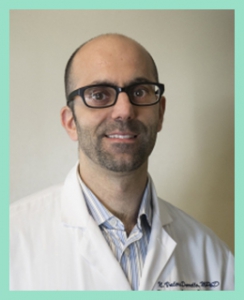
Dr. Nicolino Valerio Dorrello is an Assistant Professor in the Division of Pediatric Critical Care Medicine, Department of Pediatrics, Columbia University Vagelos College of Physicians and Surgeons since 2015. He obtained his MD from University of Naples (Italy) in 2000 and his PhD in Molecular Oncology at New York University in 2004, focusing on the role of ubiquitin mediated proteolysis in cell cycle regulation. He then completed a residency in Pediatrics at the University of Padua (Italy) in 2010 and a subsequent pediatric residency at Columbia University before staying for his Fellowship in Pediatric Critical Care Medicine and then as faculty. Dr. Dorrello is double board certified in Pediatrics and Pediatric Critical Care in Unites States and in Pediatrics in Europe. In his clinical duties in the pediatric critical care unit, one of the most devastating and common injuries he comes across, unfortunately, is severe, progressive lung injury. What represents a daily clinical challenge – making these patients better – has become his research passion. He has recently succeeded in developing an airway-specific method to efficiently remove only the lung epithelium (de-epithelialization) while preserving lung vasculature and architecture in an ex vivo rodent model. This new functional, vascularized lung graft then enabled the attachment and engraftment of lung epithelial progenitors. Dr. Dorrello’s laboratory is focused on elucidating the optimal strategies to selectively remove defective lung epithelial cells and support the proliferation and differentiation of lung progenitors towards healthy epithelium and ultimately lung repair. Dr. Dorrello has published in international peer -reviewed journals of highest reputation, such as Science, Nature, Molecular Cell, PNAS, and Science Advances.
Sarah Dumas
 Dr. Dumas is an Assistant Professor of Clinical Pediatrics at Louisiana State University Health Sciences Center in New Orleans (LSUHSC-NO). She completed residency training in Pediatrics at the Warren Alpert Medical School of Brown University/Hasbro Children’s Hospital. She then completed a General Academic Pediatric Fellowship at UPMC Children’s Hospital of Pittsburgh, where she received a Master of Science in Clinical Research from the University of Pittsburgh. Upon joining faculty at LSUHSC-NO, she embarked on research aimed to understand and address disparities in adolescent pregnancy and parenting experienced by Louisiana teens. A Community Access to Child Health grant from the American Academy of Pediatrics allowed her to explore the landscape of teen parenting in New Orleans, which informed development of a program to provide clinical services for adolescent parents and their children. Dr. Dumas then received funding from the Louisiana Clinical and Translational Science Center to explore pregnancy risk factors and contraceptive use among Louisiana Medicaid-enrolled adolescents. This work facilitated a partnership with the Louisiana Department of Health and gave her access to Medicaid administrative data. This project also allowed Dr. Dumas to establish cross-institutional, school, and departmental research collaborations with other investigators. ln a related study, Dr. Dumas is leading a partnership with the Louisiana Chapter of the American Academy of Pediatrics to survey the state’s pediatricians about their approach to pediatric patients who become pregnant and have children. She is using the data from her projects to design interventions and policies intended to decrease Louisiana’s disproportionately high adolescent birth rate. To complement her research, Dr. Dumas strives to expand her expertise and influence in pediatric primary care and adolescent health disparities through advocacy and medical education. To this end she has held leadership roles with the Academic Pediatric Association, directs the Advocacy Rotation for pediatric residents at LSUHSC-NO, and helps lead the Reproductive Health + Advocacy Louisiana Program funded by the David and Lucile Packard Foundation.
Dr. Dumas is an Assistant Professor of Clinical Pediatrics at Louisiana State University Health Sciences Center in New Orleans (LSUHSC-NO). She completed residency training in Pediatrics at the Warren Alpert Medical School of Brown University/Hasbro Children’s Hospital. She then completed a General Academic Pediatric Fellowship at UPMC Children’s Hospital of Pittsburgh, where she received a Master of Science in Clinical Research from the University of Pittsburgh. Upon joining faculty at LSUHSC-NO, she embarked on research aimed to understand and address disparities in adolescent pregnancy and parenting experienced by Louisiana teens. A Community Access to Child Health grant from the American Academy of Pediatrics allowed her to explore the landscape of teen parenting in New Orleans, which informed development of a program to provide clinical services for adolescent parents and their children. Dr. Dumas then received funding from the Louisiana Clinical and Translational Science Center to explore pregnancy risk factors and contraceptive use among Louisiana Medicaid-enrolled adolescents. This work facilitated a partnership with the Louisiana Department of Health and gave her access to Medicaid administrative data. This project also allowed Dr. Dumas to establish cross-institutional, school, and departmental research collaborations with other investigators. ln a related study, Dr. Dumas is leading a partnership with the Louisiana Chapter of the American Academy of Pediatrics to survey the state’s pediatricians about their approach to pediatric patients who become pregnant and have children. She is using the data from her projects to design interventions and policies intended to decrease Louisiana’s disproportionately high adolescent birth rate. To complement her research, Dr. Dumas strives to expand her expertise and influence in pediatric primary care and adolescent health disparities through advocacy and medical education. To this end she has held leadership roles with the Academic Pediatric Association, directs the Advocacy Rotation for pediatric residents at LSUHSC-NO, and helps lead the Reproductive Health + Advocacy Louisiana Program funded by the David and Lucile Packard Foundation.
Dani Dumitriu
 Dani Dumitriu, MD, PhD, is a Pediatrician, Neuroscientist and Environmental Health Scientist. She joined Columbia University as an Assistant Professor of Pediatrics (in Psychiatry) in November 2018. She dedicates 80% time to basic science research into the neurobiological basis of resilience at the New York State Psychiatric Institute and 20% time to caring for newborns in the Well-Baby Nursery. Dr. Dumitriu completed all her training at the Icahn School of Medicine at Mount Sinai. Following graduation from the MD/PhD program and match into the Pediatrics residency, she successfully negotiated a custom-tailored individualized residency program with significant protected research time. This allowed her to maintain an active research commitment, while completing a residency in General Pediatrics and a fellowship in Pediatric Environmental Health over a five-year period. This ambitious and unconventional path was born out of a desire to escape the growing physician-scientist “leaky pipeline,” which has resulted in fewer and fewer MD/PhD graduates returning to bench science following prolonged clinical focus during residency. Taking full advantage of the flexibility of this custom program, Dr. Dumitriu began building her research program and was awarded an R01 from NIMH while still in clinical training. In addition to her busy research and clinical schedules, Dr. Dumitriu is passionate about developing innovative avenues for the retention of physician-scientists in basic research. In the lab, Dr. Dumitriu conducts NIH-funded research on the functional and structural connectivity patterns that differ in stress-susceptible versus stress-resilient mice. In collaborative work with her fellowship mentor, Dr. Manish Arora at Mount Sinai, she investigates pre- and post-natal patterns of inflammation associated with future risk of autism using naturally shed human teeth, which during development trap various compounds akin to developing tree rings. Additionally, she is currently working with an inter-disciplinary team of collaborators to spearhead an epidemiological-level study of wild rat stress and resilience in New York City.
Dani Dumitriu, MD, PhD, is a Pediatrician, Neuroscientist and Environmental Health Scientist. She joined Columbia University as an Assistant Professor of Pediatrics (in Psychiatry) in November 2018. She dedicates 80% time to basic science research into the neurobiological basis of resilience at the New York State Psychiatric Institute and 20% time to caring for newborns in the Well-Baby Nursery. Dr. Dumitriu completed all her training at the Icahn School of Medicine at Mount Sinai. Following graduation from the MD/PhD program and match into the Pediatrics residency, she successfully negotiated a custom-tailored individualized residency program with significant protected research time. This allowed her to maintain an active research commitment, while completing a residency in General Pediatrics and a fellowship in Pediatric Environmental Health over a five-year period. This ambitious and unconventional path was born out of a desire to escape the growing physician-scientist “leaky pipeline,” which has resulted in fewer and fewer MD/PhD graduates returning to bench science following prolonged clinical focus during residency. Taking full advantage of the flexibility of this custom program, Dr. Dumitriu began building her research program and was awarded an R01 from NIMH while still in clinical training. In addition to her busy research and clinical schedules, Dr. Dumitriu is passionate about developing innovative avenues for the retention of physician-scientists in basic research. In the lab, Dr. Dumitriu conducts NIH-funded research on the functional and structural connectivity patterns that differ in stress-susceptible versus stress-resilient mice. In collaborative work with her fellowship mentor, Dr. Manish Arora at Mount Sinai, she investigates pre- and post-natal patterns of inflammation associated with future risk of autism using naturally shed human teeth, which during development trap various compounds akin to developing tree rings. Additionally, she is currently working with an inter-disciplinary team of collaborators to spearhead an epidemiological-level study of wild rat stress and resilience in New York City.
Erika Edwards
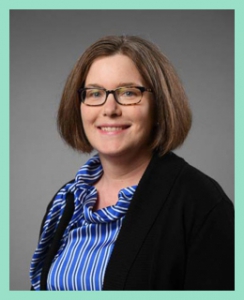 Erika Edwards, Ph.D., M.P.H. is a Research Associate Professor in the Mathematics and Statistics Department in the College of Engineering and Mathematical Sciences, University of Vermont, with a secondary appointment as a Research Associate Professor in the Department of Pediatrics at the Robert Larner School of Medicine, University of Vermont. She is funded to support Vermont Oxford Network as Director of Data Science. Her research interests include: applying data registries for epidemiologic studies of neonatal care and outcomes; evaluation of quality improvement programs; quality of care delivered to vulnerable and underserved populations; and global neonatal health. Before joining Vermont Oxford Network, her research interests focused on adolescent substance use, abuse, and prevention. Dr. Edwards received an A.B. from Colgate University in 1992, a M.P.H. in epidemiology and biostatistics from Boston University School of Public Health in 2005, and a Ph.D. in epidemiology from Boston University School of Public Health in 2011.
Erika Edwards, Ph.D., M.P.H. is a Research Associate Professor in the Mathematics and Statistics Department in the College of Engineering and Mathematical Sciences, University of Vermont, with a secondary appointment as a Research Associate Professor in the Department of Pediatrics at the Robert Larner School of Medicine, University of Vermont. She is funded to support Vermont Oxford Network as Director of Data Science. Her research interests include: applying data registries for epidemiologic studies of neonatal care and outcomes; evaluation of quality improvement programs; quality of care delivered to vulnerable and underserved populations; and global neonatal health. Before joining Vermont Oxford Network, her research interests focused on adolescent substance use, abuse, and prevention. Dr. Edwards received an A.B. from Colgate University in 1992, a M.P.H. in epidemiology and biostatistics from Boston University School of Public Health in 2005, and a Ph.D. in epidemiology from Boston University School of Public Health in 2011.
Danielle Ehret
 Danielle E. Y. Ehret, MD, MPH is an Associate Professor of Pediatrics in the Division of Neonatal-Perinatal Medicine at the University of Vermont Robert Larner College of Medicine. Dr. Ehret graduated with honors from Cornell University with a B.S. in Human Biology, Health and Society and earned her M.D. from State University of New York Upstate Medical University. She completed pediatric residency training and the pediatric global health track at Yale New Haven Children’s Hospital and Yale School of Medicine. Dr. Ehret completed her subspecialty fellowship at the Harvard Neonatal-Perinatal Medicine training program at Boston Children’s Hospital. During fellowship, Dr. Ehret earned a Master of Public Health degree at the Harvard T. H. Chan School of Public Health. Upon completion of fellowship, Dr. Ehret joined the faculty at University of Vermont and was concurrently appointed as the inaugural Director of Global Health at Vermont Oxford Network, a collaboration of health professionals at 1200 neonatal units in 34 countries worldwide. Dr. Ehret developed and implemented the Vermont Oxford Network Global Neonatal Database and serves as the principal investigator. Through partnerships with the Ethiopian Federal Ministry of Health and Ethiopian Pediatrics Society, this database is currently used in over 20 neonatal units in Ethiopia, has over 15,000 infants in the database, and serves as the foundation for research, quality improvement and advocacy efforts for the Ethiopian Neonatal Network. Dr. Ehret also serves as Chair of the American Academy of Pediatrics (AAP) Section on Neonatal Perinatal Medicine Global Health Subcommittee, member of the AAP Helping Babies Survive Planning Group, Associate Editor of Cochrane Neonatal Review Group, and was selected as the North American representative for the International Pediatric Association Child Health Emerging Leaders Program.
Danielle E. Y. Ehret, MD, MPH is an Associate Professor of Pediatrics in the Division of Neonatal-Perinatal Medicine at the University of Vermont Robert Larner College of Medicine. Dr. Ehret graduated with honors from Cornell University with a B.S. in Human Biology, Health and Society and earned her M.D. from State University of New York Upstate Medical University. She completed pediatric residency training and the pediatric global health track at Yale New Haven Children’s Hospital and Yale School of Medicine. Dr. Ehret completed her subspecialty fellowship at the Harvard Neonatal-Perinatal Medicine training program at Boston Children’s Hospital. During fellowship, Dr. Ehret earned a Master of Public Health degree at the Harvard T. H. Chan School of Public Health. Upon completion of fellowship, Dr. Ehret joined the faculty at University of Vermont and was concurrently appointed as the inaugural Director of Global Health at Vermont Oxford Network, a collaboration of health professionals at 1200 neonatal units in 34 countries worldwide. Dr. Ehret developed and implemented the Vermont Oxford Network Global Neonatal Database and serves as the principal investigator. Through partnerships with the Ethiopian Federal Ministry of Health and Ethiopian Pediatrics Society, this database is currently used in over 20 neonatal units in Ethiopia, has over 15,000 infants in the database, and serves as the foundation for research, quality improvement and advocacy efforts for the Ethiopian Neonatal Network. Dr. Ehret also serves as Chair of the American Academy of Pediatrics (AAP) Section on Neonatal Perinatal Medicine Global Health Subcommittee, member of the AAP Helping Babies Survive Planning Group, Associate Editor of Cochrane Neonatal Review Group, and was selected as the North American representative for the International Pediatric Association Child Health Emerging Leaders Program.
Osayame Ekhaguere
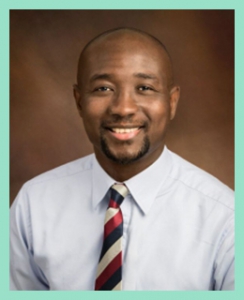
Biography not provided.
Walter Eppich
 Walter Eppich, MD, PhD is a pediatric emergency physician and Associate Professor Pediatrics and Medical Education at Northwestern University Feinberg School of Medicine, where he directs the Feinberg Academy of Medical Educators. In addition to teaching with the Center for Medical Simulation since 2010, Walter has taught extensively on basic and advanced simulation educator courses and served as an invited speaker on topics related to simulation, feedback, and debriefing around the world. In 2018 Walter completed a PhD in Medical Education from Maastricht University. His research involves qualitative methodologies, team reflexivity, healthcare debriefing, and teamwork in extreme environments. He focuses on how talk within teams influences learning and performance in both simulated and clinical workplace settings. Walter has co-authored over 60 peer-reviewed articles and book chapters. In the spring 2018, he completed a field campaign to Antarctica to study teamwork in polar research teams. He seeks to identify lessons from these environments for healthcare teams. From 2012-2014 Walter served on the Board of Directors of the Society for Simulation in Healthcare. In 2019, Walter was named an inaugural research fellow in medical education for his potential future research contributions by the committee that oversees KIPRIME (Karolinska Institute Prize in Medical Education) in Stockholm, Sweden. KIPRIME is one of the most renowned prizes in the medical education community.
Walter Eppich, MD, PhD is a pediatric emergency physician and Associate Professor Pediatrics and Medical Education at Northwestern University Feinberg School of Medicine, where he directs the Feinberg Academy of Medical Educators. In addition to teaching with the Center for Medical Simulation since 2010, Walter has taught extensively on basic and advanced simulation educator courses and served as an invited speaker on topics related to simulation, feedback, and debriefing around the world. In 2018 Walter completed a PhD in Medical Education from Maastricht University. His research involves qualitative methodologies, team reflexivity, healthcare debriefing, and teamwork in extreme environments. He focuses on how talk within teams influences learning and performance in both simulated and clinical workplace settings. Walter has co-authored over 60 peer-reviewed articles and book chapters. In the spring 2018, he completed a field campaign to Antarctica to study teamwork in polar research teams. He seeks to identify lessons from these environments for healthcare teams. From 2012-2014 Walter served on the Board of Directors of the Society for Simulation in Healthcare. In 2019, Walter was named an inaugural research fellow in medical education for his potential future research contributions by the committee that oversees KIPRIME (Karolinska Institute Prize in Medical Education) in Stockholm, Sweden. KIPRIME is one of the most renowned prizes in the medical education community.
Kanwal Farooqi
 Dr. Kanwal M. Farooqi is an attending physician in the Division of Pediatric Cardiology and Director of Cardiac 3D Printing at Columbia University Irving Medical Center. She completed pediatric and pediatric cardiology training at Children’s Hospital at Montefiore (CHAM), Albert Einstein College of Medicine. Dr. Farooqi went on to complete an advanced imaging fellowship at Kravis Children’s Hospital, Icahn School of Medicine at Mount Sinai. She was subsequently granted the Glorney Raisbeck Fellowship Award by the New York Academy of Medicine to identify the optimal cardiac MRI sequences for creating 3D printed cardiac models. Prior to joining Columbia, Dr. Farooqi was a full time faculty member at the Rutgers New Jersey Medical School for two years and led the pediatric cardiology service for the University Hospital in Newark. Dr. Farooqi’s research focuses on the use of advanced imaging technologies, including 3D printing and virtual reality, for clinical management of patients and education of patients, families and trainees. Dr. Farooqi collaborated with other leaders in the field to publish a book entitled “Rapid Prototyping in Cardiac Disease: 3D Printing the Heart.” She is the primary investigator for a multicenter study assessing the utility of 3D printed models for preoperative planning of ventricular assist device placement in patients with congenital heart disease and heart failure. She recently received a grant from the Virginia Apgar Academy of Medical Educators to study the use of virtual reality to teach trainees about echocardiography.
Dr. Kanwal M. Farooqi is an attending physician in the Division of Pediatric Cardiology and Director of Cardiac 3D Printing at Columbia University Irving Medical Center. She completed pediatric and pediatric cardiology training at Children’s Hospital at Montefiore (CHAM), Albert Einstein College of Medicine. Dr. Farooqi went on to complete an advanced imaging fellowship at Kravis Children’s Hospital, Icahn School of Medicine at Mount Sinai. She was subsequently granted the Glorney Raisbeck Fellowship Award by the New York Academy of Medicine to identify the optimal cardiac MRI sequences for creating 3D printed cardiac models. Prior to joining Columbia, Dr. Farooqi was a full time faculty member at the Rutgers New Jersey Medical School for two years and led the pediatric cardiology service for the University Hospital in Newark. Dr. Farooqi’s research focuses on the use of advanced imaging technologies, including 3D printing and virtual reality, for clinical management of patients and education of patients, families and trainees. Dr. Farooqi collaborated with other leaders in the field to publish a book entitled “Rapid Prototyping in Cardiac Disease: 3D Printing the Heart.” She is the primary investigator for a multicenter study assessing the utility of 3D printed models for preoperative planning of ventricular assist device placement in patients with congenital heart disease and heart failure. She recently received a grant from the Virginia Apgar Academy of Medical Educators to study the use of virtual reality to teach trainees about echocardiography.
Barbara Felt
 As a board-certified Developmental and Behavioral Pediatrician and clinician-researcher, Dr. Felt has been engaged in NIH-funded research continuously for 24 years, all interdisciplinary. The focus of this research has been primarily on understanding the developmental neuroscience of iron deficiency. In collaboration with others, she worked with animal models and large-scale randomized-controlled trials in four countries to examine the effects of iron deficiency and supplementation on development. Dr. Felt initiated the Developmental and Behavioral Pediatrics (DBP) Division at the University of Michigan in 2015 and continues as the first Director. In clinical work, she collaborates on multidisciplinary clinics for management of developmental/behavioral concerns related to Pediatric Sleep, Bowel and Bladder Dysfunction and Pediatric Genetics, and provides general DBP consultation in addition to facilitating the growth of other DBP programs at Michigan Medicine, including for Autism Care. Dr. Felt highly values education and led the DBP rotation for residents for many years. She established the ACGME DBP fellowship program at the University of Michigan, now one of 12 HRSA-MCHB-funded DBP fellowships in the country. She leads the Collaborative Office Rounds, a peer-education activity funded by HRSA-MCHB, development of institutional guidelines relevant to child mental and medical health concerns, and is a member of our institutional Graduate Medical Education Committee.
As a board-certified Developmental and Behavioral Pediatrician and clinician-researcher, Dr. Felt has been engaged in NIH-funded research continuously for 24 years, all interdisciplinary. The focus of this research has been primarily on understanding the developmental neuroscience of iron deficiency. In collaboration with others, she worked with animal models and large-scale randomized-controlled trials in four countries to examine the effects of iron deficiency and supplementation on development. Dr. Felt initiated the Developmental and Behavioral Pediatrics (DBP) Division at the University of Michigan in 2015 and continues as the first Director. In clinical work, she collaborates on multidisciplinary clinics for management of developmental/behavioral concerns related to Pediatric Sleep, Bowel and Bladder Dysfunction and Pediatric Genetics, and provides general DBP consultation in addition to facilitating the growth of other DBP programs at Michigan Medicine, including for Autism Care. Dr. Felt highly values education and led the DBP rotation for residents for many years. She established the ACGME DBP fellowship program at the University of Michigan, now one of 12 HRSA-MCHB-funded DBP fellowships in the country. She leads the Collaborative Office Rounds, a peer-education activity funded by HRSA-MCHB, development of institutional guidelines relevant to child mental and medical health concerns, and is a member of our institutional Graduate Medical Education Committee.
Catherine Forster

Dr. Catherine Forster is an assistant professor of pediatrics at the George Washington School of Medicine and Health Sciences and an attending physician in the Division of Hospitalist Medicine at Children’s National Health System. She completed her residency in pediatrics at Boston Children’s Hospital, and fellowships in both pediatric hospital medicine and general pediatrics research at Cincinnati Children’s Hospital Medical Center. She is a researcher in the Children’s Research Institute at Children’s National Health System, and a member of the Center for Translational Research. Dr. Forster’s research is focused on urinary tract infections (UTI) in children with neurogenic bladders, and overuse of antibiotics for UTI in this population of children. Her current work involves the use of a systems biology approach to better elucidate the difference between UTIs and asymptomatic bacterial colonization of the urinary tract. Through a combination of metagenomics and transcriptomics, she is focusing on the host-pathogen interaction in these various states to identify a way to more specifically diagnose UTIs in children with neurogenic bladders.
Meg Frizzola
 I have been interested and actively involved in several areas of research in both pediatric critical care and pediatric palliative care. The work surrounding pediatric palliative care has focused on establishing guidelines and recommendations for development of a pediatric palliative care program as well as determining relationship between the timing of a do not resuscitate order and involvement of a palliative care team. This work has evolved into the submission of an application to look further into finances, resources and care provided after a do not resuscitate order has been placed. In terms of pediatric critical care medicine research, I have predominantly focused on sepsis research as well as quality improvement work. I am currently involved in multiple IRB approved studies including the investigation of the relationship between PEWS scores, shock scores and severe sepsis episodes in a single center free standing children’s hospital. Additionally, I am currently the PI working on validating a newly created shock tool within my institution. I am leading the manuscript development for the sepsis collaborative related to the role of a shock nurse in the success of the sepsis monitoring program in my institution. In addition to the sepsis work, I have submitted two IRB proposals related to the use of sodium bicarbonate as a mucociliary clearance agent in intubated patients, as well as the relationship between compliance with a VAP bundle and significant reduction in pediatric VAPs. I have mentored many fellows on their fellowship research and have participated in the manuscript development and submission of several of them including: Risk Factors Associated with Ventilator-Associated Pneumonia (VAP) in Pediatric Traumatic Brain Injury (TBI) and Iatrogenic Withdrawal in Enteral versus Parenteral Conversions of Sedative Infusions in a Pediatric ICU. I continue to sponsor and mentor fellow projects as well as initiating my own research projects.
I have been interested and actively involved in several areas of research in both pediatric critical care and pediatric palliative care. The work surrounding pediatric palliative care has focused on establishing guidelines and recommendations for development of a pediatric palliative care program as well as determining relationship between the timing of a do not resuscitate order and involvement of a palliative care team. This work has evolved into the submission of an application to look further into finances, resources and care provided after a do not resuscitate order has been placed. In terms of pediatric critical care medicine research, I have predominantly focused on sepsis research as well as quality improvement work. I am currently involved in multiple IRB approved studies including the investigation of the relationship between PEWS scores, shock scores and severe sepsis episodes in a single center free standing children’s hospital. Additionally, I am currently the PI working on validating a newly created shock tool within my institution. I am leading the manuscript development for the sepsis collaborative related to the role of a shock nurse in the success of the sepsis monitoring program in my institution. In addition to the sepsis work, I have submitted two IRB proposals related to the use of sodium bicarbonate as a mucociliary clearance agent in intubated patients, as well as the relationship between compliance with a VAP bundle and significant reduction in pediatric VAPs. I have mentored many fellows on their fellowship research and have participated in the manuscript development and submission of several of them including: Risk Factors Associated with Ventilator-Associated Pneumonia (VAP) in Pediatric Traumatic Brain Injury (TBI) and Iatrogenic Withdrawal in Enteral versus Parenteral Conversions of Sedative Infusions in a Pediatric ICU. I continue to sponsor and mentor fellow projects as well as initiating my own research projects.
Rebecca Fry
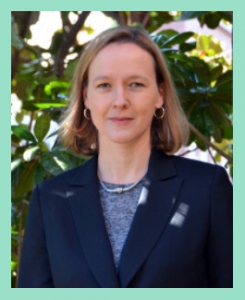 Rebecca Fry, Ph.D. is the Carol Remmer Angle Distinguished Professor in Children’s Environmental Health and Associate Chair in the Department of Environmental Sciences and Engineering at the Gillings School of Global Public Health at UNC-Chapel Hill. Dr. Fry is the founding Director of the newly launched Institute for Environmental Health Solutions (IEHS) at UNC-Chapel Hill. She is also the PI of several large NIH-funded grants including a children’s environmental health cohort funded through the Environmental Influences on Child Health Outcomes (ECHO) program, an R01 from the National Institute for Child Health Development (NICHD), and three R01s from the National Institute for Environmental Health Sciences. She is the Director of the Environmental Health Sciences training grant (T32) and Director of Graduate Studies in the Curriculum of Toxicology. Dr. Fry’s holds a Ph.D. in biology with post-doctoral training in toxicogenomics and environmental health sciences. A primary goal of Dr. Fry’s research is to increase awareness of the deleterious impacts of toxic exposures during the prenatal period with a focus on the epigenome and developmental origins of health and disease. Her group has identified epigenetic mechanisms that relate toxic substances to children’s health as well as cancer outcomes. She has served on the committee for the National Academies of Science (NAS) National Research Council for the IRIS review of inorganic arsenic, and as a reviewer for the cancer and non-cancer risk assessment of arsenic in food by the Food and Drug Administration (FDA).
Rebecca Fry, Ph.D. is the Carol Remmer Angle Distinguished Professor in Children’s Environmental Health and Associate Chair in the Department of Environmental Sciences and Engineering at the Gillings School of Global Public Health at UNC-Chapel Hill. Dr. Fry is the founding Director of the newly launched Institute for Environmental Health Solutions (IEHS) at UNC-Chapel Hill. She is also the PI of several large NIH-funded grants including a children’s environmental health cohort funded through the Environmental Influences on Child Health Outcomes (ECHO) program, an R01 from the National Institute for Child Health Development (NICHD), and three R01s from the National Institute for Environmental Health Sciences. She is the Director of the Environmental Health Sciences training grant (T32) and Director of Graduate Studies in the Curriculum of Toxicology. Dr. Fry’s holds a Ph.D. in biology with post-doctoral training in toxicogenomics and environmental health sciences. A primary goal of Dr. Fry’s research is to increase awareness of the deleterious impacts of toxic exposures during the prenatal period with a focus on the epigenome and developmental origins of health and disease. Her group has identified epigenetic mechanisms that relate toxic substances to children’s health as well as cancer outcomes. She has served on the committee for the National Academies of Science (NAS) National Research Council for the IRIS review of inorganic arsenic, and as a reviewer for the cancer and non-cancer risk assessment of arsenic in food by the Food and Drug Administration (FDA).
Sailaja Ghanta
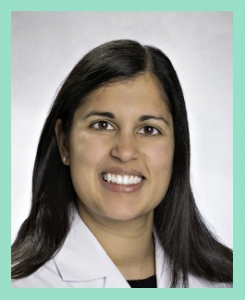 Dr. Ghanta has always had a strong interest in translational research. She graduated from an accelerated 7 year medical program via Rensselaer Polytechnic Institute/Albany Medical College. She completed her Pediatric Residency at Hasbro Children’s Hospital/Brown University and her Neonatology Fellowship at Boston Children’s Hospital/Harvard Medical School where she served as a chief fellow. Since her graduation in 2014 she has been on staff as a neonatologist at Brigham and Women’s Hospital/Harvard University. She serves as the Director of the department’s Undergraduate Summer Student Research Program. She is investigating mesenchymal stromal cells (MSCs) as a treatment for sepsis. A limitation to the clinical use of MSCs is poor viability in highly oxidative inflammatory microenvironments. MSC survival and immunomodulation can be mediated by autophagy, a process that facilitates turnover of damaged cellular components and promotes cell survival under oxidative stress. Dr. Ghanta has received NIH funding to investigate the role of autophagy in the MSC response to oxidative stress that occurs during sepsis with the goal of optimizing MSC survival and improving cell therapy for sepsis in patients. In addition to her research, Dr. Ghanta practices as a neonatologist and is an active member of the American Academy of Pediatrics (AAP) Section of Neonatal-Perinatal Medicine (SONPM). She is very involved in education at a local and national level and serves as a planning group member of the National Board Prep Course for the AAP SONPM.
Dr. Ghanta has always had a strong interest in translational research. She graduated from an accelerated 7 year medical program via Rensselaer Polytechnic Institute/Albany Medical College. She completed her Pediatric Residency at Hasbro Children’s Hospital/Brown University and her Neonatology Fellowship at Boston Children’s Hospital/Harvard Medical School where she served as a chief fellow. Since her graduation in 2014 she has been on staff as a neonatologist at Brigham and Women’s Hospital/Harvard University. She serves as the Director of the department’s Undergraduate Summer Student Research Program. She is investigating mesenchymal stromal cells (MSCs) as a treatment for sepsis. A limitation to the clinical use of MSCs is poor viability in highly oxidative inflammatory microenvironments. MSC survival and immunomodulation can be mediated by autophagy, a process that facilitates turnover of damaged cellular components and promotes cell survival under oxidative stress. Dr. Ghanta has received NIH funding to investigate the role of autophagy in the MSC response to oxidative stress that occurs during sepsis with the goal of optimizing MSC survival and improving cell therapy for sepsis in patients. In addition to her research, Dr. Ghanta practices as a neonatologist and is an active member of the American Academy of Pediatrics (AAP) Section of Neonatal-Perinatal Medicine (SONPM). She is very involved in education at a local and national level and serves as a planning group member of the National Board Prep Course for the AAP SONPM.
Regan Giesinger
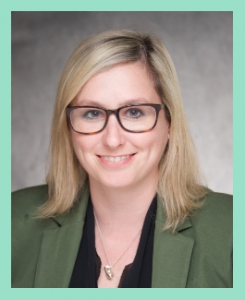
Regan Giesinger is a Clinical Assistant Professor of Pediatrics in the Division of Neonatology at the University of Iowa where she is the Director of the Neonatal Hemodynamics Clinical and Training programs. She is also Secretary of the Pan-American Hemodynamics Collaborative and member of the US Hemodynamics Collaborative. Her areas of academic focus are the hemodynamics of critically ill neonates, particularly among neonates with perinatal hypoxic ischemic insult.
Tate Gisslen

Tate Gisslen, MD is an Assistant Professor of Pediatrics in the Division of Neonatology at the University of Minnesota. Dr. Gisslen earned his MD degree and completed pediatric residency at the University of Minnesota and then completed a fellowship in neonatology and pulmonary biology at Cincinnati Children’s Hospital Medical Center. Dr. Gisslen’s research focuses on mechanisms by which neuroinflammation impairs preterm neurodevelopment. Chorioamnionitis, a maternally-derived intra-amniotic infection is the cause of at least 50% of preterm births <28 weeks and frequently results in the Fetal Inflammatory Response Syndrome (FIRS). FIRS is a severe, innate immune reaction that, for preterm infants, results in worse long-term neurodevelopmental disability compared to preterm infants without FIRS. Using a preclinical model of FIRS, Dr. Gisslen’s laboratory studies how the function of microglia, the resident immune cells of the brain, is altered and how this subsequently effects neuronal development. His research is supported by the NICHD.
[/av_toggle]
[av_toggle title='Justin Godown' tags='' av_uid='av-2p6xhh']
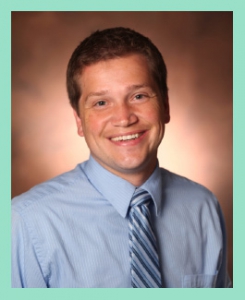
Dr. Godown is an assistant professor in the division of Pediatric Cardiology at Monroe Carell Jr. Children’s Hospital at Vanderbilt in Nashville, Tennessee. He specializes in pediatric cardiomyopathy, heart failure, cardio-oncology, and heart transplantation. Dr. Godown’s research focuses on leveraging large databases and applying novel linkage strategies to advance knowledge in congenital heart disease, pediatric heart failure, and pediatric heart transplantation. He also has an active research interest in assessing the behavioral aspects of donor selection and organ donation decision-making. Dr. Godown is actively involved in multi-center research initiatives through both the Pediatric Heart Transplant Society and the Pediatric Cardiomyopathy Registry and he serves on the Scientific Advisory Committee of the Enduring Hearts Foundation, a non-profit organization dedicated to funding pediatric heart transplantation research.
Chandrika Gowda
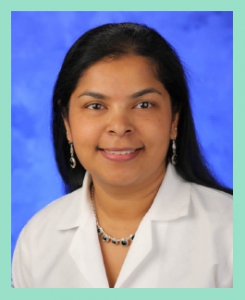 Dr. Chandrika Gowda is a board-certified hematologist/oncologist and physician scientist with strong commitment to research in childhood cancer, including leukemia and neuroblastoma. She is currently serving as Associate Professor of Pediatrics in division of hematology-oncology at Penn State Hershey Children’s Hospital and Penn State University College of Medicine. Dr. Gowda’s major research interest is to study role of Ikaros tumor suppressor and pro-oncogenic Casein Kinase II (CK2) in leukemogenesis and drug resistance. Dr. Gowda’s current work is focused on targeting CK2 for treatment of hematological malignancies (high risk AML) and neuroblastoma. Dr. Gowda’s most notable work, published in top hematology journals such as Blood and Leukemia has established a novel approach of targeting CK2 to restore epigenetic regulatory functions of Ikaros transcription factor for treatment of high-risk leukemia. She has presented her work at various national and international scientific forums and gained national recognition as an outstanding young investigator. Dr. Gowda’s research is currently supported by several extramural grants such as St. Baldrick’s scholar award, Hyundai Hope on Wheels scholar award, Rally foundation young investigator award and Penn State CTSI K12 program. She has authored several chapters and review articles related to leukemia, CK2 and Ikaros. Dr. Gowda’s other active projects are focused on development of novel drug therapies for treatment of high risk neuroblastoma.
Dr. Chandrika Gowda is a board-certified hematologist/oncologist and physician scientist with strong commitment to research in childhood cancer, including leukemia and neuroblastoma. She is currently serving as Associate Professor of Pediatrics in division of hematology-oncology at Penn State Hershey Children’s Hospital and Penn State University College of Medicine. Dr. Gowda’s major research interest is to study role of Ikaros tumor suppressor and pro-oncogenic Casein Kinase II (CK2) in leukemogenesis and drug resistance. Dr. Gowda’s current work is focused on targeting CK2 for treatment of hematological malignancies (high risk AML) and neuroblastoma. Dr. Gowda’s most notable work, published in top hematology journals such as Blood and Leukemia has established a novel approach of targeting CK2 to restore epigenetic regulatory functions of Ikaros transcription factor for treatment of high-risk leukemia. She has presented her work at various national and international scientific forums and gained national recognition as an outstanding young investigator. Dr. Gowda’s research is currently supported by several extramural grants such as St. Baldrick’s scholar award, Hyundai Hope on Wheels scholar award, Rally foundation young investigator award and Penn State CTSI K12 program. She has authored several chapters and review articles related to leukemia, CK2 and Ikaros. Dr. Gowda’s other active projects are focused on development of novel drug therapies for treatment of high risk neuroblastoma.
Kristen Glass
 Since joining the faculty at Penn State Children’s Hospital in the Division of Neonatal-Perinatal Medicine in 2009, Dr. Glass’s research focus has been on clinical and translational projects. Her first project was a pilot, randomized controlled trial investigating the feasibility of oral care with mother’s first breast milk and its effect on immune function in premature infants. She was awarded local funding for this project and also received an institutional Clinical Young Investigator Award for this work. The success of this project inspired Dr. Glass to tackle research in the technologically-advanced field of extracorporeal membrane oxygenation (ECMO). After assuming Medical Directorship of Neonatal ECMO she began collaborating with international ECMO and circulatory assist technology experts on research projects investigating and comparing ECMO circuitry equipment. These investigations were important in determining the performance and safety of various circuit components. The results of this work were presented at national and international meetings, and earned Dr. Glass a Young Investigator Award at the International Conference on Pediatric Mechanical Circulatory Support Systems and Pediatric Cardiopulmonary Perfusion in 2016. Dr. Glass has a strong interest in the education of graduate medical trainees and the use of simulation training. She is involved in several education and pediatric simulation groups and has joined national and international projects aimed at improving patient safety and the education of the next generation of physicians. Specifically, she has collaborated on research investigating tracheal intubation competency, intubation training, and boot camps in fellowship training. Since 2015 she has been a member of the NEAR4Neos collaborative, an international collaborative investigating the safety of tracheal intubation with the goal of improving procedural protocols and developing improved educational techniques to train medical trainees.
Since joining the faculty at Penn State Children’s Hospital in the Division of Neonatal-Perinatal Medicine in 2009, Dr. Glass’s research focus has been on clinical and translational projects. Her first project was a pilot, randomized controlled trial investigating the feasibility of oral care with mother’s first breast milk and its effect on immune function in premature infants. She was awarded local funding for this project and also received an institutional Clinical Young Investigator Award for this work. The success of this project inspired Dr. Glass to tackle research in the technologically-advanced field of extracorporeal membrane oxygenation (ECMO). After assuming Medical Directorship of Neonatal ECMO she began collaborating with international ECMO and circulatory assist technology experts on research projects investigating and comparing ECMO circuitry equipment. These investigations were important in determining the performance and safety of various circuit components. The results of this work were presented at national and international meetings, and earned Dr. Glass a Young Investigator Award at the International Conference on Pediatric Mechanical Circulatory Support Systems and Pediatric Cardiopulmonary Perfusion in 2016. Dr. Glass has a strong interest in the education of graduate medical trainees and the use of simulation training. She is involved in several education and pediatric simulation groups and has joined national and international projects aimed at improving patient safety and the education of the next generation of physicians. Specifically, she has collaborated on research investigating tracheal intubation competency, intubation training, and boot camps in fellowship training. Since 2015 she has been a member of the NEAR4Neos collaborative, an international collaborative investigating the safety of tracheal intubation with the goal of improving procedural protocols and developing improved educational techniques to train medical trainees.
Rachel Greenberg
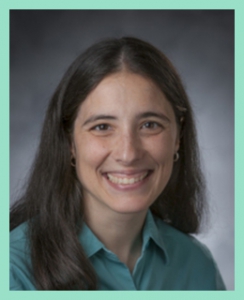 Dr. Greenberg’s primary career goals are to improve the quality and efficiency of trials in infants and to train young physicians in the conduct of clinical research. Dr. Greenberg has led 4 multiple federally funded trials. She is the coordinating center PI of a multicenter clinical trial studying the cerebrospinal fluid penetration of meropenem and tobramycin in infants (FDA, 46 sites), coordinating center and site PI of a multi-center trial to examine safety of 2-month vaccines in premature infants (CDC, 3 sites), and PI of a single site study to explore the pharmacokinetics of moxifloxacin in children (NIAID). She was PI of a completed multicenter trial conducted in the Pediatric Trials Network (PTN) that enrolled 486 infants to validate performance of a device (babyTAPE) used to estimate the weight of infants hospitalized in the neonatal intensive care unit (NIH, 3 sites). As a co-Investigator for the National Center for Advancing Translational Sciences-funded Duke-Vanderbilt Trial Innovation Center (TIC), Dr. Greenberg provides consultation and research solutions to investigators developing multicenter studies. She will also have a leadership role in the Helping to End Addiction Long-term Pain Management Effectiveness Research Network (HEAL Pain ERN). She is currently Protocol Chair of the Dexemedetomidine Opioid Sparing Effect (DOSE) study, which is a pilot study for the HEAL Pain ERN. The DOSE study is a randomized, placebo-controlled trial that will be conducted at 15 sites and is currently in the start-up phase. Over the next several years, she will use the framework of the TIC and the HEAL Pain ERN to lead outside investigators in rigorous pediatric research. Dr. Greenberg’s work as a trialist complements her experience in biostatistics and epidemiology. She earned a Masters degree in Biostatistics from Duke University. She is the lead statistician for the Perinatal Quality Collaborative of North Carolina, and her input and leadership have been critical in presentation and publication of data from statewide initiatives for infection prevention, maternal perinatal interventions, and neonatal abstinence syndrome management. She is also the Duke PI of a large repository containing data from the Pediatrix Medical Group Clinical Data Warehouse. This database contains daily granular clinical data from over >1,200,000 infants and > 22,000,000 patient-days in >300 neonatal intensive care units. With her advanced degree in biostatistics, she has been able to use these data sources to add to the body of available medical evidence and improve the care of infants. Infants are notoriously difficult to enroll in clinical trials due to logistical and ethical challenges; thus, epidemiological studies such as those she has published are often the sole source of evidence to support clinical decision-making. Dr. Greenberg has also used these studies to analyze current practices to inform the development of clinical trials. In work with the NICHD Neonatal Research Network, she has led multiple projects including a novel approach to predicting chronic lung disease in preterm infants. The results of this project will likely be used in novel clinical trial designs to stratify infants by risk of this population’s most prevalent morbidity.
Dr. Greenberg’s primary career goals are to improve the quality and efficiency of trials in infants and to train young physicians in the conduct of clinical research. Dr. Greenberg has led 4 multiple federally funded trials. She is the coordinating center PI of a multicenter clinical trial studying the cerebrospinal fluid penetration of meropenem and tobramycin in infants (FDA, 46 sites), coordinating center and site PI of a multi-center trial to examine safety of 2-month vaccines in premature infants (CDC, 3 sites), and PI of a single site study to explore the pharmacokinetics of moxifloxacin in children (NIAID). She was PI of a completed multicenter trial conducted in the Pediatric Trials Network (PTN) that enrolled 486 infants to validate performance of a device (babyTAPE) used to estimate the weight of infants hospitalized in the neonatal intensive care unit (NIH, 3 sites). As a co-Investigator for the National Center for Advancing Translational Sciences-funded Duke-Vanderbilt Trial Innovation Center (TIC), Dr. Greenberg provides consultation and research solutions to investigators developing multicenter studies. She will also have a leadership role in the Helping to End Addiction Long-term Pain Management Effectiveness Research Network (HEAL Pain ERN). She is currently Protocol Chair of the Dexemedetomidine Opioid Sparing Effect (DOSE) study, which is a pilot study for the HEAL Pain ERN. The DOSE study is a randomized, placebo-controlled trial that will be conducted at 15 sites and is currently in the start-up phase. Over the next several years, she will use the framework of the TIC and the HEAL Pain ERN to lead outside investigators in rigorous pediatric research. Dr. Greenberg’s work as a trialist complements her experience in biostatistics and epidemiology. She earned a Masters degree in Biostatistics from Duke University. She is the lead statistician for the Perinatal Quality Collaborative of North Carolina, and her input and leadership have been critical in presentation and publication of data from statewide initiatives for infection prevention, maternal perinatal interventions, and neonatal abstinence syndrome management. She is also the Duke PI of a large repository containing data from the Pediatrix Medical Group Clinical Data Warehouse. This database contains daily granular clinical data from over >1,200,000 infants and > 22,000,000 patient-days in >300 neonatal intensive care units. With her advanced degree in biostatistics, she has been able to use these data sources to add to the body of available medical evidence and improve the care of infants. Infants are notoriously difficult to enroll in clinical trials due to logistical and ethical challenges; thus, epidemiological studies such as those she has published are often the sole source of evidence to support clinical decision-making. Dr. Greenberg has also used these studies to analyze current practices to inform the development of clinical trials. In work with the NICHD Neonatal Research Network, she has led multiple projects including a novel approach to predicting chronic lung disease in preterm infants. The results of this project will likely be used in novel clinical trial designs to stratify infants by risk of this population’s most prevalent morbidity.
Justin Gregory
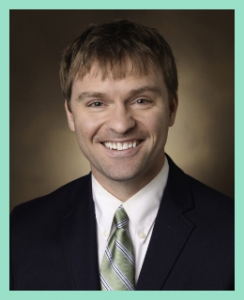 Justin Gregory, MD, MSCI, is an Assistant Professor of Pediatrics at Vanderbilt University Medical Center in Nashville, Tennessee. His research in type 1 diabetes seeks to mechanistically define the deleterious metabolic and cardiovascular effects of iatrogenic hyperinsulinemia caused by peripheral insulin delivery. He is working to translate these findings into therapeutic strategies that will restore an appropriate balance of insulin between the liver and insulin-sensitive peripheral tissues, such as hepatopreferential and oral insulin analogs and intraperitoneal insulin delivery. Ultimately, he aims to quantify the cardiovascular benefits gained when the appropriate insulin balance between hepatic and peripheral tissues is restored. Dr. Gregory’s research utilizes the conscious, catheterized canine model to manipulate metabolic and hormonal conditions in vivo. His studies in adolescents and young adults with type 1 diabetes uses a variety of research tools in vivo including the hyperinsulinemic, euglycemic clamp; flow-mediated vasodilation; percutaneous needle muscle biopsy, and contrast-enhanced ultrasound.
Justin Gregory, MD, MSCI, is an Assistant Professor of Pediatrics at Vanderbilt University Medical Center in Nashville, Tennessee. His research in type 1 diabetes seeks to mechanistically define the deleterious metabolic and cardiovascular effects of iatrogenic hyperinsulinemia caused by peripheral insulin delivery. He is working to translate these findings into therapeutic strategies that will restore an appropriate balance of insulin between the liver and insulin-sensitive peripheral tissues, such as hepatopreferential and oral insulin analogs and intraperitoneal insulin delivery. Ultimately, he aims to quantify the cardiovascular benefits gained when the appropriate insulin balance between hepatic and peripheral tissues is restored. Dr. Gregory’s research utilizes the conscious, catheterized canine model to manipulate metabolic and hormonal conditions in vivo. His studies in adolescents and young adults with type 1 diabetes uses a variety of research tools in vivo including the hyperinsulinemic, euglycemic clamp; flow-mediated vasodilation; percutaneous needle muscle biopsy, and contrast-enhanced ultrasound.
Dr. Gregory obtained his medical degree and completed pediatrics residency training at the University of Tennessee Health Sciences Center in Memphis. He then moved to Nashville for fellowship training in pediatric endocrinology, where he later joined the faculty as a member of the Ian M. Burr Division of Pediatric Endocrinology and Diabetes.
Jennifer Guimbellot
 Jennifer Guimbellot, M.D., Ph.D., is an Attending in Pulmonology at Children’s of Alabama and Assistant Professor of Pediatrics at the University of Alabama at Birmingham. She completed the Medical Scientist Training Program at the University of Alabama School of Medicine, with a Ph.D. in Genetics; her pediatric residency at the Children’s Hospital of New York-Presbyterian, Columbia University Medical Center, New York, and her pulmonary fellowship at the University of North Carolina at Chapel Hill. Dr. Guimbellot is board certified in General Pediatrics and Pediatric Pulmonology, and holds a certification in Clinical Pharmacology. She serves on the Executive Committee for the Section on Clinical Pharmacology and Therapeutics for the American Academy of Pediatrics. She was awarded an F30 pre-doctoral training grant during graduate school, Clinical Fellowship Training Awards throughout fellowship from the Cystic Fibrosis Foundation, and trained on UAB’s T32 Training Program in Lung Biology & Translational Medicine. She has held grant funding from the North Carolina Children’s Promise, Kaul Pediatric Research Institute, the Cystic Fibrosis Foundation, and the National Institutes of Health. She is currently funded through the Harry Shwachman Clinical Investigator Award to study pharmacology of CFTR modulators and their relationship to metabolism and transport proteins , pharmacogenomics of CFTR modulators, and the impact of tissue metabolism of CFTR modulators in the lung. As part of this effort, she also has developed multiple ex vivo models to study variation in patient’s own epithelial tissues including airway organoids and three-dimensional microfluidics models of the airway.
Jennifer Guimbellot, M.D., Ph.D., is an Attending in Pulmonology at Children’s of Alabama and Assistant Professor of Pediatrics at the University of Alabama at Birmingham. She completed the Medical Scientist Training Program at the University of Alabama School of Medicine, with a Ph.D. in Genetics; her pediatric residency at the Children’s Hospital of New York-Presbyterian, Columbia University Medical Center, New York, and her pulmonary fellowship at the University of North Carolina at Chapel Hill. Dr. Guimbellot is board certified in General Pediatrics and Pediatric Pulmonology, and holds a certification in Clinical Pharmacology. She serves on the Executive Committee for the Section on Clinical Pharmacology and Therapeutics for the American Academy of Pediatrics. She was awarded an F30 pre-doctoral training grant during graduate school, Clinical Fellowship Training Awards throughout fellowship from the Cystic Fibrosis Foundation, and trained on UAB’s T32 Training Program in Lung Biology & Translational Medicine. She has held grant funding from the North Carolina Children’s Promise, Kaul Pediatric Research Institute, the Cystic Fibrosis Foundation, and the National Institutes of Health. She is currently funded through the Harry Shwachman Clinical Investigator Award to study pharmacology of CFTR modulators and their relationship to metabolism and transport proteins , pharmacogenomics of CFTR modulators, and the impact of tissue metabolism of CFTR modulators in the lung. As part of this effort, she also has developed multiple ex vivo models to study variation in patient’s own epithelial tissues including airway organoids and three-dimensional microfluidics models of the airway.
Ajay Gulati

Dr. Gulati is an Associate Professor of Pediatrics at the University of North Carolina at Chapel Hill. He is the director of the UNC Multidisciplinary Pediatric IBD Center. From a research standpoint, Dr. Gulati’s laboratory is focused on understanding interactions between the commensal microbiota of the gut and the host epithelium in the context of intestinal inflammation. Specifically, he is interested in determining the mechanisms by which the intestinal microbiota regulates epithelial cell function within the gut. From a pediatric standpoint, Dr. Gulati is particularly interested on how the development age of the host affects these microbial-epithelial interactions. He is currently exploring the impact of host recipient age on gut epithelial and microbial responses to fecal microbiota transplantation. It is his hope that leveraging the relative malleability of the pediatric microbiota will pave the way for microbial modulation strategies to treat a spectrum of pediatric inflammatory disorders in a minimally-toxic manner.
William Harris
 Dr. Harris is a pediatric pulmonologist investigating mechanisms of disease modification as therapeutic opportunities in cystic fibrosis (CF). His primary basic science focus is addressing TGF-beta related disease pathobiology in pediatric lung disease. In CF, this has emphasized targeting small airway remodeling and constrictive bronchiolitis as the mechanism of irreversible airway decline. More recently, Dr. Harris has identified the role of miRNA to mediate TGF-beta suppression of CFTR expression and function. Specifically, he has discovered the potential of miR-145 inhibition to enhance CFTR-directed therapies. In addition to receiving previous Cystic Fibrosis Schwachman support, he currently receives K08 and R03 funding to pursue these studies.
Dr. Harris is a pediatric pulmonologist investigating mechanisms of disease modification as therapeutic opportunities in cystic fibrosis (CF). His primary basic science focus is addressing TGF-beta related disease pathobiology in pediatric lung disease. In CF, this has emphasized targeting small airway remodeling and constrictive bronchiolitis as the mechanism of irreversible airway decline. More recently, Dr. Harris has identified the role of miRNA to mediate TGF-beta suppression of CFTR expression and function. Specifically, he has discovered the potential of miR-145 inhibition to enhance CFTR-directed therapies. In addition to receiving previous Cystic Fibrosis Schwachman support, he currently receives K08 and R03 funding to pursue these studies.
In addition to his basic science projects, Dr. Harris has conducted clinical research to identify socioenvironmental determinants of CF health. This has included quantifying the effect of second hand smoke exposure and familial resources (e.g., financial, paternal education, and caregiver support) on CF pulmonary decline. He also has served as site PI for multiple CFTR modulator studies that have led to FDA approval for these studies in the younger age groups.
Lyndsay Harshman
 Dr. Harshman is an Assistant Professor in the Division of Pediatric Nephrology, Dialysis & Transplantation in the University of Iowa Stead Family Department of Pediatrics. She has an early track record of research success, including completion of her residency and fellowship training as part of the American Board of Pediatrics Integrated Research Pathway. While in post-graduate training and as early faculty, she has quickly established herself as an active leader both locally and nationally within the field of pediatric nephrology. She was awarded a K23 coming out of fellowship in 2016. This K23 is focused on neuroimaging and neurodevelopment across the developmental course of pediatric chronic kidney disease. Her education and training in these fields has been solidified through a Masters in Translational Biomedicine at the University of Iowa with an emphasis on neuroscience, neuroimaging, and statistics. Dr. Harshman’s lab focuses on brain growth and development in the pediatric chronic kidney disease (CKD) population. Specifically, our current work includes an NIDDK K23-funded project utilizing magnetic resonance imaging (MRI) to quantitatively characterize the structure of the brain (e.g., volumes of regions and tissues) in mild to moderate pediatric CKD. In conjunction with standardized neurocognitive testing, specialized neuroimaging measures are used to evaluate brain structure, function, and metabolism in this population, as well as to understand the relationship to underlying renal disease. Future goals are to study the potential links between “disease and development” through assessment of copy number variants expressed in both the brain and kidney from available case and control genetic data gathered during this project.
Dr. Harshman is an Assistant Professor in the Division of Pediatric Nephrology, Dialysis & Transplantation in the University of Iowa Stead Family Department of Pediatrics. She has an early track record of research success, including completion of her residency and fellowship training as part of the American Board of Pediatrics Integrated Research Pathway. While in post-graduate training and as early faculty, she has quickly established herself as an active leader both locally and nationally within the field of pediatric nephrology. She was awarded a K23 coming out of fellowship in 2016. This K23 is focused on neuroimaging and neurodevelopment across the developmental course of pediatric chronic kidney disease. Her education and training in these fields has been solidified through a Masters in Translational Biomedicine at the University of Iowa with an emphasis on neuroscience, neuroimaging, and statistics. Dr. Harshman’s lab focuses on brain growth and development in the pediatric chronic kidney disease (CKD) population. Specifically, our current work includes an NIDDK K23-funded project utilizing magnetic resonance imaging (MRI) to quantitatively characterize the structure of the brain (e.g., volumes of regions and tissues) in mild to moderate pediatric CKD. In conjunction with standardized neurocognitive testing, specialized neuroimaging measures are used to evaluate brain structure, function, and metabolism in this population, as well as to understand the relationship to underlying renal disease. Future goals are to study the potential links between “disease and development” through assessment of copy number variants expressed in both the brain and kidney from available case and control genetic data gathered during this project.
Elizabeth Harstad
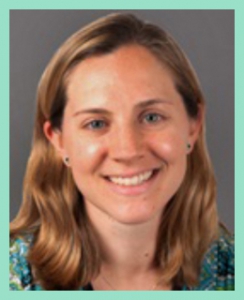 Dr. Liz Harstad is a pediatrician with specialized training in developmental behavioral pediatrics. She trained in pediatrics at Loyola University Ronald McDonald Children’s Hospital in Maywood. She completed a fellowship in developmental-behavioral pediatrics at Boston Children’s Hospital and a Masters in Public Health at the Harvard School of Public Health (concentration in Clinical Effectiveness) in August 2011. From 2011 until 2016, she was a full-time Instructor of Pediatrics in the DMC at BCH and in 2016 she was promoted to Assistant Professor of Pediatrics. She is also the Medical Director at the Cotting School in Lexington, MA, a school for children with developmental disabilities. Her achievements in the area of Clinical Expertise and Innovation are focused around autism spectrum disorder (ASD) and Attention-Deficit-Hyperactivity Disorder (ADHD). Clinically, she diagnoses and manages children and adolescents with a range of developmental needs. Her scholarly and research endeavors align closely with her clinical work and have been widely disseminated to other health care providers through publication in high impact journals and presentations at national research meetings. Within the DMC at BCH, she implemented the use of DSM-IV and DSM-5 checklists for the diagnostic criteria of ASD to promote consistency in adhering to the diagnostic criteria. Through a nationally published case report, she highlighted how the changes in diagnostic criteria for ASD impact clinical decision making. She also presented and published research findings showing that the DSM-5 ASD criteria were psychometrically robust but were more exclusive than DSM-IV-TR. With the recent funding of a 5-year prospective study, she plans to determine the rate of persistence, and functional outcomes, of kindergarten aged children who were diagnosed with DSM-5 autism spectrum disorders as toddlers. She has also led clinical change in the area of ADHD management. Her first-author manuscript of long-term growth outcomes among youth with ADHD treated with stimulant medications was the second most frequently downloaded article in Pediatrics in 2014, which highlights the broad reach of her research findings. As first author on the AAP Clinical Report on ADHD and Substance Abuse she created clinical discussion points about substance use prevention and safe stimulant prescribing practices. She is currently working with the Developmental-Behavioral Pediatrics Network (DBPNet) to document effectiveness and side effects of medications commonly used to treat preschoolers with ADHD, which is an understudied area. Her clinical innovations in ASD and ADHD have had broad national reach and she continues to pursue scholarly work in these areas.
Dr. Liz Harstad is a pediatrician with specialized training in developmental behavioral pediatrics. She trained in pediatrics at Loyola University Ronald McDonald Children’s Hospital in Maywood. She completed a fellowship in developmental-behavioral pediatrics at Boston Children’s Hospital and a Masters in Public Health at the Harvard School of Public Health (concentration in Clinical Effectiveness) in August 2011. From 2011 until 2016, she was a full-time Instructor of Pediatrics in the DMC at BCH and in 2016 she was promoted to Assistant Professor of Pediatrics. She is also the Medical Director at the Cotting School in Lexington, MA, a school for children with developmental disabilities. Her achievements in the area of Clinical Expertise and Innovation are focused around autism spectrum disorder (ASD) and Attention-Deficit-Hyperactivity Disorder (ADHD). Clinically, she diagnoses and manages children and adolescents with a range of developmental needs. Her scholarly and research endeavors align closely with her clinical work and have been widely disseminated to other health care providers through publication in high impact journals and presentations at national research meetings. Within the DMC at BCH, she implemented the use of DSM-IV and DSM-5 checklists for the diagnostic criteria of ASD to promote consistency in adhering to the diagnostic criteria. Through a nationally published case report, she highlighted how the changes in diagnostic criteria for ASD impact clinical decision making. She also presented and published research findings showing that the DSM-5 ASD criteria were psychometrically robust but were more exclusive than DSM-IV-TR. With the recent funding of a 5-year prospective study, she plans to determine the rate of persistence, and functional outcomes, of kindergarten aged children who were diagnosed with DSM-5 autism spectrum disorders as toddlers. She has also led clinical change in the area of ADHD management. Her first-author manuscript of long-term growth outcomes among youth with ADHD treated with stimulant medications was the second most frequently downloaded article in Pediatrics in 2014, which highlights the broad reach of her research findings. As first author on the AAP Clinical Report on ADHD and Substance Abuse she created clinical discussion points about substance use prevention and safe stimulant prescribing practices. She is currently working with the Developmental-Behavioral Pediatrics Network (DBPNet) to document effectiveness and side effects of medications commonly used to treat preschoolers with ADHD, which is an understudied area. Her clinical innovations in ASD and ADHD have had broad national reach and she continues to pursue scholarly work in these areas.
Leon Hatch, III
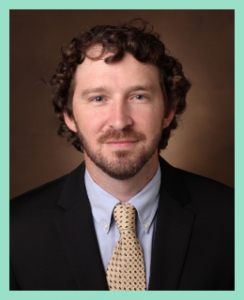 Dr. Dupree Hatch is an Assistant Professor in the Department of Pediatrics, Division of Neonatology at the Vanderbilt University Medical Center, Director of Quality Improvement and Implementation Research in the Vanderbilt Neonatal Intensive Care Unit (NICU), and a practicing neonatologist at the Monroe Carell Jr. Children’s Hospital at Vanderbilt. He is board certified in Pediatrics and Neonatal-Perinatal Medicine. Dr. Hatch completed undergraduate and medical school at the University of Florida. He completed his Pediatrics residency, Neonatal-Perinatal Medicine fellowship, and a Master of Public Health degree from the Vanderbilt University School of Medicine.
Dr. Dupree Hatch is an Assistant Professor in the Department of Pediatrics, Division of Neonatology at the Vanderbilt University Medical Center, Director of Quality Improvement and Implementation Research in the Vanderbilt Neonatal Intensive Care Unit (NICU), and a practicing neonatologist at the Monroe Carell Jr. Children’s Hospital at Vanderbilt. He is board certified in Pediatrics and Neonatal-Perinatal Medicine. Dr. Hatch completed undergraduate and medical school at the University of Florida. He completed his Pediatrics residency, Neonatal-Perinatal Medicine fellowship, and a Master of Public Health degree from the Vanderbilt University School of Medicine.
Dr. Hatch’s research focuses on improving the safety, effectiveness, and efficiency of mechanical ventilation (MV) in the NICU. His research uses methods from epidemiology, implementation science, bioinformatics, human factors engineering, and quality improvement. Recent and ongoing work has focused on the safety of endotracheal intubation in newborns, the epidemiology of MV use in the NICU, the interplay of sedation and MV in newborns, and developing novel methods to measure and decrease harmful MV in the NICU. In addition to his research, Dr. Hatch organizes and leads the quality improvement program in the Vanderbilt NICU.
Tina Ho
 Dr. Ho is an Assistant Professor of Pediatrics at the Morsani College of Medicine at University of South Florida and practices as a neonatologist at the Tampa General Hospital NICU. She received her medical degree from Nova Southeastern University and completed her Pediatric Residency at the Naval Medical Center in San Diego, CA. After practicing as a general pediatrician in the US Air Force for three years, she went back for her neonatal perinatal fellowship training at the University of South Florida. As a faculty there, her research interest is on intestinal microbiome in relation to anemia and its management in preterm infants.
Dr. Ho is an Assistant Professor of Pediatrics at the Morsani College of Medicine at University of South Florida and practices as a neonatologist at the Tampa General Hospital NICU. She received her medical degree from Nova Southeastern University and completed her Pediatric Residency at the Naval Medical Center in San Diego, CA. After practicing as a general pediatrician in the US Air Force for three years, she went back for her neonatal perinatal fellowship training at the University of South Florida. As a faculty there, her research interest is on intestinal microbiome in relation to anemia and its management in preterm infants.
Sarah Honaker
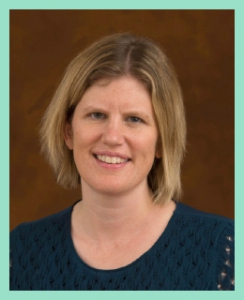 Sarah Honaker is an Assistant Professor of Pediatrics at the Indiana University School of Medicine, where she provides behavioral sleep services for children and conducts health services research. A clinical psychologist with board certification in behavioral sleep medicine, she earned her doctorate in Clinical-Community Psychology from the University of South Carolina in 2007. Dr. Honaker completed internship (2007) and post-doctoral (2008) training at the University of Louisville School of Medicine, and also served as a clinical faculty member there from 2008-13. Dr. Honaker’s research examines the development and implementation of strategies to promote evidence-based care for children’s sleep disorders. Specifically, she has examined the use of computer decision support systems in primary care to: 1) facilitate identification and treatment of obstructive sleep apnea (OSA) and infant night wakings; and 2) promote sleep health in children. Other research endeavors include strategies to engage underserved families, community-based intervention in childcare settings to identify children with OSA, and behavioral sleep intervention for young children. Her research has been funded by the American Academy of Sleep Medicine Foundation, Indiana Health, and the Indiana CTSI, and she currently holds a career development award from the CTSI to study pediatric OSA. She has more than fifteen peer-reviewed publications on pediatric sleep, co-chairs the Pediatric Behavioral Sleep Research Network, and received an Early Career Distinguished Achievement award from the Society for Behavioral Sleep Medicine.
Sarah Honaker is an Assistant Professor of Pediatrics at the Indiana University School of Medicine, where she provides behavioral sleep services for children and conducts health services research. A clinical psychologist with board certification in behavioral sleep medicine, she earned her doctorate in Clinical-Community Psychology from the University of South Carolina in 2007. Dr. Honaker completed internship (2007) and post-doctoral (2008) training at the University of Louisville School of Medicine, and also served as a clinical faculty member there from 2008-13. Dr. Honaker’s research examines the development and implementation of strategies to promote evidence-based care for children’s sleep disorders. Specifically, she has examined the use of computer decision support systems in primary care to: 1) facilitate identification and treatment of obstructive sleep apnea (OSA) and infant night wakings; and 2) promote sleep health in children. Other research endeavors include strategies to engage underserved families, community-based intervention in childcare settings to identify children with OSA, and behavioral sleep intervention for young children. Her research has been funded by the American Academy of Sleep Medicine Foundation, Indiana Health, and the Indiana CTSI, and she currently holds a career development award from the CTSI to study pediatric OSA. She has more than fifteen peer-reviewed publications on pediatric sleep, co-chairs the Pediatric Behavioral Sleep Research Network, and received an Early Career Distinguished Achievement award from the Society for Behavioral Sleep Medicine.
Leigh Howard
 Dr. Howard attended medical school at the University of Texas Southwestern Medical Center in Dallas, TX. She completed her residency in Pediatrics and fellowship in Pediatric Infectious Diseases at Vanderbilt University Medical Center. Following a Fogarty International Clinical Research Fellowship, Dr. Howard joined the faculty in Pediatric Infectious Diseases at Vanderbilt University Medical Center in 2013 as an Instructor. She was promoted to Assistant Professor in 2014. Dr. Howard’s primary research focus has been in vaccine clinical trials and observational studies to examine the epidemiology and clinical features of viral and bacterial respiratory and enteric illnesses in young children in the United States and low- and middle-income countries. Her current research focuses on understanding the role of viral infection on pneumococcal colonization dynamics and disease pathogenesis in the pneumococcal conjugate vaccine era. She is also interested in studying the development of antibiotic resistance among pneumococci and other colonizing bacteria and understanding transmission dynamics of these bacteria within households and the surrounding environment. Her work has been recognized by honors from the Vanderbilt Department of Pediatrics, the Thrasher Research Fund, and the Infectious Diseases Society of America.
Dr. Howard attended medical school at the University of Texas Southwestern Medical Center in Dallas, TX. She completed her residency in Pediatrics and fellowship in Pediatric Infectious Diseases at Vanderbilt University Medical Center. Following a Fogarty International Clinical Research Fellowship, Dr. Howard joined the faculty in Pediatric Infectious Diseases at Vanderbilt University Medical Center in 2013 as an Instructor. She was promoted to Assistant Professor in 2014. Dr. Howard’s primary research focus has been in vaccine clinical trials and observational studies to examine the epidemiology and clinical features of viral and bacterial respiratory and enteric illnesses in young children in the United States and low- and middle-income countries. Her current research focuses on understanding the role of viral infection on pneumococcal colonization dynamics and disease pathogenesis in the pneumococcal conjugate vaccine era. She is also interested in studying the development of antibiotic resistance among pneumococci and other colonizing bacteria and understanding transmission dynamics of these bacteria within households and the surrounding environment. Her work has been recognized by honors from the Vanderbilt Department of Pediatrics, the Thrasher Research Fund, and the Infectious Diseases Society of America.
Heba Ismail
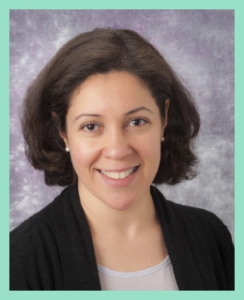 Dr. Ismail is a pediatric endocrinologist, a diabetes researcher and clinical trials specialist. Her research is focused on the pathophysiology of type 1 diabetes as well as the role of the microbiome in the development of type 1 diabetes. Dr. Ismail has several first authored publications and has secured a KL2 scholar award within the highly competitive Indiana University KL2 CTSI Young Investigator Award in Clinical-Translational Research. She has been recognized with several young investigator awards and is passionate about type 1 diabetes research and finding a cure.
Dr. Ismail is a pediatric endocrinologist, a diabetes researcher and clinical trials specialist. Her research is focused on the pathophysiology of type 1 diabetes as well as the role of the microbiome in the development of type 1 diabetes. Dr. Ismail has several first authored publications and has secured a KL2 scholar award within the highly competitive Indiana University KL2 CTSI Young Investigator Award in Clinical-Translational Research. She has been recognized with several young investigator awards and is passionate about type 1 diabetes research and finding a cure.
Christina Jacobsen
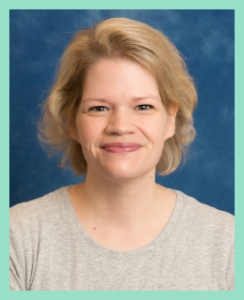 Current therapies for pediatric osteoporosis, regardless of cause, are limited to bisphosphonates. While bisphosphonates have been successful in reducing fractures in some cases, they are not effective for every patient. In addition, patients are only treated after they have already fractured. There are no therapies to prevent fractures; nor do we have any way to identify which patients at risk for osteoporosis will fracture. The long-term goal of Dr. Jacobsen’s laboratory is to better identify and treat pediatric patients at risk for osteoporosis, even before they present with fractures. To better understand the causes of pediatric osteoporosis, it is important to first understand bone growth and development. Dr. Jacobsen uses rare genetic bone disorders as a model through which to gain knowledge of the mechanisms underlying bone growth and to develop new therapeutic targets. The current genetic model used is Osteogenesis Imperfecta (OI). In the US, about 90-95% of patients with OI have dominant mutations one of the two type I collagen genes, COL1A1 or COL1A2. Patients with OI typically present with multiple fractures and can go on to develop bone deformities and significant disability over the course of their lives. The lab has previously shown that dominant mutations in the cell surface receptor low-density liproprotein receptor-related protein 5 (LRP5) increase bone mass and reduce fracture risk in mouse models of OI. Interestingly, this mutation also improves mutation collagen trafficking in osteoblasts with OI. The lab is now focused on understanding the mechanisms behind this improvement in osteoblast function. This is important for patients as a drug that targets the LRP5 pathway, Sclerostin antibody, was recently approved for the treatment of post-menopausal osteoporosis.
Current therapies for pediatric osteoporosis, regardless of cause, are limited to bisphosphonates. While bisphosphonates have been successful in reducing fractures in some cases, they are not effective for every patient. In addition, patients are only treated after they have already fractured. There are no therapies to prevent fractures; nor do we have any way to identify which patients at risk for osteoporosis will fracture. The long-term goal of Dr. Jacobsen’s laboratory is to better identify and treat pediatric patients at risk for osteoporosis, even before they present with fractures. To better understand the causes of pediatric osteoporosis, it is important to first understand bone growth and development. Dr. Jacobsen uses rare genetic bone disorders as a model through which to gain knowledge of the mechanisms underlying bone growth and to develop new therapeutic targets. The current genetic model used is Osteogenesis Imperfecta (OI). In the US, about 90-95% of patients with OI have dominant mutations one of the two type I collagen genes, COL1A1 or COL1A2. Patients with OI typically present with multiple fractures and can go on to develop bone deformities and significant disability over the course of their lives. The lab has previously shown that dominant mutations in the cell surface receptor low-density liproprotein receptor-related protein 5 (LRP5) increase bone mass and reduce fracture risk in mouse models of OI. Interestingly, this mutation also improves mutation collagen trafficking in osteoblasts with OI. The lab is now focused on understanding the mechanisms behind this improvement in osteoblast function. This is important for patients as a drug that targets the LRP5 pathway, Sclerostin antibody, was recently approved for the treatment of post-menopausal osteoporosis.
Jennifer Jao
 Dual certified in Internal Medicine and Pediatrics, Dr. Jao is an Infectious Disease specialist whose research focus is HIV maternal child health. She obtained her BA in French Literature at Tulane University and MD at the Medical College of Georgia. She went on to complete an Internal Medicine/Pediatrics residency at Rush University Medical Center in Chicago and her Infectious Disease Fellowship along with her MPH at the Icahn School of Medicine at Mount Sinai in New York. Dr. Jao has led cohorts of pregnant women living with HIV and their children both in the U.S. and Africa, and as a translational researcher, her research portfolio targets the long-term metabolic effects of in utero exposure to HIV and antiretroviral medications. Key significant scientific contributions she has made to this field include: 1) Investigation of gestational diabetes and its effects on pregnant women living with HIV in Africa and their infants 2) Identification of altered fuel utilization in HIV-exposed uninfected infants compared to HIV-unexposed uninfected infants using targeted metabolomics techniques 3) Understanding cardiometabolic risk and outcomes in HIV-exposed uninfected children as well as children living with HIV She is the Principal Investigator on NIH-funded studies in the U.S. and Africa to better understand the long-term health outcomes of HIV-exposed infants as well as pregnant women living with HIV. She serves as Co-Chair of the Pediatric HIV/AIDS Cohort Study (PHACS) Nutrition, Growth, and Metabolism Working Group and is an active member of the PHACS Scientific Leadership Group. She is a member of the U.S. Department of Health and Human Services Guidelines Committee for Recommendations for the Use of Antiretroviral Drugs in Pregnant Women with HIV Infection and Interventions to Reduce Perinatal HIV Transmission. In addition, she serves on the Cameroon Baptist Convention Health Services Internal Medicine Residency Advisory Board, where she plays an active role in medical education of Cameroonian nationals.
Dual certified in Internal Medicine and Pediatrics, Dr. Jao is an Infectious Disease specialist whose research focus is HIV maternal child health. She obtained her BA in French Literature at Tulane University and MD at the Medical College of Georgia. She went on to complete an Internal Medicine/Pediatrics residency at Rush University Medical Center in Chicago and her Infectious Disease Fellowship along with her MPH at the Icahn School of Medicine at Mount Sinai in New York. Dr. Jao has led cohorts of pregnant women living with HIV and their children both in the U.S. and Africa, and as a translational researcher, her research portfolio targets the long-term metabolic effects of in utero exposure to HIV and antiretroviral medications. Key significant scientific contributions she has made to this field include: 1) Investigation of gestational diabetes and its effects on pregnant women living with HIV in Africa and their infants 2) Identification of altered fuel utilization in HIV-exposed uninfected infants compared to HIV-unexposed uninfected infants using targeted metabolomics techniques 3) Understanding cardiometabolic risk and outcomes in HIV-exposed uninfected children as well as children living with HIV She is the Principal Investigator on NIH-funded studies in the U.S. and Africa to better understand the long-term health outcomes of HIV-exposed infants as well as pregnant women living with HIV. She serves as Co-Chair of the Pediatric HIV/AIDS Cohort Study (PHACS) Nutrition, Growth, and Metabolism Working Group and is an active member of the PHACS Scientific Leadership Group. She is a member of the U.S. Department of Health and Human Services Guidelines Committee for Recommendations for the Use of Antiretroviral Drugs in Pregnant Women with HIV Infection and Interventions to Reduce Perinatal HIV Transmission. In addition, she serves on the Cameroon Baptist Convention Health Services Internal Medicine Residency Advisory Board, where she plays an active role in medical education of Cameroonian nationals.
Ilona Jaspers
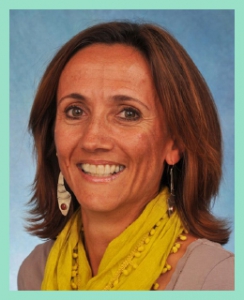 Ilona Jaspers, Ph.D., is a Professor at the University of North Carolina at Chapel Hill (UNC-CH) in the Department of Pediatrics with joint appointments in the Departments of Microbiology and Immunology as well as Environmental Sciences and Engineering. She received her undergraduate degree from Seton Hall University and her PhD in Environmental Health Sciences from New York University. Dr. Jaspers came to UNC-CH to conduct her postdoctoral studies in the Center for Environmental Medicine, Asthma and Lung Biology in 1997 and has stayed at UNC since then. She has a long-standing interest in the adverse health effects induced by exposures to inhaled toxicants. As the Deputy Director of the Center for Environmental Medicine, Asthma and Lung Biology, Dr. Jaspers collaborates extensively with investigators from UNC-CH and the U.S. Environmental Protection agency to conduct translational studies related to air pollution health effects. These studies include research on the mechanisms by which exposure to air pollutants such as ozone, wood smoke, and cigarette smoke (both mainstream and secondhand smoke exposure) modifies host defense responses. More recently, Dr. Jaspers has focused her research efforts on identifying adverse health effects induced by vaping e-cigarettes, especially in teenagers and young adults. She is very passionate about this emerging public health issue and has expanded her efforts to “translate” her research by directly communicating with teachers, health care providers, and even teenagers. Her group is extensively working with community engagement groups at UNC to bring the research conducted in her lab and other groups across the US directly to teenagers. Dr. Jaspers is also the Director of the Curriculum in Toxicology & Environmental Medicine, overseeing the training and mentoring of graduate students as well as postdoctoral fellows. She is passionate about training the next generation of scientists, always encouraging trainees to get involved in community outreach or public health communication and aims to help educate the public about e-cigarettes.
Ilona Jaspers, Ph.D., is a Professor at the University of North Carolina at Chapel Hill (UNC-CH) in the Department of Pediatrics with joint appointments in the Departments of Microbiology and Immunology as well as Environmental Sciences and Engineering. She received her undergraduate degree from Seton Hall University and her PhD in Environmental Health Sciences from New York University. Dr. Jaspers came to UNC-CH to conduct her postdoctoral studies in the Center for Environmental Medicine, Asthma and Lung Biology in 1997 and has stayed at UNC since then. She has a long-standing interest in the adverse health effects induced by exposures to inhaled toxicants. As the Deputy Director of the Center for Environmental Medicine, Asthma and Lung Biology, Dr. Jaspers collaborates extensively with investigators from UNC-CH and the U.S. Environmental Protection agency to conduct translational studies related to air pollution health effects. These studies include research on the mechanisms by which exposure to air pollutants such as ozone, wood smoke, and cigarette smoke (both mainstream and secondhand smoke exposure) modifies host defense responses. More recently, Dr. Jaspers has focused her research efforts on identifying adverse health effects induced by vaping e-cigarettes, especially in teenagers and young adults. She is very passionate about this emerging public health issue and has expanded her efforts to “translate” her research by directly communicating with teachers, health care providers, and even teenagers. Her group is extensively working with community engagement groups at UNC to bring the research conducted in her lab and other groups across the US directly to teenagers. Dr. Jaspers is also the Director of the Curriculum in Toxicology & Environmental Medicine, overseeing the training and mentoring of graduate students as well as postdoctoral fellows. She is passionate about training the next generation of scientists, always encouraging trainees to get involved in community outreach or public health communication and aims to help educate the public about e-cigarettes.
Youn Hee Jee

 Dr. Jee graduated from Dankook University and completed her pediatric residency at the Dankook University Hospital. Then, she completed her second pediatric residency training at the State University of New York Downstate Medical Center. During her residency at the SUNY Downstate, she developed a hypothesis and designed an experiment for which she won an American Academy of Pediatrics Resident Research Award. Upon her graduation, Dr. Jee was also selected as Outstanding Resident of the Year, a distinguished testament to her ability as a scientist and physician. After her pediatric residency training, Dr. Jee moved on to the Pediatric Endocrinology Program to conduct research in childhood growth and endocrine disorders. She honed her research skills in Dr. Jeffrey Baron laboratory at the National Institutes of Health (NIH) in Bethesda MD, USA, beginning in 2011. After her draduation from her fellowship, Dr. Jee has focused on identifying new genetic causes of childhood growth and pubertal disorders using exome sequencing and SNP array. Especially, her research identified the WASH complex which recycles receptors at endosomes as a new mechanism of regulating linear growth. Dr. Jee also has been studying midkine, heparin-binding growth factor, which has been elevated in some of the subjects with pubertal disorders. Using high midkine approach, she identifies anchoring proteins of NMDA receptors to be involved in regulating puberty.
Dr. Jee graduated from Dankook University and completed her pediatric residency at the Dankook University Hospital. Then, she completed her second pediatric residency training at the State University of New York Downstate Medical Center. During her residency at the SUNY Downstate, she developed a hypothesis and designed an experiment for which she won an American Academy of Pediatrics Resident Research Award. Upon her graduation, Dr. Jee was also selected as Outstanding Resident of the Year, a distinguished testament to her ability as a scientist and physician. After her pediatric residency training, Dr. Jee moved on to the Pediatric Endocrinology Program to conduct research in childhood growth and endocrine disorders. She honed her research skills in Dr. Jeffrey Baron laboratory at the National Institutes of Health (NIH) in Bethesda MD, USA, beginning in 2011. After her draduation from her fellowship, Dr. Jee has focused on identifying new genetic causes of childhood growth and pubertal disorders using exome sequencing and SNP array. Especially, her research identified the WASH complex which recycles receptors at endosomes as a new mechanism of regulating linear growth. Dr. Jee also has been studying midkine, heparin-binding growth factor, which has been elevated in some of the subjects with pubertal disorders. Using high midkine approach, she identifies anchoring proteins of NMDA receptors to be involved in regulating puberty.
Emily Johnston
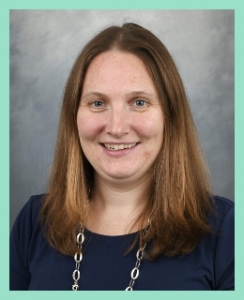 Dr. Johnston’s long-term goal is identify disparities in end-of-life care and determining quality markers for end-of-life (EOL) care for children. Indeed, defining quality metrics has been identified as a key priority in pediatric palliative care, but few investigators have targeted this work. The first steps in this mission are to: 1) recognize and determine reasons for disparities in EOL care, and, 2) clarify the perspectives and EOL needs of pediatric stakeholders. Combined, these steps will inform equitable, quality clinical care and intervention design. Dr. Johnston has followed these steps in my own career. As a pediatric oncologist, Dr. Johnston started with children with cancer before expanding to other pediatric conditions. During pediatric Hematology/Oncology fellowship, Dr. Johnston gained experience using California administrative data to study disparities in medically aggressive EOL care (e.g. hospital death, end-of-life ICU admission) among pediatric, adolescent, and young adult oncology patients. She found sociodemographic disparities in aggressiveness of EOL care – quality markers in adult oncology; however, it was unclear if those quality markers were meaningful to pediatric populations. Therefore, she next completed 28 interviews with bereaved families about medically aggressive EOL care. Dr. Johnston is currently analyzing those data. Finally, she is preparing for a Modified Delphi Panel to determine experts’ perspectives on medically aggressive EOL care as a quality marker for pediatric oncology. She is now using similar methodology to determine end-of-life disparities and quality markers in other pediatric conditions. In summary, Dr. Johnston’s career focuses on improving end-of-life care for children through uncovering disparities and determining meaningful end-of-life outcomes that can serve as quality markers.
Dr. Johnston’s long-term goal is identify disparities in end-of-life care and determining quality markers for end-of-life (EOL) care for children. Indeed, defining quality metrics has been identified as a key priority in pediatric palliative care, but few investigators have targeted this work. The first steps in this mission are to: 1) recognize and determine reasons for disparities in EOL care, and, 2) clarify the perspectives and EOL needs of pediatric stakeholders. Combined, these steps will inform equitable, quality clinical care and intervention design. Dr. Johnston has followed these steps in my own career. As a pediatric oncologist, Dr. Johnston started with children with cancer before expanding to other pediatric conditions. During pediatric Hematology/Oncology fellowship, Dr. Johnston gained experience using California administrative data to study disparities in medically aggressive EOL care (e.g. hospital death, end-of-life ICU admission) among pediatric, adolescent, and young adult oncology patients. She found sociodemographic disparities in aggressiveness of EOL care – quality markers in adult oncology; however, it was unclear if those quality markers were meaningful to pediatric populations. Therefore, she next completed 28 interviews with bereaved families about medically aggressive EOL care. Dr. Johnston is currently analyzing those data. Finally, she is preparing for a Modified Delphi Panel to determine experts’ perspectives on medically aggressive EOL care as a quality marker for pediatric oncology. She is now using similar methodology to determine end-of-life disparities and quality markers in other pediatric conditions. In summary, Dr. Johnston’s career focuses on improving end-of-life care for children through uncovering disparities and determining meaningful end-of-life outcomes that can serve as quality markers.
Jennifer Kalish
 Dr. Kalish earned her BA with honors in Physics and Chemistry from Harvard University. She received her MD with honors and PhD in Genetics from Yale University. Her PhD research focused on the biochemistry of DNA and methods for gene correction. During medical school, she began to see how studying genetics could lead specifically to understanding the pathogenesis of many diseases that led her to focus her clinical training in Pediatrics and Clinical Genetics at Children’s Hospital of Philadelphia. During her training, she encountered a number of children with subtle features of Beckwith-Wiedemann syndrome (BWS), some of whom developed cancer. It was unclear how the epigenetic changes that cause BWS led to cancer, and she began to study this by both initiating the BWS Registry (to collect clinical data and samples from patients) and starting a basic science research program to explore the transition between epigenetics and cancer predisposition. She is now an attending physician in Clinical Genetics and a research scientist at the Center for Childhood Cancer Research at Children’s Hospital of Philadelphia, and an Assistant Professor of Pediatrics and Genetics at the Perelman School of Medicine at the University of Pennsylvania. In 2014, she received the John M. Opitz Young Investigator Award for her work recognizing the clinical importance of detecting low-level mosaic changes on chromosome 11p15. She is the director of the BWS Clinic and director of the BWS Program of Excellence at the University of Pennsylvania. As a physician-scientist, her work focuses on BWS and disorders of growth, epigenetics, and genetic cancer predisposition. Her clinical work and research focus on addressing the unanswered clinical questions in BWS and understanding why some children with BWS develop tumors. She wrote the national guidelines for tumor screening in cancer predisposition disorders leading to Wilms tumors and hepatoblastoma including BWS as part of the Clinical Cancer Research Pediatric Oncology Series and the new definition of the Beckwith-Wiedemann Spectrum in international BWS guidelines.
Dr. Kalish earned her BA with honors in Physics and Chemistry from Harvard University. She received her MD with honors and PhD in Genetics from Yale University. Her PhD research focused on the biochemistry of DNA and methods for gene correction. During medical school, she began to see how studying genetics could lead specifically to understanding the pathogenesis of many diseases that led her to focus her clinical training in Pediatrics and Clinical Genetics at Children’s Hospital of Philadelphia. During her training, she encountered a number of children with subtle features of Beckwith-Wiedemann syndrome (BWS), some of whom developed cancer. It was unclear how the epigenetic changes that cause BWS led to cancer, and she began to study this by both initiating the BWS Registry (to collect clinical data and samples from patients) and starting a basic science research program to explore the transition between epigenetics and cancer predisposition. She is now an attending physician in Clinical Genetics and a research scientist at the Center for Childhood Cancer Research at Children’s Hospital of Philadelphia, and an Assistant Professor of Pediatrics and Genetics at the Perelman School of Medicine at the University of Pennsylvania. In 2014, she received the John M. Opitz Young Investigator Award for her work recognizing the clinical importance of detecting low-level mosaic changes on chromosome 11p15. She is the director of the BWS Clinic and director of the BWS Program of Excellence at the University of Pennsylvania. As a physician-scientist, her work focuses on BWS and disorders of growth, epigenetics, and genetic cancer predisposition. Her clinical work and research focus on addressing the unanswered clinical questions in BWS and understanding why some children with BWS develop tumors. She wrote the national guidelines for tumor screening in cancer predisposition disorders leading to Wilms tumors and hepatoblastoma including BWS as part of the Clinical Cancer Research Pediatric Oncology Series and the new definition of the Beckwith-Wiedemann Spectrum in international BWS guidelines.
Sarah Kandil
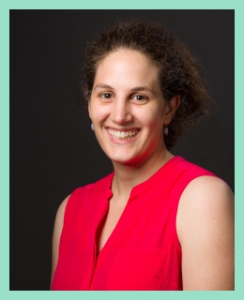 Sarah Kandil MD is a pediatric intensive care doctor at Yale New Haven Children’s Hospital (YNHCH) who works with children coping with any type of critical illness. She is an Assistant Professor of Pediatrics (critical care) at Yale School of Medicine, as well as a Deputy Quality and Safety Officer at YNHCH. Her clinical research interests include the study and development of systems for improving the quality of patient care, as well as nutrition and metabolic changes during critical illness. She has assisted in the development of a scoring tool that helps transport teams make early triage decisions. She has studied the effects of cardiopulmonary bypass on inflammatory states, and been involved in multicenter trials evaluating glucose control, prevention of thrombosis events, and nutritional outcomes. In addition clinical research and providing care for critically ill children, Dr. Kandil has led the hospital’s participation in several collaborative projects to reduce harm from unplanned extubations, venous thrombotic events and, most recently, sepsis. Her work strives to improve the quality and safety of care for all children.
Sarah Kandil MD is a pediatric intensive care doctor at Yale New Haven Children’s Hospital (YNHCH) who works with children coping with any type of critical illness. She is an Assistant Professor of Pediatrics (critical care) at Yale School of Medicine, as well as a Deputy Quality and Safety Officer at YNHCH. Her clinical research interests include the study and development of systems for improving the quality of patient care, as well as nutrition and metabolic changes during critical illness. She has assisted in the development of a scoring tool that helps transport teams make early triage decisions. She has studied the effects of cardiopulmonary bypass on inflammatory states, and been involved in multicenter trials evaluating glucose control, prevention of thrombosis events, and nutritional outcomes. In addition clinical research and providing care for critically ill children, Dr. Kandil has led the hospital’s participation in several collaborative projects to reduce harm from unplanned extubations, venous thrombotic events and, most recently, sepsis. Her work strives to improve the quality and safety of care for all children.
Vishal Kapadia
 Dr. Kapadia obtained his medical degree and pediatric residency training from the N.H.L. Medical College in India. He then moved to the United States and obtained US pediatric residency training at the University of Illinois Medical Center, Chicago. He was recruited to the “University of Texas Southwestern Medical Center Neonatal-Perinatal Fellowship Training Program” in 2008. His fellowship was highly productive and he was able to firmly establish his research passion for neonatal resuscitation during this time. He was recruited as an academic neonatologist and clinical scholar faculty in 2011 at the same institution. He is interested in the critical issue of the use of oxygen during neonatal resuscitation and its potential long-term effects in both term and preterm infants. He has been highly productive in his focused area of research. During the first year of his fellowship, Vishal completed a thorough review of the literature regarding oxygen use during newborn resuscitation. This review raised concerns that injudicious use of supplemental oxygen during resuscitation could lead to hyperoxygenation and thus contribute to neonatal morbidity via damage from oxygen toxicity. Vishal then used his evidence review to formulate hypothesis driven studies to advance the field. His cohort study, published in the Journal of Pediatrics (2013), found an association of early hyperoxemia with the development of HIE in term infants with severe perinatal acidosis. He successfully obtained funding from a UT-STAR, NIH/NCATS Pilot grant and completed a randomized controlled trial in which preterm neonates initially resuscitated with 100% oxygen and subsequently weaned were compared to preterm neonates initially resuscitated with 21% oxygen which was subsequently supplemented to meet the dynamic transitional goal saturations that are now recommended by Neonatal Resuscitation Program (NRP) guidelines. Goal saturations for the intervention group were based on the median transitional goal saturations of healthy term neonates. This study published in Pediatrics (2013) demonstrated that it was feasible to start preterm resuscitation with 21% oxygen and adjust oxygen based on dynamic transitional saturations. It also demonstrated that reducing the oxygen load in the delivery room reduced early oxidative stress and decreased bronchopulmonary dysplasia (BPD). NRP revised its guidelines in 2010 and adopted the use of blended oxygen and dynamic transitional goal saturations. Vishal helped implement these revised guidelines at Parkland Hospital. He has since conducted a retrospective cohort study in 199 preterm neonates to see if the implementation of the new oxygen guidelines continues to provide a protective benefit outside of the clinical trial. His cohort study, published in the Journal of Pediatrics (2017), found reductions in BPD with implementation of the new oxygen guidelines even after adjusting for with confounding variables. In addition, he has published multiple review articles examining the evidence for advanced CPR practices in the delivery room. He has published 2 meta-analyses, with world experts such as Dr. Vento and Dr. Saugstad, on optimal initial oxygen concentration and oxygen saturation targets for resuscitation of preterm infants. He recently published in Pediatrics (2019) his quality improvement project of decreasing delivery room intubations in preterm infants by improving non-invasive ventilation in the delivery room. He was able to successfully compete for external funding from Neonatal Resuscitation Program (NRP) grant, a combined program of the American Academy of Pediatrics (AAP) and American heart association (AHA). He was one of only four faculty candidates selected for competitive NIH KL2 Clinical Scholar Program for UT Southwestern in 2013. He was also selected in the 2014 Young Investigator Coaching Program by Society of Pediatric research, which allows him to have structured mentorship from Dr. Ola Saugstad, a world-renowned leader in oxidative stress and oxygen therapy in newborn. He has served as a member of AHA guideline writing group member since 2015 and has been one of the authors of neonatal resuscitation guidelines since 2014. He is also a NRP steering committee member since 2015. He has been a reviewer for NRP grant since 2015 and has conducted webinars for NRP instructors with the AAP. He co-chaired “Current Issues in NRP” national seminar in 2017 at AAP national conference. He has been selected as a task force member for the International Liaison Committee on Resuscitation (ILCOR) in 2017 and has since contributed in the ongoing systematic review and consensus of science of neonatal resuscitation at International level. Dr. Kapadia is currently focusing on how to optimize oxygen delivery to preterm infants ≤ 28 weeks gestational age. He is currently conducting a single center, randomized clinical trial investigating optimal oxygen saturation targets during preterm resuscitation in the delivery room. This unique trial is comparing three different oxygen saturation targets in the first 10 minutes after birth to determine if one of the strategies is effective in reducing hypoxemia-hyperoxemia burden and resultant oxidative stress. The trial is funded by NRP research grant and NICHD K23 award. He has been awarded the NICHD Mentored Patient-Oriented Research Career Development Award (NICHD K23) In June 2016 for the 4-year period. He has completed recruitment for the clinical trial and he is currently analyzing the data. This project will serve as a basis for a larger, multicenter, randomized control trial powered for long-term neurodevelopmental outcomes. Dr. Kapadia is planning to submit NIH research grant RO1 in February 2020 to obtain funding for this multicenter trial. This is a major gap in knowledge as acknowledged by the ILCOR, NRP Steering Committee and the neonatal community as a whole.
Dr. Kapadia obtained his medical degree and pediatric residency training from the N.H.L. Medical College in India. He then moved to the United States and obtained US pediatric residency training at the University of Illinois Medical Center, Chicago. He was recruited to the “University of Texas Southwestern Medical Center Neonatal-Perinatal Fellowship Training Program” in 2008. His fellowship was highly productive and he was able to firmly establish his research passion for neonatal resuscitation during this time. He was recruited as an academic neonatologist and clinical scholar faculty in 2011 at the same institution. He is interested in the critical issue of the use of oxygen during neonatal resuscitation and its potential long-term effects in both term and preterm infants. He has been highly productive in his focused area of research. During the first year of his fellowship, Vishal completed a thorough review of the literature regarding oxygen use during newborn resuscitation. This review raised concerns that injudicious use of supplemental oxygen during resuscitation could lead to hyperoxygenation and thus contribute to neonatal morbidity via damage from oxygen toxicity. Vishal then used his evidence review to formulate hypothesis driven studies to advance the field. His cohort study, published in the Journal of Pediatrics (2013), found an association of early hyperoxemia with the development of HIE in term infants with severe perinatal acidosis. He successfully obtained funding from a UT-STAR, NIH/NCATS Pilot grant and completed a randomized controlled trial in which preterm neonates initially resuscitated with 100% oxygen and subsequently weaned were compared to preterm neonates initially resuscitated with 21% oxygen which was subsequently supplemented to meet the dynamic transitional goal saturations that are now recommended by Neonatal Resuscitation Program (NRP) guidelines. Goal saturations for the intervention group were based on the median transitional goal saturations of healthy term neonates. This study published in Pediatrics (2013) demonstrated that it was feasible to start preterm resuscitation with 21% oxygen and adjust oxygen based on dynamic transitional saturations. It also demonstrated that reducing the oxygen load in the delivery room reduced early oxidative stress and decreased bronchopulmonary dysplasia (BPD). NRP revised its guidelines in 2010 and adopted the use of blended oxygen and dynamic transitional goal saturations. Vishal helped implement these revised guidelines at Parkland Hospital. He has since conducted a retrospective cohort study in 199 preterm neonates to see if the implementation of the new oxygen guidelines continues to provide a protective benefit outside of the clinical trial. His cohort study, published in the Journal of Pediatrics (2017), found reductions in BPD with implementation of the new oxygen guidelines even after adjusting for with confounding variables. In addition, he has published multiple review articles examining the evidence for advanced CPR practices in the delivery room. He has published 2 meta-analyses, with world experts such as Dr. Vento and Dr. Saugstad, on optimal initial oxygen concentration and oxygen saturation targets for resuscitation of preterm infants. He recently published in Pediatrics (2019) his quality improvement project of decreasing delivery room intubations in preterm infants by improving non-invasive ventilation in the delivery room. He was able to successfully compete for external funding from Neonatal Resuscitation Program (NRP) grant, a combined program of the American Academy of Pediatrics (AAP) and American heart association (AHA). He was one of only four faculty candidates selected for competitive NIH KL2 Clinical Scholar Program for UT Southwestern in 2013. He was also selected in the 2014 Young Investigator Coaching Program by Society of Pediatric research, which allows him to have structured mentorship from Dr. Ola Saugstad, a world-renowned leader in oxidative stress and oxygen therapy in newborn. He has served as a member of AHA guideline writing group member since 2015 and has been one of the authors of neonatal resuscitation guidelines since 2014. He is also a NRP steering committee member since 2015. He has been a reviewer for NRP grant since 2015 and has conducted webinars for NRP instructors with the AAP. He co-chaired “Current Issues in NRP” national seminar in 2017 at AAP national conference. He has been selected as a task force member for the International Liaison Committee on Resuscitation (ILCOR) in 2017 and has since contributed in the ongoing systematic review and consensus of science of neonatal resuscitation at International level. Dr. Kapadia is currently focusing on how to optimize oxygen delivery to preterm infants ≤ 28 weeks gestational age. He is currently conducting a single center, randomized clinical trial investigating optimal oxygen saturation targets during preterm resuscitation in the delivery room. This unique trial is comparing three different oxygen saturation targets in the first 10 minutes after birth to determine if one of the strategies is effective in reducing hypoxemia-hyperoxemia burden and resultant oxidative stress. The trial is funded by NRP research grant and NICHD K23 award. He has been awarded the NICHD Mentored Patient-Oriented Research Career Development Award (NICHD K23) In June 2016 for the 4-year period. He has completed recruitment for the clinical trial and he is currently analyzing the data. This project will serve as a basis for a larger, multicenter, randomized control trial powered for long-term neurodevelopmental outcomes. Dr. Kapadia is planning to submit NIH research grant RO1 in February 2020 to obtain funding for this multicenter trial. This is a major gap in knowledge as acknowledged by the ILCOR, NRP Steering Committee and the neonatal community as a whole.
Joshua Kennedy

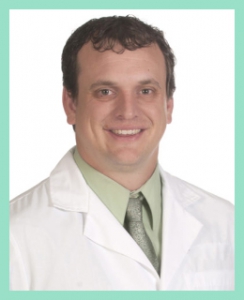 Dr. Kennedy received his medical degree from UAMS in 2006 and completed an Internal Medicine and Pediatrics residency from 2006 to 2010. He went on to complete a fellowship in Allergy and Immunology at the University of Virginia. Dr. Kennedy joined the faculty of UAMS in July 2013 where he is a member of the Division of Pediatric Allergy and Immunology and the ACRI Lung Cell Biology Lab. Dr. Kennedy’s primary research focuses upon mechanisms whereby infection with the common cold virus, rhinovirus (RV), leads to exacerbations of asthma. 60% to 80% of children seen in the emergency room with an exacerbation of asthma will be infected with RV. In his previous research, it became clear that while RV infection alone increases the risk of wheezing in children with asthma; the combination of RV infection and high titer sensitization to allergen significantly increases the odds to wheeze in children seen in the emergency department. It is this synergy between allergy and RV infection that drives his current research hypotheses. To that end, he is studying epithelial cell-derived cytokines that bias a Th2 (i.e., allergic) response (IL-33, IL-25, and TSLP) associated with RV infection in subjects with asthma both in vitro and in vivo. Also, Dr. Kennedy enthusiastically contributes to the education of fellows, residents, and students at UAMS by participating in the educational mission of the Department of Pediatrics in many capacities.
Dr. Kennedy received his medical degree from UAMS in 2006 and completed an Internal Medicine and Pediatrics residency from 2006 to 2010. He went on to complete a fellowship in Allergy and Immunology at the University of Virginia. Dr. Kennedy joined the faculty of UAMS in July 2013 where he is a member of the Division of Pediatric Allergy and Immunology and the ACRI Lung Cell Biology Lab. Dr. Kennedy’s primary research focuses upon mechanisms whereby infection with the common cold virus, rhinovirus (RV), leads to exacerbations of asthma. 60% to 80% of children seen in the emergency room with an exacerbation of asthma will be infected with RV. In his previous research, it became clear that while RV infection alone increases the risk of wheezing in children with asthma; the combination of RV infection and high titer sensitization to allergen significantly increases the odds to wheeze in children seen in the emergency department. It is this synergy between allergy and RV infection that drives his current research hypotheses. To that end, he is studying epithelial cell-derived cytokines that bias a Th2 (i.e., allergic) response (IL-33, IL-25, and TSLP) associated with RV infection in subjects with asthma both in vitro and in vivo. Also, Dr. Kennedy enthusiastically contributes to the education of fellows, residents, and students at UAMS by participating in the educational mission of the Department of Pediatrics in many capacities.
Sarah Kizilbash
 Dr. Kizilbash’s journey as a researcher began during medical school where she examined the risk factors for breast cancer in women younger than 35 years of age. During residency, she studied the barriers to successful breastfeeding among women in urban settings and received an award from the American Academy of Pediatrics (Michigan Chapter) for this work. Dr. Kizilbash highly valued education for medical students, residents and general pediatricians, and toward this end, published 15 educational articles in peer-reviewed educational journals. To enhance her research skills, she pursued a master’s degree in clinical research during pediatric nephrology fellowship. While training to be a nephrologist, she was struck by the morbidity and mortality associated with organ transplantation and focused her research efforts on improving kidney transplant outcomes for children. During her fellowship, she completed four studies that examined various aspects of organ transplantation. Dr. Kizilbash received a bronze level prize at the University of Minnesota research symposium for her research that showed adverse effects of early stages of acute kidney injury on 1-year mortality risk in pediatric stem cell transplant recipients. She was also invited to present the results of this at the annual meeting of the American Society of Pediatric Nephrology. In 2016, Dr. Kizilbash accepted a position as an Assistant Professor at the University of Minnesota and secured a competitive intramural grant to study overall patient and graft survival in solid organ recipients with diffuse large B cell lymphoma. Since 2016, she has published 4 peer-reviewed manuscripts and 7 peer-reviewed abstracts. She is currently engaged in clinical research using large national databases of transplant recipients to improve kidney transplant outcomes in children. Dr. Kizilbash is very passionate about her work and strongly feels that no life should be lost due to end-stage renal disease.
Dr. Kizilbash’s journey as a researcher began during medical school where she examined the risk factors for breast cancer in women younger than 35 years of age. During residency, she studied the barriers to successful breastfeeding among women in urban settings and received an award from the American Academy of Pediatrics (Michigan Chapter) for this work. Dr. Kizilbash highly valued education for medical students, residents and general pediatricians, and toward this end, published 15 educational articles in peer-reviewed educational journals. To enhance her research skills, she pursued a master’s degree in clinical research during pediatric nephrology fellowship. While training to be a nephrologist, she was struck by the morbidity and mortality associated with organ transplantation and focused her research efforts on improving kidney transplant outcomes for children. During her fellowship, she completed four studies that examined various aspects of organ transplantation. Dr. Kizilbash received a bronze level prize at the University of Minnesota research symposium for her research that showed adverse effects of early stages of acute kidney injury on 1-year mortality risk in pediatric stem cell transplant recipients. She was also invited to present the results of this at the annual meeting of the American Society of Pediatric Nephrology. In 2016, Dr. Kizilbash accepted a position as an Assistant Professor at the University of Minnesota and secured a competitive intramural grant to study overall patient and graft survival in solid organ recipients with diffuse large B cell lymphoma. Since 2016, she has published 4 peer-reviewed manuscripts and 7 peer-reviewed abstracts. She is currently engaged in clinical research using large national databases of transplant recipients to improve kidney transplant outcomes in children. Dr. Kizilbash is very passionate about her work and strongly feels that no life should be lost due to end-stage renal disease.
Stephan Kohlhoff

No biography provided.
Aaron Kornblith
 Dr. Aaron E. Kornblith is an Assistant Professor of Emergency Medicine and Pediatrics at the University of California, San Francisco (UCSF). Dr. Kornblith’s research concentrates on understanding the impact of diagnostic testing on important outcomes for the sick and injured child. His current research focus is on enhancing point-of-care diagnostics to improve the quality of care for children with potential emergency conditions by utilizing advanced machine learning techniques. Dr. Kornblith practices clinically at the UCSF Benioff Children’s Hospitals and Zuckerberg San Francisco General Hospital, where he is the director of pediatric emergency ultrasound.
Dr. Aaron E. Kornblith is an Assistant Professor of Emergency Medicine and Pediatrics at the University of California, San Francisco (UCSF). Dr. Kornblith’s research concentrates on understanding the impact of diagnostic testing on important outcomes for the sick and injured child. His current research focus is on enhancing point-of-care diagnostics to improve the quality of care for children with potential emergency conditions by utilizing advanced machine learning techniques. Dr. Kornblith practices clinically at the UCSF Benioff Children’s Hospitals and Zuckerberg San Francisco General Hospital, where he is the director of pediatric emergency ultrasound.
Mohan Krishnan
 Dr. Mohan Krishnan’s research focus is on understanding the inflammatory mechanisms of neonatal necrotizing enterocolitis (NEC). Since his postdoctoral training in neonatal gastroenterology from 2009, he has carried out serial studies to elucidate the mechanisms associated with the pathobiology of NEC. His cross training in Biochemistry, Biotechnology, molecular biology and clinical aspects of NEC places him in a small group of researchers capable of elucidating the cellular and immunologic events associated with NEC. His seminal contributions include the development of two very important mouse models to study NEC by using (1) the immunogen trinitrobenzene sulfonic acid and (2) a highly innovative mouse model of NEC caused by the administration of blood transfusions, which is related to the severity and duration of the underlying anemia. He laid the groundwork for these animal models to understand the mechanism(s) by which bowel injury occurs during NEC is a critical step in the development of novel anti-inflammatory therapies that can prevent/ameliorate tissue damage in NEC.
Dr. Mohan Krishnan’s research focus is on understanding the inflammatory mechanisms of neonatal necrotizing enterocolitis (NEC). Since his postdoctoral training in neonatal gastroenterology from 2009, he has carried out serial studies to elucidate the mechanisms associated with the pathobiology of NEC. His cross training in Biochemistry, Biotechnology, molecular biology and clinical aspects of NEC places him in a small group of researchers capable of elucidating the cellular and immunologic events associated with NEC. His seminal contributions include the development of two very important mouse models to study NEC by using (1) the immunogen trinitrobenzene sulfonic acid and (2) a highly innovative mouse model of NEC caused by the administration of blood transfusions, which is related to the severity and duration of the underlying anemia. He laid the groundwork for these animal models to understand the mechanism(s) by which bowel injury occurs during NEC is a critical step in the development of novel anti-inflammatory therapies that can prevent/ameliorate tissue damage in NEC.
Ashwini Lakshmanan

 Dr. Lakshmanan’s passion has been to address disparities in health care delivery in the field of perinatal-neonatal medicine. A native of southern California, she spent time volunteering in resource poor areas of Los Angeles. She has always known that creating a community of health only comes hand in hand with one of equity. Dr. Lakshmanan earned a dual degree B.S./B.A. at the University of Southern California. Upon graduation, she entered the USC Keck School of Medicine. As part of training, she worked at Los Angeles County Hospital, which serves the most vulnerable of populations. She then completed a pediatric residency at Children’s Hospital Los Angeles (CHLA) in 2008 where she also completed a Chief Residency year in 2009. CHLA is the only top 10 children’s hospital that is a safety-net hospital. From this experience, she knew that she wanted to develop a proficiency to critically evaluate pediatric and infant-health programs. To develop her ability to perform health services research, she entered the Harvard-wide Pediatric Health Services Research fellowship, which provides a highly structured mentorship, and a Masters in Public Health degree from the Harvard School of Public Health. This nicely complemented her clinical training in the Harvard Neonatal Perinatal Medicine Fellowship program. In recognition of her training, Dr. Lakshmanan was recruited to the University of Southern California (USC) Keck School of Medicine and Children’s Hospital Los Angeles, Fetal and Neonatal Institute as an Assistant Professor. In 2014, she was also made the Section Head of Epidemiology and Outcomes for the division. She was awarded the Saban Research Institute Research Career Development and received the Young Investigator Award from the Lucile Packard Foundation that provided funding for direct costs to begin a research project evaluating “The impact on Hispanic families and caregivers of preterm infants” in Los Angeles. She was then fortunate enough to receive a NIH NCATS KL2 Award with her mentors, Drs. Kipke and Williams to “Reduce Disparities during Transition of High Risk Infants Using Patient Navigation” as well as the Zumberge Diversity and Inclusion Award and a Lund Foundation grant. She has been recognized as a thought leader in this area and is leading a working group to improve inequity in transition for the California Perinatal Collaborative Health Equity Task Force and have been a national speaker on the topic most recently at the “Cool Topics” meeting in March, 2019. She will also earn her Masters in Science from USC in 2019. Now she is devoting her time on developing a mobile health solution, “Baby Steps LA” to help families transition to home from the NICU. “Improving health equity during transition and follow-up of high risk infants with a virtual transition of care program,” contributes to the culture of health equity by potentially mitigating disparities that exist in this population. In fact, she and her team were just awarded the American Hospital Association’s 2019 Innovation Challenge third place prize to identify an innovative solution to address social determinants of health for vulnerable populations. In addition, Dr. Lakshmanan has also worked on numerous projects to understand the epidemiology and outcomes of neonates with high risk conditions. She has also been named fellowship director of the newly formed neonatal outcomes research fellowship.
Dr. Lakshmanan’s passion has been to address disparities in health care delivery in the field of perinatal-neonatal medicine. A native of southern California, she spent time volunteering in resource poor areas of Los Angeles. She has always known that creating a community of health only comes hand in hand with one of equity. Dr. Lakshmanan earned a dual degree B.S./B.A. at the University of Southern California. Upon graduation, she entered the USC Keck School of Medicine. As part of training, she worked at Los Angeles County Hospital, which serves the most vulnerable of populations. She then completed a pediatric residency at Children’s Hospital Los Angeles (CHLA) in 2008 where she also completed a Chief Residency year in 2009. CHLA is the only top 10 children’s hospital that is a safety-net hospital. From this experience, she knew that she wanted to develop a proficiency to critically evaluate pediatric and infant-health programs. To develop her ability to perform health services research, she entered the Harvard-wide Pediatric Health Services Research fellowship, which provides a highly structured mentorship, and a Masters in Public Health degree from the Harvard School of Public Health. This nicely complemented her clinical training in the Harvard Neonatal Perinatal Medicine Fellowship program. In recognition of her training, Dr. Lakshmanan was recruited to the University of Southern California (USC) Keck School of Medicine and Children’s Hospital Los Angeles, Fetal and Neonatal Institute as an Assistant Professor. In 2014, she was also made the Section Head of Epidemiology and Outcomes for the division. She was awarded the Saban Research Institute Research Career Development and received the Young Investigator Award from the Lucile Packard Foundation that provided funding for direct costs to begin a research project evaluating “The impact on Hispanic families and caregivers of preterm infants” in Los Angeles. She was then fortunate enough to receive a NIH NCATS KL2 Award with her mentors, Drs. Kipke and Williams to “Reduce Disparities during Transition of High Risk Infants Using Patient Navigation” as well as the Zumberge Diversity and Inclusion Award and a Lund Foundation grant. She has been recognized as a thought leader in this area and is leading a working group to improve inequity in transition for the California Perinatal Collaborative Health Equity Task Force and have been a national speaker on the topic most recently at the “Cool Topics” meeting in March, 2019. She will also earn her Masters in Science from USC in 2019. Now she is devoting her time on developing a mobile health solution, “Baby Steps LA” to help families transition to home from the NICU. “Improving health equity during transition and follow-up of high risk infants with a virtual transition of care program,” contributes to the culture of health equity by potentially mitigating disparities that exist in this population. In fact, she and her team were just awarded the American Hospital Association’s 2019 Innovation Challenge third place prize to identify an innovative solution to address social determinants of health for vulnerable populations. In addition, Dr. Lakshmanan has also worked on numerous projects to understand the epidemiology and outcomes of neonates with high risk conditions. She has also been named fellowship director of the newly formed neonatal outcomes research fellowship.
Charitharth Vivek Lal
 Dr. C. Vivek Lal is an Associate Professor of Pediatrics at University of Alabama at Birmingham where he serves as the Director of Golden Week Small Baby Program. His lab studies various ‘omic’ mechanisms as they relate to the prediction, pathogenesis and treatment of chronic lung disease of prematurity. Dr. Lal’s particular interest lies in studying the mechanisms by which pulmonary microbiome dysbiosis and exosomes affects the inflammation in premature lungs, for which his lab is funded by National Institute of Health (NIH) and American Heart Association (AHA). His scientific contributions have been published in leading journals and he has been recognized by the American Academy of Pediatrics and Society of Pediatric Research among others, with young investigator research awards.
Dr. C. Vivek Lal is an Associate Professor of Pediatrics at University of Alabama at Birmingham where he serves as the Director of Golden Week Small Baby Program. His lab studies various ‘omic’ mechanisms as they relate to the prediction, pathogenesis and treatment of chronic lung disease of prematurity. Dr. Lal’s particular interest lies in studying the mechanisms by which pulmonary microbiome dysbiosis and exosomes affects the inflammation in premature lungs, for which his lab is funded by National Institute of Health (NIH) and American Heart Association (AHA). His scientific contributions have been published in leading journals and he has been recognized by the American Academy of Pediatrics and Society of Pediatric Research among others, with young investigator research awards.
His recent work explores the mechanisms by which the microbiome modulates respiratory diseases such as Bronchopulmonary Dysplasia and Cystic Fibrosis in neonates and pediatric population respectively. An airway microbiome is present in neonates, even at birth and is associated with the development of future lung diseases. In addition, his work explores the maternal – fetal acquisition of the microbiome. Dr. Lal is also interested in studying the mechanisms of lung development and Injury by utilizing translational and basic science experimental designs. His work involves studying the role of pulmonary microRNAs, exosomes, metabolome and neutrophilic inflammation in Bronchopulmonary Dysplasia.
Fong Lam
 As a Pediatric Intensivist, Dr. Fong Lam cares for critically ill patients with organ failure, pathologic inflammation, and severe infections (sepsis). His overall career goal is to reduce the morbidity and mortality in critically ill children through his clinical and research expertise. Dr. Lam is board-certified in Pediatrics and Pediatric Critical Care Medicine. He is the Associate Director of the TCH Liver Intensive Care Unit (LICU), a transformative group started in 2014 in which a multidisciplinary team of Liver Transplant Surgeons, Hepatologists, and others work together to maximize the outcome for critically ill children with liver failure. The LICU is a novel concept and one in which there has been success in reducing the peri-transplant mortality of patients with liver failure. As a Clinician-Scientist, Dr. Lam’s research passion lies within the interactions between neutrophils, platelets, and endothelial cells within the microcirculation and how they regulate both inflammation and thrombosis. These interactions are at the heart of many disease seen in the Intensive Care Unit. He has published multiple research articles on these topics and have been funded by both small, local grants as well as recently been awarded an NIH K08 award on testing a novel protein on attenuating inflammation. He continues to work in the fields of microvascular inflammation and thrombosis and collaborates with a number of groups through his expertise in intravital microscopy techniques and neutrophil biology. Finally, Dr. Lam is dedicated to the development of future generations pediatrician-scientists as evident through his leadership roles in the Pediatric Critical Care Medicine Fellowship Scholarship Program as well as the Pediatric Scientist Training and Development Program and Baylor College of Medicine
As a Pediatric Intensivist, Dr. Fong Lam cares for critically ill patients with organ failure, pathologic inflammation, and severe infections (sepsis). His overall career goal is to reduce the morbidity and mortality in critically ill children through his clinical and research expertise. Dr. Lam is board-certified in Pediatrics and Pediatric Critical Care Medicine. He is the Associate Director of the TCH Liver Intensive Care Unit (LICU), a transformative group started in 2014 in which a multidisciplinary team of Liver Transplant Surgeons, Hepatologists, and others work together to maximize the outcome for critically ill children with liver failure. The LICU is a novel concept and one in which there has been success in reducing the peri-transplant mortality of patients with liver failure. As a Clinician-Scientist, Dr. Lam’s research passion lies within the interactions between neutrophils, platelets, and endothelial cells within the microcirculation and how they regulate both inflammation and thrombosis. These interactions are at the heart of many disease seen in the Intensive Care Unit. He has published multiple research articles on these topics and have been funded by both small, local grants as well as recently been awarded an NIH K08 award on testing a novel protein on attenuating inflammation. He continues to work in the fields of microvascular inflammation and thrombosis and collaborates with a number of groups through his expertise in intravital microscopy techniques and neutrophil biology. Finally, Dr. Lam is dedicated to the development of future generations pediatrician-scientists as evident through his leadership roles in the Pediatric Critical Care Medicine Fellowship Scholarship Program as well as the Pediatric Scientist Training and Development Program and Baylor College of Medicine
Andrew Landstrom
 Dr. Landstrom is a physician-scientist pediatric cardiologist at Duke University School of Medicine. Trained at the confluence of pediatric cardiology, electrophysiology, human genetics, and cell and molecular physiology, Dr. Landstrom brings a multidisciplinary-approach to understanding the genetic and molecular mechanisms of sudden cardiac death predisposing diseases in children and young adults.
Dr. Landstrom is a physician-scientist pediatric cardiologist at Duke University School of Medicine. Trained at the confluence of pediatric cardiology, electrophysiology, human genetics, and cell and molecular physiology, Dr. Landstrom brings a multidisciplinary-approach to understanding the genetic and molecular mechanisms of sudden cardiac death predisposing diseases in children and young adults.
Mariam LaTuga
 Dr. LaTuga’s research interests include breast milk provision in the Neonatal Intensive Care Unit, neonatal feeding and nutrition, as well as the intersection between microbial exposure and health. During her fellowship in Neonatal Perinatal Medicine, Dr. LaTuga worked with Dr. Patrick Seed to characterize the neonatal and maternal microbiome using culture independent methods. They performed initial work identifying intestinal fungi of premature neonates using DNA based techniques. More recently, Dr. LaTuga has studied the relationship between weight gain and antibiotic exposure and the impact of oral colostrum on salivary microbiota. She is also working with colleagues using an animal model to understand how diet may influence the development of preterm labor. As a neonatologist in an urban underserved community, Dr. LaTuga is interested understanding how clinical practice influences outcomes. She has submitted a study of clinical outcomes of infants who feed by mouth while on continuous positive airway pressure to Early Human Development. Data on the impact of duration off respiratory support prior to discharge on readmission has been presented at the Pediatric Academic Society with plans to submit the manuscript to the American Journal of Perinatology.
Dr. LaTuga’s research interests include breast milk provision in the Neonatal Intensive Care Unit, neonatal feeding and nutrition, as well as the intersection between microbial exposure and health. During her fellowship in Neonatal Perinatal Medicine, Dr. LaTuga worked with Dr. Patrick Seed to characterize the neonatal and maternal microbiome using culture independent methods. They performed initial work identifying intestinal fungi of premature neonates using DNA based techniques. More recently, Dr. LaTuga has studied the relationship between weight gain and antibiotic exposure and the impact of oral colostrum on salivary microbiota. She is also working with colleagues using an animal model to understand how diet may influence the development of preterm labor. As a neonatologist in an urban underserved community, Dr. LaTuga is interested understanding how clinical practice influences outcomes. She has submitted a study of clinical outcomes of infants who feed by mouth while on continuous positive airway pressure to Early Human Development. Data on the impact of duration off respiratory support prior to discharge on readmission has been presented at the Pediatric Academic Society with plans to submit the manuscript to the American Journal of Perinatology.
Kristen Leeman
 Kristen T. Leeman MD is a practicing Neonatologist and researcher at Boston Children’s Hospital and an Assistant Professor of Pediatrics at Harvard Medical School. She serves as the Associate Medical Director of the Boston Children’s Hospital Neonatal Intensive Care Unit and the Program Director for the Harvard Neonatal-Perinatal Fellowship. She holds an MD from the University of Virginia School of Medicine in Charlottesville, Virginia. Dr. Leeman completed residency training in Pediatrics at the University of North Carolina at Chapel Hill and subspecialty fellowship training in Neonatal-Perinatal Medicine at Boston Children’s Hospital where she served as chief fellow during her final year of training. Her basic science research focuses on scientific discoveries that bridge newborn medicine and lung stem cell biology. Her work focuses on the role of endogenous lung stem cells in lung injury. Dr. Leeman has published several studies specifically on the role of mesenchymal stem cell secreted factors on lung stem cell differentiation with support from NIH T32 and K12 career development funding. Dr. Leeman also serves as the Director of Quality for the Division of Newborn Medicine and has been trained as an Improvement Advisor at the Institute for Healthcare Improvement. Dr. Leeman strives to translate evidence-based discoveries through implementation and quality improvement research to improve the care of critically ill neonates. She has published quality improvement manuscripts focused improving access to resources and decreasing use of un-indicated medications.
Kristen T. Leeman MD is a practicing Neonatologist and researcher at Boston Children’s Hospital and an Assistant Professor of Pediatrics at Harvard Medical School. She serves as the Associate Medical Director of the Boston Children’s Hospital Neonatal Intensive Care Unit and the Program Director for the Harvard Neonatal-Perinatal Fellowship. She holds an MD from the University of Virginia School of Medicine in Charlottesville, Virginia. Dr. Leeman completed residency training in Pediatrics at the University of North Carolina at Chapel Hill and subspecialty fellowship training in Neonatal-Perinatal Medicine at Boston Children’s Hospital where she served as chief fellow during her final year of training. Her basic science research focuses on scientific discoveries that bridge newborn medicine and lung stem cell biology. Her work focuses on the role of endogenous lung stem cells in lung injury. Dr. Leeman has published several studies specifically on the role of mesenchymal stem cell secreted factors on lung stem cell differentiation with support from NIH T32 and K12 career development funding. Dr. Leeman also serves as the Director of Quality for the Division of Newborn Medicine and has been trained as an Improvement Advisor at the Institute for Healthcare Improvement. Dr. Leeman strives to translate evidence-based discoveries through implementation and quality improvement research to improve the care of critically ill neonates. She has published quality improvement manuscripts focused improving access to resources and decreasing use of un-indicated medications.
Belinda Lennerz
 Dr. Lennerz is a pediatric endocrinologist and neuroscientist at Boston Children’s Hospital. She lives in Brookline with her husband and two children aged 8 and 11 years, with whom she enjoys outdoor pursuits like kayaking, backpacking and skiing. Dr. Lennerz research interest focuses on brain circuits regulating body weight, specifically a) pathologic disruptions of these circuits, and b) effects of dietary composition on their activity. Dr. Lennerz received her medical degree in 2005 from University of Erlangen in Germany and completed a Pediatrics residency at Washington University, Saint Louis in 2006. Concurrent with residency, Dr. Lennerz completed work on her PhD, using functional MRI to study the cerebral response to chronic vs. acute pain. She began her fellowship in Endocrinology at Boston Children’s Hospital in 2009, and conducted two mechanistically-oriented studies on the effect of a low- versus high- glycemic index meal on hormones, metabolism and brain function using functional MRI imaging (AJCN 2013), and the effects of the commonly used food preservative benzoate on glucose homeostasis (Mol Genet Metab). Dr. Lennerz returned to Germany 2011-2014, where she continued to conduct research related to childhood obesity. She lead a multicenter trial on adolescent extreme obesity, and was involved in the discovery of functional leptin deficiency, a novel type of monogenetic obesity (NEJM 2015). For the last 4 years, Dr. Lennerz’s has had a K12 and since September 2018 a K23 award focused on dietary carbohydrate and type 1 diabetes mellitus (T1D). In a mechanistic study, she recruited patients with T1D to determine whether the adverse effects of high glycemic index carbohydrate on brain function (as seen in her AJCN 2013 study) are mediated by postprandial hyperglycemia, by hyperinsulinemia, or by both. In a clinical study, Dr. Lennerz surveyed a large social media community of children and adults with T1D following a very-low-carbohydrate diet and documented exceptional glycemic control, low rates of complications, and high quality of life among the participants (Pediatrics, 2018). In a parallel randomized trial, Dr. Lennerz has set out to examine the preliminary safety and efficacy of a very low carbohydrate diet for T1D. In several ancillary studies, she aims to examine the effects of this ketogenic diet on food cravings and withdrawal symptoms, hypoglycemia tolerance and on brain function during hypoglycemia.
Dr. Lennerz is a pediatric endocrinologist and neuroscientist at Boston Children’s Hospital. She lives in Brookline with her husband and two children aged 8 and 11 years, with whom she enjoys outdoor pursuits like kayaking, backpacking and skiing. Dr. Lennerz research interest focuses on brain circuits regulating body weight, specifically a) pathologic disruptions of these circuits, and b) effects of dietary composition on their activity. Dr. Lennerz received her medical degree in 2005 from University of Erlangen in Germany and completed a Pediatrics residency at Washington University, Saint Louis in 2006. Concurrent with residency, Dr. Lennerz completed work on her PhD, using functional MRI to study the cerebral response to chronic vs. acute pain. She began her fellowship in Endocrinology at Boston Children’s Hospital in 2009, and conducted two mechanistically-oriented studies on the effect of a low- versus high- glycemic index meal on hormones, metabolism and brain function using functional MRI imaging (AJCN 2013), and the effects of the commonly used food preservative benzoate on glucose homeostasis (Mol Genet Metab). Dr. Lennerz returned to Germany 2011-2014, where she continued to conduct research related to childhood obesity. She lead a multicenter trial on adolescent extreme obesity, and was involved in the discovery of functional leptin deficiency, a novel type of monogenetic obesity (NEJM 2015). For the last 4 years, Dr. Lennerz’s has had a K12 and since September 2018 a K23 award focused on dietary carbohydrate and type 1 diabetes mellitus (T1D). In a mechanistic study, she recruited patients with T1D to determine whether the adverse effects of high glycemic index carbohydrate on brain function (as seen in her AJCN 2013 study) are mediated by postprandial hyperglycemia, by hyperinsulinemia, or by both. In a clinical study, Dr. Lennerz surveyed a large social media community of children and adults with T1D following a very-low-carbohydrate diet and documented exceptional glycemic control, low rates of complications, and high quality of life among the participants (Pediatrics, 2018). In a parallel randomized trial, Dr. Lennerz has set out to examine the preliminary safety and efficacy of a very low carbohydrate diet for T1D. In several ancillary studies, she aims to examine the effects of this ketogenic diet on food cravings and withdrawal symptoms, hypoglycemia tolerance and on brain function during hypoglycemia.
Jason Levy
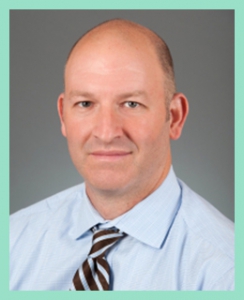 Since completing a pediatric emergency medicine (PEM) fellowship, I have served as an attending physician at Boston Children’s Hospital. Within my subspecialty, I have further focused my expertise towards pediatric point-of-care emergency ultrasound, have published numerous articles in this field, and have become a recognized leader both locally and nationally. Until 2019, I served as the Director of the Emergency Ultrasound Program within the Division of Emergency Medicine and established and served as the Director of the Pediatric Emergency Ultrasound Fellowship, the first point-of-care ultrasound fellowship of its kind at a free-standing pediatric hospital. Nationally, I have led workshops in point-of-care ultrasound at both the Pediatric Academic Societies and American Academy of Pediatrics national meetings and served as Chair of the Pediatric Section within the Section of Emergency Ultrasound of the American College of Emergency Physicians (ACEP). I served on the Pediatric Point-of-Care Ultrasound Task Force, charged with developing a consensus national point-of-care ultrasound policy statement published in 2016 and endorsed by the American Academy of Pediatrics. Related to my interest in clinical operations, in 2015, I was asked to become the Associate Clinical Director in the Division of Emergency Medicine at Boston Children’s Hospital and in 2018 was subsequently promoted to Clinical Chief of Emergency Medicine. In this role, I direct the clinical operations of the emergency department, including developing and overseeing physician and nursing staffing, establishing patient care and volume protocols, reviewing patient experience and safety events, interacting with consult services, and managing our environment of care. With nursing colleagues, I lead a monthly departmental (large group) Clinical Operations meeting as well as weekly (small group) sessions where we address departmental function and patient throughput, with a specific focus on improving process and system issues. Additionally, I have recently begun to pursue academic projects specific to patient and practice metrics.
Since completing a pediatric emergency medicine (PEM) fellowship, I have served as an attending physician at Boston Children’s Hospital. Within my subspecialty, I have further focused my expertise towards pediatric point-of-care emergency ultrasound, have published numerous articles in this field, and have become a recognized leader both locally and nationally. Until 2019, I served as the Director of the Emergency Ultrasound Program within the Division of Emergency Medicine and established and served as the Director of the Pediatric Emergency Ultrasound Fellowship, the first point-of-care ultrasound fellowship of its kind at a free-standing pediatric hospital. Nationally, I have led workshops in point-of-care ultrasound at both the Pediatric Academic Societies and American Academy of Pediatrics national meetings and served as Chair of the Pediatric Section within the Section of Emergency Ultrasound of the American College of Emergency Physicians (ACEP). I served on the Pediatric Point-of-Care Ultrasound Task Force, charged with developing a consensus national point-of-care ultrasound policy statement published in 2016 and endorsed by the American Academy of Pediatrics. Related to my interest in clinical operations, in 2015, I was asked to become the Associate Clinical Director in the Division of Emergency Medicine at Boston Children’s Hospital and in 2018 was subsequently promoted to Clinical Chief of Emergency Medicine. In this role, I direct the clinical operations of the emergency department, including developing and overseeing physician and nursing staffing, establishing patient care and volume protocols, reviewing patient experience and safety events, interacting with consult services, and managing our environment of care. With nursing colleagues, I lead a monthly departmental (large group) Clinical Operations meeting as well as weekly (small group) sessions where we address departmental function and patient throughput, with a specific focus on improving process and system issues. Additionally, I have recently begun to pursue academic projects specific to patient and practice metrics.
Tamorah Lewis
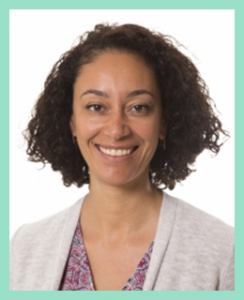 Tamorah Lewis MD, PhD is a physician and researcher at Children’s Mercy Hospital in Kansas City, MO. She is dual trained in neonatal/perinatal medicine and clinical pharmacology. Her research program focuses on developmental pharmacology and pharmacogenetics in the neonatal population. As an Assistant Professor in the Department of Pediatrics at The University of Missouri, Kansas City School of Medicine, she has the opportunity to practice clinical neonatology and design, implement and manage clinical and translational research programs in neonatal pharmacology at Children’s Mercy Hospital. The overarching goal of her research program is to bring precision therapeutics to the NICU population using modern pharmacology tools. Her research career will focus on elucidating the pharmacokinetics, pharmacodynamics and pharmacogenetics of both old and new drugs used to treat neonatal disease, with an emphasis on optimizing and individualizing drug therapy in neonates. Dr Lewis has established the Maternal Neonatal Pharmacogenetic Repository at Children’s Mercy Hospital and has multiple prospective pharmacogenetic cohort studies enrolling and depositing diverse samples to this repository. In addition, she has established research collaborations with mentors at UCSF (steroid pharmacogenetics) and Vanderbilt (ductus arteriosus pharmacogenetics), and is actively engaged as site PI in multi-site studies assessing neonatal drug safety and efficacy. Dr Lewis is actively engaged in research societies. She sits on the Board of Directors for the American Society of Clinical Pharmacology and Therapeutics and is on the Executive Committee of the American Academy of Pediatrics (AAP) Section on Clinical Pharmacology and Therapeutics. Dr Lewis is also a member of the International Neonatal Consortium, a multi-stakeholder collaboration run by the Critical Path Institute to advance neonatal therapeutics.
Tamorah Lewis MD, PhD is a physician and researcher at Children’s Mercy Hospital in Kansas City, MO. She is dual trained in neonatal/perinatal medicine and clinical pharmacology. Her research program focuses on developmental pharmacology and pharmacogenetics in the neonatal population. As an Assistant Professor in the Department of Pediatrics at The University of Missouri, Kansas City School of Medicine, she has the opportunity to practice clinical neonatology and design, implement and manage clinical and translational research programs in neonatal pharmacology at Children’s Mercy Hospital. The overarching goal of her research program is to bring precision therapeutics to the NICU population using modern pharmacology tools. Her research career will focus on elucidating the pharmacokinetics, pharmacodynamics and pharmacogenetics of both old and new drugs used to treat neonatal disease, with an emphasis on optimizing and individualizing drug therapy in neonates. Dr Lewis has established the Maternal Neonatal Pharmacogenetic Repository at Children’s Mercy Hospital and has multiple prospective pharmacogenetic cohort studies enrolling and depositing diverse samples to this repository. In addition, she has established research collaborations with mentors at UCSF (steroid pharmacogenetics) and Vanderbilt (ductus arteriosus pharmacogenetics), and is actively engaged as site PI in multi-site studies assessing neonatal drug safety and efficacy. Dr Lewis is actively engaged in research societies. She sits on the Board of Directors for the American Society of Clinical Pharmacology and Therapeutics and is on the Executive Committee of the American Academy of Pediatrics (AAP) Section on Clinical Pharmacology and Therapeutics. Dr Lewis is also a member of the International Neonatal Consortium, a multi-stakeholder collaboration run by the Critical Path Institute to advance neonatal therapeutics.
Deborah Liu

 Dr. Liu is currently Associate Division Head of Pediatric Emergency Medicine at Children’s Hospital Los Angeles. As a former Fellowship Director for Pediatric Emergency Medicine, her interests began in medical education. Currently she is most interested in the balance between education in academic medicine and efficiency, two areas which often have competing interests. Among other areas, Dr. Liu has been interested in using novel techniques in pediatric emergency medicine to promote education. She has published articles on using Just In Time Training videos for teaching splinting to trainees, which could be valuable for providers practicing in resource-scarce areas. In addition, she has been engaged in research using a technique called “swarming,” whereby the entire emergency department team (bedside nurse, trainee, and supervising physician) see a new patient together at once, which improves timeliness to orders and charting as well as allowing for trainee role modeling and team reflexivity.
Dr. Liu is currently Associate Division Head of Pediatric Emergency Medicine at Children’s Hospital Los Angeles. As a former Fellowship Director for Pediatric Emergency Medicine, her interests began in medical education. Currently she is most interested in the balance between education in academic medicine and efficiency, two areas which often have competing interests. Among other areas, Dr. Liu has been interested in using novel techniques in pediatric emergency medicine to promote education. She has published articles on using Just In Time Training videos for teaching splinting to trainees, which could be valuable for providers practicing in resource-scarce areas. In addition, she has been engaged in research using a technique called “swarming,” whereby the entire emergency department team (bedside nurse, trainee, and supervising physician) see a new patient together at once, which improves timeliness to orders and charting as well as allowing for trainee role modeling and team reflexivity.
Jennifer Marin
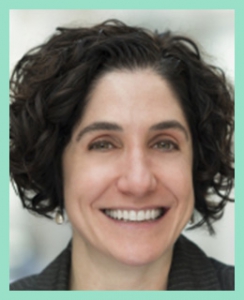 Dr. Marin’s overarching research area of interest has been emergency diagnostic imaging. She began this focus during her pediatric emergency medicine (PEM) fellowship, at which time she also earned a Master’s of Science in Clinical Epidemiology from the Center for Clinical Epidemiology and Biostatistics at University of Pennsylvania Perelman School of Medicine. Under the auspices of an F32 postdoctoral fellowship grant from the National Institute of Allergy and Infectious Diseases, she completed an additional year of training as a research fellow. In order to expand her research training, as junior faculty, she gained experience in health services research as a University of Pittsburgh Department of Emergency Medicine K12 scholar in 2012. From 2008-2014 she participated in the competitive National institutes of Health (NIH) Loan Repayment Program. Dr. Marin’s work has focused on two main themes: point-of-care ultrasound in the pediatric emergency department and the utilization and variation of advanced diagnostic imaging, such as computed tomography (CT) and magnetic resonance imaging (MRI). Through multidisciplinary and multi-institutional collaborations she has been an author on 55 peer-reviewed publications and 29 additional publications, on most of which she was either first of senior author. Her work has been published in high impact journals, such as JAMA and Pediatrics, and has received local and national media attention. Dr. Marin speaks internationally on pediatric point-of-care ultrasound and is highly regarded as an expert in the field. Dr. Marin has served as a reviewer on five NIH study sections and panels with emphases on diagnostic imaging. In 2015, she served as co-chair for an international multidisciplinary consensus conference on emergency department diagnostic imaging. The purpose of the conference was to establish a high priority research agenda. This conference was funded through the Agency for Healthcare Research and Quality and the NIH and culminated in numerous manuscripts documenting the proceedings of the conference. Dr. Marin has been a moderator at scientific conferences, served as an Associate Editor for the journal, Pediatric Emergency Care, and is a peer reviewer for 5 for scientific journals. In addition, Dr. Marin has mentored 19 faculty, fellows, and medical student trainees.
Dr. Marin’s overarching research area of interest has been emergency diagnostic imaging. She began this focus during her pediatric emergency medicine (PEM) fellowship, at which time she also earned a Master’s of Science in Clinical Epidemiology from the Center for Clinical Epidemiology and Biostatistics at University of Pennsylvania Perelman School of Medicine. Under the auspices of an F32 postdoctoral fellowship grant from the National Institute of Allergy and Infectious Diseases, she completed an additional year of training as a research fellow. In order to expand her research training, as junior faculty, she gained experience in health services research as a University of Pittsburgh Department of Emergency Medicine K12 scholar in 2012. From 2008-2014 she participated in the competitive National institutes of Health (NIH) Loan Repayment Program. Dr. Marin’s work has focused on two main themes: point-of-care ultrasound in the pediatric emergency department and the utilization and variation of advanced diagnostic imaging, such as computed tomography (CT) and magnetic resonance imaging (MRI). Through multidisciplinary and multi-institutional collaborations she has been an author on 55 peer-reviewed publications and 29 additional publications, on most of which she was either first of senior author. Her work has been published in high impact journals, such as JAMA and Pediatrics, and has received local and national media attention. Dr. Marin speaks internationally on pediatric point-of-care ultrasound and is highly regarded as an expert in the field. Dr. Marin has served as a reviewer on five NIH study sections and panels with emphases on diagnostic imaging. In 2015, she served as co-chair for an international multidisciplinary consensus conference on emergency department diagnostic imaging. The purpose of the conference was to establish a high priority research agenda. This conference was funded through the Agency for Healthcare Research and Quality and the NIH and culminated in numerous manuscripts documenting the proceedings of the conference. Dr. Marin has been a moderator at scientific conferences, served as an Associate Editor for the journal, Pediatric Emergency Care, and is a peer reviewer for 5 for scientific journals. In addition, Dr. Marin has mentored 19 faculty, fellows, and medical student trainees.
Anita McElroy
 Anita McElroy is an Assistant Professor in the Department of Pediatrics, Division of Pediatric Infectious Disease. She is a physician scientist who splits her time between seeing patients at UPMC Children’s Hospital of Pittsburgh and conducting research on emerging viruses at the University of Pittsburgh. Her lab studies hemorrhagic fever viruses that are found in Africa and the Middle East with the goal of understanding how the viruses cause disease so that novel interventions can be developed to ameliorate human disease.
Anita McElroy is an Assistant Professor in the Department of Pediatrics, Division of Pediatric Infectious Disease. She is a physician scientist who splits her time between seeing patients at UPMC Children’s Hospital of Pittsburgh and conducting research on emerging viruses at the University of Pittsburgh. Her lab studies hemorrhagic fever viruses that are found in Africa and the Middle East with the goal of understanding how the viruses cause disease so that novel interventions can be developed to ameliorate human disease.
Kenneth Michelson
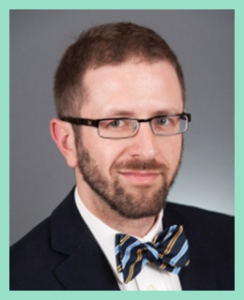 Dr. Kenneth Michelson is a practicing pediatric emergency medicine physician with training and expertise in health services research. His greatest interest is in improving the quality of care children receive in all emergency departments. His research focus is to develop tools to measure emergency care quality and performance nationally, and to assess hospital-level factors that are associated with low or high performance. In particular, Dr. Michelson wants to develop tools to measure delays in diagnosis that lead to worse outcomes. Dr. Michelson has published research assessing differences in care based on the volume of children seen in an emergency department, including demonstrating improved survival in cardiac arrest among children visiting pediatric-specific emergency departments. He has authored more than 20 research studies, most in the area of assessment of emergency care performance.
Dr. Kenneth Michelson is a practicing pediatric emergency medicine physician with training and expertise in health services research. His greatest interest is in improving the quality of care children receive in all emergency departments. His research focus is to develop tools to measure emergency care quality and performance nationally, and to assess hospital-level factors that are associated with low or high performance. In particular, Dr. Michelson wants to develop tools to measure delays in diagnosis that lead to worse outcomes. Dr. Michelson has published research assessing differences in care based on the volume of children seen in an emergency department, including demonstrating improved survival in cardiac arrest among children visiting pediatric-specific emergency departments. He has authored more than 20 research studies, most in the area of assessment of emergency care performance.
Leena Mithal
 Leena Mithal, MD MSCI is a clinical-translational investigator and pediatric infectious diseases specialist with a focus on neonatal infections. Her interest in neonatal sepsis stems from her direct clinical experience of treatment dilemmas surrounding sepsis diagnosis in preterm infants. After pediatrics residency training at Baylor College of Medicine/Texas Children’s Hospital, she was a neonatal intensive care unit hospitalist and subsequently completed infectious diseases fellowship at Northwestern University/Lurie Children’s Hospital of Chicago. Along with general and transplant infectious diseases practice, Dr. Mithal has developed particular expertise in congenital and perinatal infections and heads Lurie’s multidisciplinary congenital cytomegalovirus clinic. She also serves as a member of the American Academy of Pediatrics, Section of Infectious Diseases Education Subcommittee. Dr. Mithal’s growing research program is centered on perinatal infection pathophysiology, fetal immune development, early life microbiome, and the development of diagnostic and therapeutic tools to improve neonatal outcomes and foster antibiotic stewardship. She has led a number of studies on novel diagnostic approaches for neonatal sepsis that include vital signs analysis, molecular pathogen detection, and most recently placental inflammation and umbilical cord blood biomarkers funded by the Thrasher Research Fund, Gerber Foundation, and NIH (NIAID K23). Dr. Mithal has fostered collaborations with maternal-fetal medicine, neonatology, pathology, and biostatistics colleagues to advance innovation in the field of neonatal infectious diseases.
Leena Mithal, MD MSCI is a clinical-translational investigator and pediatric infectious diseases specialist with a focus on neonatal infections. Her interest in neonatal sepsis stems from her direct clinical experience of treatment dilemmas surrounding sepsis diagnosis in preterm infants. After pediatrics residency training at Baylor College of Medicine/Texas Children’s Hospital, she was a neonatal intensive care unit hospitalist and subsequently completed infectious diseases fellowship at Northwestern University/Lurie Children’s Hospital of Chicago. Along with general and transplant infectious diseases practice, Dr. Mithal has developed particular expertise in congenital and perinatal infections and heads Lurie’s multidisciplinary congenital cytomegalovirus clinic. She also serves as a member of the American Academy of Pediatrics, Section of Infectious Diseases Education Subcommittee. Dr. Mithal’s growing research program is centered on perinatal infection pathophysiology, fetal immune development, early life microbiome, and the development of diagnostic and therapeutic tools to improve neonatal outcomes and foster antibiotic stewardship. She has led a number of studies on novel diagnostic approaches for neonatal sepsis that include vital signs analysis, molecular pathogen detection, and most recently placental inflammation and umbilical cord blood biomarkers funded by the Thrasher Research Fund, Gerber Foundation, and NIH (NIAID K23). Dr. Mithal has fostered collaborations with maternal-fetal medicine, neonatology, pathology, and biostatistics colleagues to advance innovation in the field of neonatal infectious diseases.
Mousumi Moulik
 Dr. Moulik is a Physician-Scientist and Assistant Professor in Pediatrics (Cardiology) in University of Pittsburgh School of Medicine and Director of the Pediatric Cardiovascular Genetics Clinic in the Children’s Hospital of Pittsburgh and has been faculty at UPMC for since June 2017 . Prior to that Dr. Moulik was faculty in the University of Texas Health Sciences Center McGovern Medical School Houston for 10 years. Dr. Moulik is Board certified in Pediatrics and Pediatric Cardiology with stellar training credentials, having received her MBBS degree in Medicine in the All India Institute of Medical Sciences, New Delhi followed by residency training in Pediatrics and combined clinical and research fellowship in Pediatric Cardiology at Baylor College of Medicine, Houston. During her fellowship she was recognized by multiple awards for her research, including ‘Fellow Basic Research Award, Society for Pediatric Research, 2005’, ‘Women in Cardiology Trainee Award for Excellence, American Heart Association, 2006’ and ‘Young Investigator Award, First Place, American Academy of Pediatrics (Section of Cardiology and Cardiac Surgery), 2006’. Dr. Moulik was supported by a T32 Award during the research years of her fellowship at Baylor College of Medicine. During her tenure as faculty in the University of Texas Health Sciences Center Houston, she was also the recipient of a K08 Mentored Clinical Scientist Research Career Development Award from NHLBI from 2008-2014. Dr. Moulik currently has an R01 funded laboratory as a Principal Investigator, located in the Vascular Medicine Institute in the University of Pittsburgh. She is the lead investigator on multiple ongoing hypothesis driven research projects in her laboratory. The key projects in the Moulik lab include: (1) ‘Tead1 in cardiac adaptation’, based on the hypothesis that Tead1, the cognate transcription factor of the organ size control Hippo pathway plays a role in hypertrophic, mitochondrial and oxidative stress adaptation in heart failure (2) ‘Immune Mechanisms and Therapeutic Immunomodulation in Myocarditis and Inflammatory Cardiomyopathy’ a translational, multi-institutional project, based on the hypothesis that T regulatory cells dysfunction plays a key role in severity of initial presentation and progression to chronic dilated cardiomyopathy in acute myocarditis and (3) ‘Circadian Clock Regulation of Cardiac Stress Adaptation’ based on the hypothesis that disruption of circadian clock impairs cardiomyocyte adaptation to oxidative stress and that genetic and pharmacologic modulation of key circadian clock components can ameliorate adverse cardiac remodeling under states of cardiac stress. All these ongoing projects in the Moulik lab have significant relevance to the pediatric population. Heart failure in children, though rare, is an important cause for morbidity and mortality in this age group, especially in patients with congenital heart disease, rheumatic heart disease, genetic cardiomyopathies and myocarditis. Dr. Moulik’s research aims to delineate the molecular mechanisms underlying different forms of heart failure relevant to children and adults with the long-term goal of identifying potential novel therapeutic targets. As stated in her CV Dr. Moulik is the senior author on two recent peer reviewed publications based on her work on Tead1 in the heart. These include ‘Tead1 plays a critical and nonredundant role in maintenance of adult cardiomyocyte homeostasis and excitation-contraction coupling and its loss in the adult heart results in acute lethal dilated cardiomyopathy’ (Liu et al, JCI Insight. 2017) and ‘Tead1 is required for perinatal cardiomyocyte proliferation’ (Liu et al, PLoS One Feb 2019).
Dr. Moulik is a Physician-Scientist and Assistant Professor in Pediatrics (Cardiology) in University of Pittsburgh School of Medicine and Director of the Pediatric Cardiovascular Genetics Clinic in the Children’s Hospital of Pittsburgh and has been faculty at UPMC for since June 2017 . Prior to that Dr. Moulik was faculty in the University of Texas Health Sciences Center McGovern Medical School Houston for 10 years. Dr. Moulik is Board certified in Pediatrics and Pediatric Cardiology with stellar training credentials, having received her MBBS degree in Medicine in the All India Institute of Medical Sciences, New Delhi followed by residency training in Pediatrics and combined clinical and research fellowship in Pediatric Cardiology at Baylor College of Medicine, Houston. During her fellowship she was recognized by multiple awards for her research, including ‘Fellow Basic Research Award, Society for Pediatric Research, 2005’, ‘Women in Cardiology Trainee Award for Excellence, American Heart Association, 2006’ and ‘Young Investigator Award, First Place, American Academy of Pediatrics (Section of Cardiology and Cardiac Surgery), 2006’. Dr. Moulik was supported by a T32 Award during the research years of her fellowship at Baylor College of Medicine. During her tenure as faculty in the University of Texas Health Sciences Center Houston, she was also the recipient of a K08 Mentored Clinical Scientist Research Career Development Award from NHLBI from 2008-2014. Dr. Moulik currently has an R01 funded laboratory as a Principal Investigator, located in the Vascular Medicine Institute in the University of Pittsburgh. She is the lead investigator on multiple ongoing hypothesis driven research projects in her laboratory. The key projects in the Moulik lab include: (1) ‘Tead1 in cardiac adaptation’, based on the hypothesis that Tead1, the cognate transcription factor of the organ size control Hippo pathway plays a role in hypertrophic, mitochondrial and oxidative stress adaptation in heart failure (2) ‘Immune Mechanisms and Therapeutic Immunomodulation in Myocarditis and Inflammatory Cardiomyopathy’ a translational, multi-institutional project, based on the hypothesis that T regulatory cells dysfunction plays a key role in severity of initial presentation and progression to chronic dilated cardiomyopathy in acute myocarditis and (3) ‘Circadian Clock Regulation of Cardiac Stress Adaptation’ based on the hypothesis that disruption of circadian clock impairs cardiomyocyte adaptation to oxidative stress and that genetic and pharmacologic modulation of key circadian clock components can ameliorate adverse cardiac remodeling under states of cardiac stress. All these ongoing projects in the Moulik lab have significant relevance to the pediatric population. Heart failure in children, though rare, is an important cause for morbidity and mortality in this age group, especially in patients with congenital heart disease, rheumatic heart disease, genetic cardiomyopathies and myocarditis. Dr. Moulik’s research aims to delineate the molecular mechanisms underlying different forms of heart failure relevant to children and adults with the long-term goal of identifying potential novel therapeutic targets. As stated in her CV Dr. Moulik is the senior author on two recent peer reviewed publications based on her work on Tead1 in the heart. These include ‘Tead1 plays a critical and nonredundant role in maintenance of adult cardiomyocyte homeostasis and excitation-contraction coupling and its loss in the adult heart results in acute lethal dilated cardiomyopathy’ (Liu et al, JCI Insight. 2017) and ‘Tead1 is required for perinatal cardiomyocyte proliferation’ (Liu et al, PLoS One Feb 2019).
Emily Mueller
 Dr. Mueller is a Pediatric Hematologist-Oncologist and Health Services Research who is interested in how children with cancer and their caregivers interact with the healthcare system. Her research has focused on emergency department (ED) utilization patterns and needs of children with cancer both locally and across the United States. Dr. Mueller revealed that there is high utilization of ED services by children with cancer and there are a wide range of reasons for ED visits among children with cancer. She also explored the outcomes that are most important to children with cancer and their caregivers when they seek care in the ED and found that these are separate from commonly evaluated quality metrics. The most important outcomes to this population included system-level issues (e.g., cleanliness of space, timeliness of evaluation) and oncology provider- and ED provider-level issues (e.g., ability to access port-a-caths, quality of communication). Participants also identified outcomes that were within the control of the patient/caregiver such as improving their sense of preparedness. These research endeavors lead Dr. Mueller to desire to find novel and innovative methods to support caregivers in the care of their child with cancer. She obtained competitive funding from Indiana University Health Values Fund for Research to create a Children’s Oncology Planning for Emergencies (COPE) mHealth tool to aid in preparing caregivers for when medical emergencies arise for their child with cancer in the community setting. She has co-designed the COPE tool with a group of stakeholders including adolescents with cancer, caregivers of children with cancer, oncology providers, and emergency department providers. On further investigation, she also found that caregivers of children with cancer desired an mHealth tool to help in the medical management of their child. Therefore, Dr. Mueller obtained a National Cancer Institute career development award to co-design, create, refine, and pilot test an mHealth tool to support caregivers including medical knowledge, symptom tracking, and medication reminders.
Dr. Mueller is a Pediatric Hematologist-Oncologist and Health Services Research who is interested in how children with cancer and their caregivers interact with the healthcare system. Her research has focused on emergency department (ED) utilization patterns and needs of children with cancer both locally and across the United States. Dr. Mueller revealed that there is high utilization of ED services by children with cancer and there are a wide range of reasons for ED visits among children with cancer. She also explored the outcomes that are most important to children with cancer and their caregivers when they seek care in the ED and found that these are separate from commonly evaluated quality metrics. The most important outcomes to this population included system-level issues (e.g., cleanliness of space, timeliness of evaluation) and oncology provider- and ED provider-level issues (e.g., ability to access port-a-caths, quality of communication). Participants also identified outcomes that were within the control of the patient/caregiver such as improving their sense of preparedness. These research endeavors lead Dr. Mueller to desire to find novel and innovative methods to support caregivers in the care of their child with cancer. She obtained competitive funding from Indiana University Health Values Fund for Research to create a Children’s Oncology Planning for Emergencies (COPE) mHealth tool to aid in preparing caregivers for when medical emergencies arise for their child with cancer in the community setting. She has co-designed the COPE tool with a group of stakeholders including adolescents with cancer, caregivers of children with cancer, oncology providers, and emergency department providers. On further investigation, she also found that caregivers of children with cancer desired an mHealth tool to help in the medical management of their child. Therefore, Dr. Mueller obtained a National Cancer Institute career development award to co-design, create, refine, and pilot test an mHealth tool to support caregivers including medical knowledge, symptom tracking, and medication reminders.
Donna Murdaugh
 Dr. Murdaugh is a board certified clinical neuropsychologist with a focus on understanding long-term neurocognitive outcomes in childhood cancer and blood disorders. She earned her Bachelor and Master of Science in psychology, with a focus on neuroscience from the University of Alabama at Birmingham (UAB). She also earned her PhD from UAB in Medical/ Clinical Psychology. Her PhD dissertation focused on multimodal neuroimaging in children with neurodevelopmental disorders, investigating neural changes in these children before and after a comprehensive language remediation program. Dr. Murdaugh completed a clinical internship in lifespan neuropsychology from Emory University School of Medicine and then went on to do a two-year clinical fellowship at Children’s Healthcare of Atlanta (CHOA) in pediatric neuropsychology. During her internship and fellowship, she further honed her skills in the assessment of neurocognitive deficits in pediatric and young adult neurological populations utilizing a combination of neuropsychological measures and multimodal neuroimaging. During her time at CHOA, she expanded the scope of her research focus in developing cognitive remediation programs (CRPs) to improve cognitive outcomes in neurologically impaired children. After completion of her fellowship, Dr. Murdaugh accepted a position as Assistant Professor in the Division of Pediatric Hematology/Oncology, Department of Pediatrics at the UAB School of Medicine and she is also a member of the Institute for Cancer Outcomes and Survivorship (ICOS). Dr. Murdaugh have a solid history of publishing clinical translational neuroimaging studies throughout her PhD training, internship, and fellowship in a variety of pediatric populations. She has published over 25 peer-reviewed journal articles (13 first author) specific to multimodal neuroimaging and neuropsychological assessment. These projects, while spanning many different neurological and health conditions, were unified by her growing interest in cognitive remediation and behavioral interventions where she examined the efficacy of these interventions by utilizing standardized neuropsychological assessment and multimodal neuroimaging. Specifically, in Dr. Murdaugh’s current position she has developed a research program to assess neurocognitive outcomes in pediatric cancer and blood disorder populations at Children’s of Alabama Hospital. Her research interests combine clinical neuropsychology and translational neuroscience techniques in order to explore how different medical treatment modalities can elicit structural and functional changes in the brain. Her research focuses on studying brain development, maturation, and plasticity, in order to better understand different cognitive profiles in children with cancer and blood disorders, ultimately leading to more informed clinical diagnosis and targeted interventions. Her current research career goals are to continue her translational research by applying multimodal neuroimaging and multivariate statistics to pediatric patients with cancer and blood disorders in order to develop appropriate cognitive/behavioral interventions, with a particular focus on targeting cognitive skills necessary for successful transition to adult healthcare providers.
Dr. Murdaugh is a board certified clinical neuropsychologist with a focus on understanding long-term neurocognitive outcomes in childhood cancer and blood disorders. She earned her Bachelor and Master of Science in psychology, with a focus on neuroscience from the University of Alabama at Birmingham (UAB). She also earned her PhD from UAB in Medical/ Clinical Psychology. Her PhD dissertation focused on multimodal neuroimaging in children with neurodevelopmental disorders, investigating neural changes in these children before and after a comprehensive language remediation program. Dr. Murdaugh completed a clinical internship in lifespan neuropsychology from Emory University School of Medicine and then went on to do a two-year clinical fellowship at Children’s Healthcare of Atlanta (CHOA) in pediatric neuropsychology. During her internship and fellowship, she further honed her skills in the assessment of neurocognitive deficits in pediatric and young adult neurological populations utilizing a combination of neuropsychological measures and multimodal neuroimaging. During her time at CHOA, she expanded the scope of her research focus in developing cognitive remediation programs (CRPs) to improve cognitive outcomes in neurologically impaired children. After completion of her fellowship, Dr. Murdaugh accepted a position as Assistant Professor in the Division of Pediatric Hematology/Oncology, Department of Pediatrics at the UAB School of Medicine and she is also a member of the Institute for Cancer Outcomes and Survivorship (ICOS). Dr. Murdaugh have a solid history of publishing clinical translational neuroimaging studies throughout her PhD training, internship, and fellowship in a variety of pediatric populations. She has published over 25 peer-reviewed journal articles (13 first author) specific to multimodal neuroimaging and neuropsychological assessment. These projects, while spanning many different neurological and health conditions, were unified by her growing interest in cognitive remediation and behavioral interventions where she examined the efficacy of these interventions by utilizing standardized neuropsychological assessment and multimodal neuroimaging. Specifically, in Dr. Murdaugh’s current position she has developed a research program to assess neurocognitive outcomes in pediatric cancer and blood disorder populations at Children’s of Alabama Hospital. Her research interests combine clinical neuropsychology and translational neuroscience techniques in order to explore how different medical treatment modalities can elicit structural and functional changes in the brain. Her research focuses on studying brain development, maturation, and plasticity, in order to better understand different cognitive profiles in children with cancer and blood disorders, ultimately leading to more informed clinical diagnosis and targeted interventions. Her current research career goals are to continue her translational research by applying multimodal neuroimaging and multivariate statistics to pediatric patients with cancer and blood disorders in order to develop appropriate cognitive/behavioral interventions, with a particular focus on targeting cognitive skills necessary for successful transition to adult healthcare providers.
Patricia Musolino
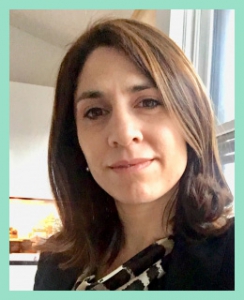 Dr. Patricia Musolino is a critical care and vascular neurologist with expertise in white matter disorders and cerebrovascular biology. She is assistant professor of neurology at Harvard Medical School and the co-director of the pediatric stroke and cerebrovascular service at Massachusetts General Hospital. Dr. Musolino clinical and research expertise revolves around the translation of discoveries in human genetics to clinical application in white matter and cerebrovascular disorders. Following training in neurosciences, imaging and molecular biology acquired during her MD and PhD in her native Argentina and post-doctoral training at Harvard. Dr. Musolino completed dual training in pediatric and adult neurology with specialization in critical care and stroke at Massachusetts General Hospital. Dr. Musolino’s laboratory focuses on leveraging insights from neuroimaging in patients and in-vitro gene-editing tools to understand how single genes mutations alter blood brain barrier and cerebrovascular function in order to find better therapies and improve the quality of life of patients with rare genetic disorders. This novel approach has led to multiple high impact publications and the development of pre-clinical tools to develop gene targeted therapies for single gene disorders causing neuroinflammation and stroke at a young age such as: ALD, ACTA2, SAMHD1, CADASIL, COL4A1 and others. Working hand to hand with patients and advocacy groups Dr. Musolino is also developing an international network and resources to maximize the life potential of children and young adults affected by these disorders. Dr. Musolino’s is the recipient of several awards from NINDS, the Hearst and Child Neurology Foundation, MGH Executive Committee on Research and the 2017 Herbert Pardes Clinical Research Excellence Award from the National Clinical Research Forum for the first gene therapy trial in a cerebral demyelinating disorder.
Dr. Patricia Musolino is a critical care and vascular neurologist with expertise in white matter disorders and cerebrovascular biology. She is assistant professor of neurology at Harvard Medical School and the co-director of the pediatric stroke and cerebrovascular service at Massachusetts General Hospital. Dr. Musolino clinical and research expertise revolves around the translation of discoveries in human genetics to clinical application in white matter and cerebrovascular disorders. Following training in neurosciences, imaging and molecular biology acquired during her MD and PhD in her native Argentina and post-doctoral training at Harvard. Dr. Musolino completed dual training in pediatric and adult neurology with specialization in critical care and stroke at Massachusetts General Hospital. Dr. Musolino’s laboratory focuses on leveraging insights from neuroimaging in patients and in-vitro gene-editing tools to understand how single genes mutations alter blood brain barrier and cerebrovascular function in order to find better therapies and improve the quality of life of patients with rare genetic disorders. This novel approach has led to multiple high impact publications and the development of pre-clinical tools to develop gene targeted therapies for single gene disorders causing neuroinflammation and stroke at a young age such as: ALD, ACTA2, SAMHD1, CADASIL, COL4A1 and others. Working hand to hand with patients and advocacy groups Dr. Musolino is also developing an international network and resources to maximize the life potential of children and young adults affected by these disorders. Dr. Musolino’s is the recipient of several awards from NINDS, the Hearst and Child Neurology Foundation, MGH Executive Committee on Research and the 2017 Herbert Pardes Clinical Research Excellence Award from the National Clinical Research Forum for the first gene therapy trial in a cerebral demyelinating disorder.
Wendy Nembhard
 Wendy Nembhard, PhD, is an associate professor and chair of the Department of Epidemiology at the University of Arkansas for Medical Sciences (UAMS), Fay W Boozman College of Public Health and an associate professor in the UAMS College of Medicine, Department of Pediatrics in Little Rock, Arkansas. She is also the director of the Arkansas Center for Birth Defects Research and Prevention. Prior to joining the UAMS College of Public Health in 2017, Dr. Nembhard was section chief of the UAMS Department of Pediatrics, Section of Birth Defects Research and scientific director of the Arkansas Reproductive Health Monitoring System, the statewide birth defects registry, at Arkansas Children’s Hospital. Before joining UAMS in 2014, she was an associate professor with tenure in the Department of Epidemiology and Biostatistics at the University of South Florida, College of Public Health in Tampa. Dr. Nembhard completed a post-doctoral fellowship in social epidemiology and cardiovascular disease at Morehouse School of Medicine in Atlanta. She earned her doctoral degree in Epidemiology and Master in Public Health degree in International and Family Health from the University of Texas Houston, School of Public Health. Dr. Nembhard was a 2014 Australian-American Fulbright Senior Scholar, 2018 Fellow of the Hedwig van Ameringen Executive Leadership in Academic Medicine (ELAM) Program at Drexel University, School of Medicine, is a Fellow of the American College of Epidemiology, a 2019 Fellow (fifth class) of the of the Aspen Institute Health Innovators Fellowship Program and a member of the Aspen Global Leadership Network.
Wendy Nembhard, PhD, is an associate professor and chair of the Department of Epidemiology at the University of Arkansas for Medical Sciences (UAMS), Fay W Boozman College of Public Health and an associate professor in the UAMS College of Medicine, Department of Pediatrics in Little Rock, Arkansas. She is also the director of the Arkansas Center for Birth Defects Research and Prevention. Prior to joining the UAMS College of Public Health in 2017, Dr. Nembhard was section chief of the UAMS Department of Pediatrics, Section of Birth Defects Research and scientific director of the Arkansas Reproductive Health Monitoring System, the statewide birth defects registry, at Arkansas Children’s Hospital. Before joining UAMS in 2014, she was an associate professor with tenure in the Department of Epidemiology and Biostatistics at the University of South Florida, College of Public Health in Tampa. Dr. Nembhard completed a post-doctoral fellowship in social epidemiology and cardiovascular disease at Morehouse School of Medicine in Atlanta. She earned her doctoral degree in Epidemiology and Master in Public Health degree in International and Family Health from the University of Texas Houston, School of Public Health. Dr. Nembhard was a 2014 Australian-American Fulbright Senior Scholar, 2018 Fellow of the Hedwig van Ameringen Executive Leadership in Academic Medicine (ELAM) Program at Drexel University, School of Medicine, is a Fellow of the American College of Epidemiology, a 2019 Fellow (fifth class) of the of the Aspen Institute Health Innovators Fellowship Program and a member of the Aspen Global Leadership Network.
Gabriela Oates
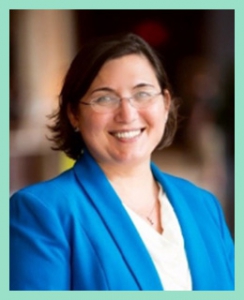 Dr. Oates is a medical sociologist with training in the social determinants of health (SDH) and experience in the application of SDH measures, tools, and data products for research in child health, with a focus on respiratory conditions. She investigates the impact of individual- and neighborhood-level sociodemographic and environmental factors on pulmonary outcomes in order to develop strategies for reducing the burden of socioeconomic disparities on lung health. Her research has documented the role of financial resources, educational attainment, living conditions, family environment, and social support for respiratory health and health-related behaviors, such as adherence and self-management. Dr. Oates has received training in patient-centered outcomes research through a K12 career-development award, and clinical research training at the NHLBI/OBSSR 28th Summer Institute on Randomized Behavioral Clinical Trials. She has expertise in the analysis of data from patient registries, large cohort studies, and the application of geographic information system methods in health research. Dr. Oates leads the Social Determinants of Health Core of the UAB Minority Health and Health Disparities Research Center and is a Scientist in the UAB Center for Outcomes and Effectiveness Research and Education and the UAB Cystic Fibrosis Research Center.
Dr. Oates is a medical sociologist with training in the social determinants of health (SDH) and experience in the application of SDH measures, tools, and data products for research in child health, with a focus on respiratory conditions. She investigates the impact of individual- and neighborhood-level sociodemographic and environmental factors on pulmonary outcomes in order to develop strategies for reducing the burden of socioeconomic disparities on lung health. Her research has documented the role of financial resources, educational attainment, living conditions, family environment, and social support for respiratory health and health-related behaviors, such as adherence and self-management. Dr. Oates has received training in patient-centered outcomes research through a K12 career-development award, and clinical research training at the NHLBI/OBSSR 28th Summer Institute on Randomized Behavioral Clinical Trials. She has expertise in the analysis of data from patient registries, large cohort studies, and the application of geographic information system methods in health research. Dr. Oates leads the Social Determinants of Health Core of the UAB Minority Health and Health Disparities Research Center and is a Scientist in the UAB Center for Outcomes and Effectiveness Research and Education and the UAB Cystic Fibrosis Research Center.
Christiana Oji-Mmuo
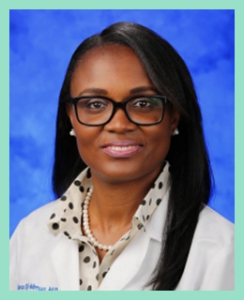 Christiana N. Oji-Mmuo, MB, BS, is an Assistant Professor and a board-certified neonatologist in the Division of Neonatal-Perinatal Medicine, Department of Pediatrics at Penn State College of Medicine. She is a graduate of the University of Ilorin, Kwara State Nigeria and completed pediatrics residency training at the Harlem Hospital Center an affiliate of the Columbia University Medical Center, in New York, NY. She joined the Penn State College of Medicine faculty following her graduation from Penn State’s Neonatal-Perinatal Medicine Fellowship Program in 2014. The primary focus of her research is on early risk assessment of opioid-exposed neonates to determine those with the highest risk for severity and potential neurodevelopmental sequelae. This includes characterizing the neurobiological underpinnings impacting the severity of Neonatal Opioid Withdrawal Syndrome (NOWS), with the overarching goal of developing improved and comprehensive detection methods for early identification using physiologic biomarkers and genetic signatures for NOWS. Dr. Oji-Mmuo has received several institutional and foundation research grants as a principal investigator to further her work in NOWS research. The above-mentioned funding opportunities have enabled her to develop feasibility data that will support an application for a career mentored (K23) to the National Institutes of Health-NIDA this fall. The goal of the K23 application is to further advance her work and provide additional training in addiction science, advanced biostatistics, clinical trials designs, and genomics. As a clinician providing care for NOWS affected infants, she is well aware of the associated risk for adverse effects impacting this population. She is actively involved in state-wide quality improvement efforts that improve the care of this vulnerable group. Through her research, she expects to contribute to the development of improved detection methods for early identification of withdrawal necessary to classify its severity, so that clinicians can have the tools they need to improve the timing and quality of individualized interventions for the infant-family unit.
Christiana N. Oji-Mmuo, MB, BS, is an Assistant Professor and a board-certified neonatologist in the Division of Neonatal-Perinatal Medicine, Department of Pediatrics at Penn State College of Medicine. She is a graduate of the University of Ilorin, Kwara State Nigeria and completed pediatrics residency training at the Harlem Hospital Center an affiliate of the Columbia University Medical Center, in New York, NY. She joined the Penn State College of Medicine faculty following her graduation from Penn State’s Neonatal-Perinatal Medicine Fellowship Program in 2014. The primary focus of her research is on early risk assessment of opioid-exposed neonates to determine those with the highest risk for severity and potential neurodevelopmental sequelae. This includes characterizing the neurobiological underpinnings impacting the severity of Neonatal Opioid Withdrawal Syndrome (NOWS), with the overarching goal of developing improved and comprehensive detection methods for early identification using physiologic biomarkers and genetic signatures for NOWS. Dr. Oji-Mmuo has received several institutional and foundation research grants as a principal investigator to further her work in NOWS research. The above-mentioned funding opportunities have enabled her to develop feasibility data that will support an application for a career mentored (K23) to the National Institutes of Health-NIDA this fall. The goal of the K23 application is to further advance her work and provide additional training in addiction science, advanced biostatistics, clinical trials designs, and genomics. As a clinician providing care for NOWS affected infants, she is well aware of the associated risk for adverse effects impacting this population. She is actively involved in state-wide quality improvement efforts that improve the care of this vulnerable group. Through her research, she expects to contribute to the development of improved detection methods for early identification of withdrawal necessary to classify its severity, so that clinicians can have the tools they need to improve the timing and quality of individualized interventions for the infant-family unit.
Cynthia Ortinau
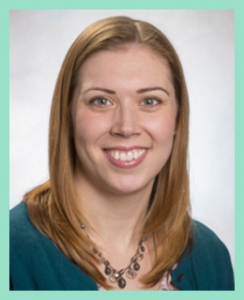 Dr. Ortinau is a neonatologist and clinician-scientist focused on improving neurological and neurodevelopmental outcomes of children with congenital heart disease (CHD). She began her research career during her neonatal-perinatal medicine fellowship (2008-2011) at Washington University in St. Louis, during which she developed expertise in the application of magnetic resonance imaging (MRI) techniques to characterize micro- and macro-structural changes in brain development. Applying these methods, Dr. Ortinau identified a quantitative reduction in brain size and changes in white matter microstructure in CHD infants, with regional vulnerabilities most apparent in the frontal lobe and brainstem prior to cardiac surgery. She also demonstrated persistence of these alterations at three months of age and discovered an association of poor weight gain with poor brain growth. These findings prompted further investigation into the patterns of impaired brain development and identified regional alterations in gyral and sulcal development in the left central sulcus, left cingulum, left orbitofrontal region, and right lateral sulcus that were present prior to cardiac surgery. These efforts led to the study of longitudinal changes in brain volume and demonstrated that CHD fetuses have an altered trajectory of brain growth from the prenatal to postnatal environment that involve multiple brain tissue-types and that is associated with brain injury. Dr. Ortinau was recruited to Brigham and Women’s Hospital in 2014, where she became the Co-Principal Investigator of a fetal brain MRI study designed to delineate the characteristics of impaired fetal brain volumes and cortical development, and determine their association with adverse neurodevelopmental outcomes. High-resolution fetal MRI data using this unique cohort of fetuses with and without CHD has led to development of a novel spatiotemporal MR atlas of the fetal brain across gestation, an automatic segmentation process that results in highly accurate segmentations of fetal brain structures, and a pipeline for fetal diffusion imaging. These data have also contributed to new methods for analyzing sulcal patterns that allow for the comparison of sulcal depths, while accounting for sulcal position and correspondence of each sulcus to neighboring sulci. This work resulted in identification of atypical cortical development in the left cerebral hemisphere of CHD fetuses compared to typically developing fetuses. This method has also been used to characterize cerebral cortical development in fetuses with cortical malformations and agenesis of the corpus callosum. In 2016, Dr. Ortinau was recruited back to Washington University to establish a cardiac neurodevelopmental research program. She has acquired funding, developed a robust research team, and designed and implemented a new fetal MRI study that is currently under way. She is focusing this next phase of her research career on understanding the underlying mechanisms of altered fetal brain development in CHD by investigating two primary pathways, physiological disruption of brain development and the role of genetic variants. Dr. Ortinau’s overarching research goal is to use her current work to design fetal neuroprotection trials for improving long-term outcomes of children with CHD.
Dr. Ortinau is a neonatologist and clinician-scientist focused on improving neurological and neurodevelopmental outcomes of children with congenital heart disease (CHD). She began her research career during her neonatal-perinatal medicine fellowship (2008-2011) at Washington University in St. Louis, during which she developed expertise in the application of magnetic resonance imaging (MRI) techniques to characterize micro- and macro-structural changes in brain development. Applying these methods, Dr. Ortinau identified a quantitative reduction in brain size and changes in white matter microstructure in CHD infants, with regional vulnerabilities most apparent in the frontal lobe and brainstem prior to cardiac surgery. She also demonstrated persistence of these alterations at three months of age and discovered an association of poor weight gain with poor brain growth. These findings prompted further investigation into the patterns of impaired brain development and identified regional alterations in gyral and sulcal development in the left central sulcus, left cingulum, left orbitofrontal region, and right lateral sulcus that were present prior to cardiac surgery. These efforts led to the study of longitudinal changes in brain volume and demonstrated that CHD fetuses have an altered trajectory of brain growth from the prenatal to postnatal environment that involve multiple brain tissue-types and that is associated with brain injury. Dr. Ortinau was recruited to Brigham and Women’s Hospital in 2014, where she became the Co-Principal Investigator of a fetal brain MRI study designed to delineate the characteristics of impaired fetal brain volumes and cortical development, and determine their association with adverse neurodevelopmental outcomes. High-resolution fetal MRI data using this unique cohort of fetuses with and without CHD has led to development of a novel spatiotemporal MR atlas of the fetal brain across gestation, an automatic segmentation process that results in highly accurate segmentations of fetal brain structures, and a pipeline for fetal diffusion imaging. These data have also contributed to new methods for analyzing sulcal patterns that allow for the comparison of sulcal depths, while accounting for sulcal position and correspondence of each sulcus to neighboring sulci. This work resulted in identification of atypical cortical development in the left cerebral hemisphere of CHD fetuses compared to typically developing fetuses. This method has also been used to characterize cerebral cortical development in fetuses with cortical malformations and agenesis of the corpus callosum. In 2016, Dr. Ortinau was recruited back to Washington University to establish a cardiac neurodevelopmental research program. She has acquired funding, developed a robust research team, and designed and implemented a new fetal MRI study that is currently under way. She is focusing this next phase of her research career on understanding the underlying mechanisms of altered fetal brain development in CHD by investigating two primary pathways, physiological disruption of brain development and the role of genetic variants. Dr. Ortinau’s overarching research goal is to use her current work to design fetal neuroprotection trials for improving long-term outcomes of children with CHD.
Erin Paquette
 Erin Paquette, MD, JD, MBe, is Assistant Professor of Pediatrics and member of the Feinberg Academy of Medical Educators in the Department of Pediatrics at Northwestern University Feinberg School of Medicine, Adjunct Professor at Northwestern University Pritzker School of Law, and Attending Physician in the Division of Critical Care Medicine at Ann & Robert H. Lurie Children’s Hospital, where she is the Associate Chair of the Ethics Advisory Board and Co-Lead for the Health Equity Task Force. Dr. Paquette is a member the steering committee for the Northwestern University Center for Bioethics and Medical Humanities in the Institute for Public Health and Medicine and core faculty for the Bioethics Scholars Program. She is concurrently a Pediatric Critical Care and Trauma Scientist Development Training Program Scholar (2019-2023) and a Public Voices Fellow with the OpEd Project (2018-2019). Dr. Paquette serves as the Ethics Consultant to the Illinois Department of Public Health Genetics and Metabolic Diseases Advisory Committee. Prior to joining Northwestern as faculty, Dr. Paquette also completed her undergraduate training at Northwestern in the Weinberg College of Arts and Sciences at Northwestern (BA 2001). She then completed multidisciplinary graduate and professional training in medicine, law and bioethics at the University of Pennsylvania (MD, JD, MBe, 2007), residency training in Pediatrics at the University of Chicago (2010), and fellowship training in critical care at Boston Children’s Hospital/Harvard Medical School (2013), where she was also chief fellow and a post-doctoral outcomes research fellow in the Center for Population Sciences at the Dana Farber Cancer Institute. Dr. Paquette’s scholarly work broadly focuses on identifying and reducing disparities, bias, and injustice for vulnerable populations including critically ill and injured children, in order to promote overall health equity and social justice. She utilizes her multidisciplinary training and expertise to assess existing knowledge based in the medical literature combined with an analysis of ethical, legal, and policy issues pertaining to relevant issues in order to identify areas for empirical inquiry, conduct research to answer relevant questions, and assimilate ethical, legal, and empirical data to subsequently advocate for necessary policy and systems changes. Currently, Dr. Paquette’s empirical research focuses on (1) assessing and improving the engagement of sociodemographically diverse participants in critical care and emergency research to reduce disparities related to disproportionate knowledge about these populations; (2) understanding and responding to complex situations related to informed consent and refusals in critically ill and injured children such as cancer treatment refusals, brain death refusals, and abuse and neglect and the potential for bias in each; (3) analyzing interventions such as medico-legal partnerships to address the social determinants of health, which are often mediators of toxic stress that is an antecedent cause of critical illness and may relate to response to such illness; (4) evaluating standards of medical decision making in children; (5) developing interactive tools to demystify research and reduce barriers to participation related to factors such as health literacy. Dr. Paquette’s previous empirical and conceptual scholarly work has also included studying communication, decision making and consent/assent in research and the ICU, conflict resolution training and simulation, biobanking/precision medicine, ECMO ethics, ethical issues in emerging therapies, donation after cardiac death, the rights of participants in clinical trials, ethical issues in community engaged research, and policy priorities for meeting health needs of abused and neglected children.
Erin Paquette, MD, JD, MBe, is Assistant Professor of Pediatrics and member of the Feinberg Academy of Medical Educators in the Department of Pediatrics at Northwestern University Feinberg School of Medicine, Adjunct Professor at Northwestern University Pritzker School of Law, and Attending Physician in the Division of Critical Care Medicine at Ann & Robert H. Lurie Children’s Hospital, where she is the Associate Chair of the Ethics Advisory Board and Co-Lead for the Health Equity Task Force. Dr. Paquette is a member the steering committee for the Northwestern University Center for Bioethics and Medical Humanities in the Institute for Public Health and Medicine and core faculty for the Bioethics Scholars Program. She is concurrently a Pediatric Critical Care and Trauma Scientist Development Training Program Scholar (2019-2023) and a Public Voices Fellow with the OpEd Project (2018-2019). Dr. Paquette serves as the Ethics Consultant to the Illinois Department of Public Health Genetics and Metabolic Diseases Advisory Committee. Prior to joining Northwestern as faculty, Dr. Paquette also completed her undergraduate training at Northwestern in the Weinberg College of Arts and Sciences at Northwestern (BA 2001). She then completed multidisciplinary graduate and professional training in medicine, law and bioethics at the University of Pennsylvania (MD, JD, MBe, 2007), residency training in Pediatrics at the University of Chicago (2010), and fellowship training in critical care at Boston Children’s Hospital/Harvard Medical School (2013), where she was also chief fellow and a post-doctoral outcomes research fellow in the Center for Population Sciences at the Dana Farber Cancer Institute. Dr. Paquette’s scholarly work broadly focuses on identifying and reducing disparities, bias, and injustice for vulnerable populations including critically ill and injured children, in order to promote overall health equity and social justice. She utilizes her multidisciplinary training and expertise to assess existing knowledge based in the medical literature combined with an analysis of ethical, legal, and policy issues pertaining to relevant issues in order to identify areas for empirical inquiry, conduct research to answer relevant questions, and assimilate ethical, legal, and empirical data to subsequently advocate for necessary policy and systems changes. Currently, Dr. Paquette’s empirical research focuses on (1) assessing and improving the engagement of sociodemographically diverse participants in critical care and emergency research to reduce disparities related to disproportionate knowledge about these populations; (2) understanding and responding to complex situations related to informed consent and refusals in critically ill and injured children such as cancer treatment refusals, brain death refusals, and abuse and neglect and the potential for bias in each; (3) analyzing interventions such as medico-legal partnerships to address the social determinants of health, which are often mediators of toxic stress that is an antecedent cause of critical illness and may relate to response to such illness; (4) evaluating standards of medical decision making in children; (5) developing interactive tools to demystify research and reduce barriers to participation related to factors such as health literacy. Dr. Paquette’s previous empirical and conceptual scholarly work has also included studying communication, decision making and consent/assent in research and the ICU, conflict resolution training and simulation, biobanking/precision medicine, ECMO ethics, ethical issues in emerging therapies, donation after cardiac death, the rights of participants in clinical trials, ethical issues in community engaged research, and policy priorities for meeting health needs of abused and neglected children.
Chintan Parekh
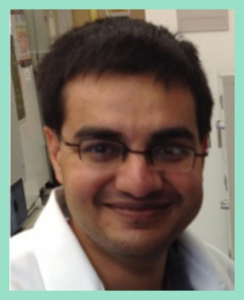 Dr. Parekh is a pediatric hematologist oncologist and physician scientist with a basic science and translational research focus in T-cell development and leukemia. His clinical expertise is in pediatric leukemias, in particular T-cell acute lymphoblastic leukemia. The goals of his laboratory are to define the mechanisms underlying normal human T-cell development and T-cell leukemias and translate these biology insights into the development of new immunotherapy approaches for cancer and novel therapies for T-cell acute lymphoblastic leukemia. Through the integration of next generation sequencing studies of primary human hematopoietic progenitor cells and functional studies in human T-cell differentiation models, Dr.Parekh’s laboratory has defined the role of the transcription factor BCL11B as an essential regulator of the initial stages of human T-cell development and mapped the long non-coding RNA transcriptome during the earliest stages of human T-cell development. His laboratory is now applying these insights about human T-cell biology to the delineation of mechanisms underlying T-cell leukemogenesis and the development of approaches to enhance T-cell reconstitution following hematopoietic stem cell transplantation.
Dr. Parekh is a pediatric hematologist oncologist and physician scientist with a basic science and translational research focus in T-cell development and leukemia. His clinical expertise is in pediatric leukemias, in particular T-cell acute lymphoblastic leukemia. The goals of his laboratory are to define the mechanisms underlying normal human T-cell development and T-cell leukemias and translate these biology insights into the development of new immunotherapy approaches for cancer and novel therapies for T-cell acute lymphoblastic leukemia. Through the integration of next generation sequencing studies of primary human hematopoietic progenitor cells and functional studies in human T-cell differentiation models, Dr.Parekh’s laboratory has defined the role of the transcription factor BCL11B as an essential regulator of the initial stages of human T-cell development and mapped the long non-coding RNA transcriptome during the earliest stages of human T-cell development. His laboratory is now applying these insights about human T-cell biology to the delineation of mechanisms underlying T-cell leukemogenesis and the development of approaches to enhance T-cell reconstitution following hematopoietic stem cell transplantation.
Rebecka Peebles
 Dr. Peebles is an Assistant Professor in the Craig Dalsimer Division of Adolescent Medicine at Children’s Hospital Of Philadelphia (CHOP) and Perelman School of Medicine at The University of Pennsylvania. She received her medical degree from Case Western Reserve University School of Medicine, completed her training in pediatrics at The Cleveland Clinic Foundation, and her adolescent medicine fellowship at Stanford University School of Medicine. She is board certified in pediatrics and further specialty certified in adolescent and young adult medicine, and serves as the Director of Research and Quality Innovations in the Eating Disorder Assessment and Treatment Program at CHOP. Her clinical and research expertise is in working with patients with eating disordered behaviors, across the weight spectrum. She has worked exclusively with youth and young adults with disordered eating for the past twenty years, and has expertise in their medical evaluation and treatment. She is the Primary Investigator on both a federally funded study investigating associations between weight change during eating disorder treatment and bone architecture, body composition, and metabolic health, and another foundation-funded study that is focused on the development of online interventions to assist primary care providers in evidence-based treatment of eating disorders. She was previously funded by the American Heart Association National Scientist Development Award to study the metabolic complications of binge eating and purging behaviors. She has also developed, managed, and evaluated quality improvement systems in eating disorders both at Lucile Packard Children’s Hospital at Stanford University, and now at CHOP, helping to standardize medical and psychiatric protocols of care and improve short and long-term outcomes. She has served as the Medical Safety Officer in four funded trials involving cognitive remediation therapy, cognitive behavioral therapy, and family based treatments that target eating disorders. Her publications have focused on eating disorders and their medical complications in children and adolescents. She has especially focused her work on populations previously less well-characterized, such as young children, males, patients in larger bodies, and pro-eating disorder website users.
Dr. Peebles is an Assistant Professor in the Craig Dalsimer Division of Adolescent Medicine at Children’s Hospital Of Philadelphia (CHOP) and Perelman School of Medicine at The University of Pennsylvania. She received her medical degree from Case Western Reserve University School of Medicine, completed her training in pediatrics at The Cleveland Clinic Foundation, and her adolescent medicine fellowship at Stanford University School of Medicine. She is board certified in pediatrics and further specialty certified in adolescent and young adult medicine, and serves as the Director of Research and Quality Innovations in the Eating Disorder Assessment and Treatment Program at CHOP. Her clinical and research expertise is in working with patients with eating disordered behaviors, across the weight spectrum. She has worked exclusively with youth and young adults with disordered eating for the past twenty years, and has expertise in their medical evaluation and treatment. She is the Primary Investigator on both a federally funded study investigating associations between weight change during eating disorder treatment and bone architecture, body composition, and metabolic health, and another foundation-funded study that is focused on the development of online interventions to assist primary care providers in evidence-based treatment of eating disorders. She was previously funded by the American Heart Association National Scientist Development Award to study the metabolic complications of binge eating and purging behaviors. She has also developed, managed, and evaluated quality improvement systems in eating disorders both at Lucile Packard Children’s Hospital at Stanford University, and now at CHOP, helping to standardize medical and psychiatric protocols of care and improve short and long-term outcomes. She has served as the Medical Safety Officer in four funded trials involving cognitive remediation therapy, cognitive behavioral therapy, and family based treatments that target eating disorders. Her publications have focused on eating disorders and their medical complications in children and adolescents. She has especially focused her work on populations previously less well-characterized, such as young children, males, patients in larger bodies, and pro-eating disorder website users.
Eric Peeples

Eric Peeples, MD is a neonatologist and Assistant Professor in the Department of Pediatrics at the University of Nebraska Medical Center in Omaha, Nebraska. Dr. Peeples is originally from Phoenix, Arizona, but obtained his undergraduate and medical degree from Creighton University in Omaha. He completed his pediatric residency and stayed on as chief resident at Phoenix Children’s Hospital and Maricopa Medical Center in Phoenix, followed by a fellowship in neonatal-perinatal medicine at the University of Washington and Seattle Children’s Hospital in Seattle, Washington. His fellowship research, funded in part by the American Academy of Pediatrics Marshall Klaus Research Award, focused on the assessment of cerebral blood flow and autoregulation in preterm infants and was under the mentorship of Dr. Sandra Juul.
As a member of the faculty at the University of Nebraska Medical Center, the primary research program of Dr. Peeples is pre-clinical and revolves around understanding and modulating the microRNA expression of the brain during and after hypoxic-ischemic encephalopathy in a model of term brain injury. In addition, Dr. Peeples has been leading clinical programs to standardize brain-focused neonatal care throughout the region, including developing and leading a regional registry for infants at risk for neonatal hypoxic-ischemic encephalopathy.
Shahana Perveen
 Dr. Shahana Perveen is an Assistant Professor of Pediatrics/Division of Neonatal perinatal medicine at Zucker School of Medicine, Hofstra/Northwell and an Assistant Investigator at Center for Pediatric Research at Feinstein Institute for Medical Research, Northwell. She received her medical degree from Karachi University, Pakistan. Subsequently, she came to the US and completed residency training in Pediatrics at New York Medical College/Metropolitan Hospital and fellowship in Neonatal-Perinatal Medicine at North Shore University Hospital.
Dr. Shahana Perveen is an Assistant Professor of Pediatrics/Division of Neonatal perinatal medicine at Zucker School of Medicine, Hofstra/Northwell and an Assistant Investigator at Center for Pediatric Research at Feinstein Institute for Medical Research, Northwell. She received her medical degree from Karachi University, Pakistan. Subsequently, she came to the US and completed residency training in Pediatrics at New York Medical College/Metropolitan Hospital and fellowship in Neonatal-Perinatal Medicine at North Shore University Hospital.
Her research focus is preventing lung injury and promoting pulmonary angiogenesis. She is actively working on prenatal intervention in CDH rat models to promote angiogenesis and lung growth to improve overall mortality and morbidity associated with this rare congenital disease. Based on her work she received the Innovation Award from Advancing Women in Medicine and Science from Feinstein Institute of Medical Research in May 2019.
In addition to her basic science research, she developed and now leads the Quality Improvement Group and supervises several projects led by fellows, NNPs and faculty to reduce the incidence of BPD in the NICU. She is also PI and sub PI in international multicenter clinical trials. She is a mentor and actively involved in teaching fellow, residents and NNPs. She is also recipient of Excellence in teaching award multiple time.
Amy Peterson
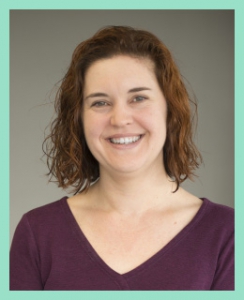 Dr. Peterson is an Associate Professor of Pediatrics at the University of Wisconsin School of Medicine and Public Health in Madison WI. She is a board certified pediatric cardiologist and is one of the few pediatric-trained physicians who also holds certification as a Clinical Lipidologist from the American Board of Clinical Lipidology. She is the founder and director of UW’s Pediatric Preventive Cardiology Clinics program, which focuses on diagnosis and treatment of cholesterol disorders in children. She actively supervises five regional prevention clinics.
Dr. Peterson is an Associate Professor of Pediatrics at the University of Wisconsin School of Medicine and Public Health in Madison WI. She is a board certified pediatric cardiologist and is one of the few pediatric-trained physicians who also holds certification as a Clinical Lipidologist from the American Board of Clinical Lipidology. She is the founder and director of UW’s Pediatric Preventive Cardiology Clinics program, which focuses on diagnosis and treatment of cholesterol disorders in children. She actively supervises five regional prevention clinics.
Her primary research is focused on implementation of pediatric lipid screening to improve diagnosis rates for genetic dyslipidemia in children and their families. To aid in this, she has developed educational initiatives and worked with electronic medical records to facilitate order entry, interpretation of labs, obtain consultations, and track outcomes of cholesterol screening. She also conducts research in diagnosis and risk stratification to guide treatment decisions in children with severe cholesterol disorders.
Elizabeth Powell
 Elizabeth Powell, MD, MPH is a pediatric emergency medicine physician with training in epidemiology; her research interests include injury epidemiology and acute care delivery. She has supervised the conduct of single site and multicenter clinical trials in the emergency department with the goal of improving acute care delivery to children. Her injury work has included unintentional and intentional injuries, review of local data and analysis of national data, and descriptive and intervention studies. Her research in injury epidemiology has followed several themes: infant injuries and injuries related to infant products, injuries related to sporting equipment, and injuries related to firearms. Several projects have focused on urban youth and their families: the use of pictures to teach injury prevention to families with low literacy, an analysis of urban playgrounds, and a description of pediatric window falls. Her clinical research includes disease processes treated in the pediatric emergency department (ie. gastrointestinal illness, sickle cell disease, asthma) in addition to injuries. She was a site principal investigator in the Pediatric Emergency Care Applied Research Network (PECARN) from 2005-2019. She was an active collaborator in multiple projects focused on emergency care delivery including the development of clinical decision rules for the management of children with head trauma and cervical spine trauma.
Elizabeth Powell, MD, MPH is a pediatric emergency medicine physician with training in epidemiology; her research interests include injury epidemiology and acute care delivery. She has supervised the conduct of single site and multicenter clinical trials in the emergency department with the goal of improving acute care delivery to children. Her injury work has included unintentional and intentional injuries, review of local data and analysis of national data, and descriptive and intervention studies. Her research in injury epidemiology has followed several themes: infant injuries and injuries related to infant products, injuries related to sporting equipment, and injuries related to firearms. Several projects have focused on urban youth and their families: the use of pictures to teach injury prevention to families with low literacy, an analysis of urban playgrounds, and a description of pediatric window falls. Her clinical research includes disease processes treated in the pediatric emergency department (ie. gastrointestinal illness, sickle cell disease, asthma) in addition to injuries. She was a site principal investigator in the Pediatric Emergency Care Applied Research Network (PECARN) from 2005-2019. She was an active collaborator in multiple projects focused on emergency care delivery including the development of clinical decision rules for the management of children with head trauma and cervical spine trauma.
Kathleen Powis

No biography provided.
Jay Pruetz
 Dr. Jay D. Pruetz is Associate Professor of Clinical Pediatrics and Clinical Obstetrics & Gynecology at the USC Keck School of Medicine and Director of the Fetal Cardiology Program at Children’s Hospital Los Angeles (CHLA). He attended Tufts Medical School where he graduated Alpha Omega Alpha in 2001 then completed pediatric residency at Cedars Sinai Medical Center in 2004 and cardiology fellowship at CHLA in 2008. Dr. Pruetz is board certified in pediatric cardiology and works actively in the field of prenatal detection and pre-term management of fetuses with congenital heart disease (CHD). As a cardiologist he also continues to care for these children long after their heart surgery into adulthood. Dr. Pruetz has dedicated himself to training cardiologists, obstetricians and sonographers in the science of prenatal detection of CHD through hands on fetal echocardiography training, specialized fellowship rotations, national lectureships and the development of the first ever prenatal heart disease detection symposium at CHLA later this year. He also works closely with the Fetal Maternal Center (FMC) and Los Angeles Fetal Surgery Program to care for fetuses diagnosed with congenital malformations. This collaboration provides him the unique opportunity to study outcomes in babies with critical heart lesions, research interventions to treat heart disease in-utero and develop new strategies to improve perinatal management. All of these efforts will hopefully lead to increased prenatal detection rates of CHD, improved patient outcomes and the development of better fetal therapies for our most complex patients.
Dr. Jay D. Pruetz is Associate Professor of Clinical Pediatrics and Clinical Obstetrics & Gynecology at the USC Keck School of Medicine and Director of the Fetal Cardiology Program at Children’s Hospital Los Angeles (CHLA). He attended Tufts Medical School where he graduated Alpha Omega Alpha in 2001 then completed pediatric residency at Cedars Sinai Medical Center in 2004 and cardiology fellowship at CHLA in 2008. Dr. Pruetz is board certified in pediatric cardiology and works actively in the field of prenatal detection and pre-term management of fetuses with congenital heart disease (CHD). As a cardiologist he also continues to care for these children long after their heart surgery into adulthood. Dr. Pruetz has dedicated himself to training cardiologists, obstetricians and sonographers in the science of prenatal detection of CHD through hands on fetal echocardiography training, specialized fellowship rotations, national lectureships and the development of the first ever prenatal heart disease detection symposium at CHLA later this year. He also works closely with the Fetal Maternal Center (FMC) and Los Angeles Fetal Surgery Program to care for fetuses diagnosed with congenital malformations. This collaboration provides him the unique opportunity to study outcomes in babies with critical heart lesions, research interventions to treat heart disease in-utero and develop new strategies to improve perinatal management. All of these efforts will hopefully lead to increased prenatal detection rates of CHD, improved patient outcomes and the development of better fetal therapies for our most complex patients.
Jayashree Ramasethu
 Dr. Jayashree Ramasethu completed her medical and Pediatric Residency training at the Christian Medical College, Vellore, India. She trained in Neonatology at the Westmead Hospital, Sydney, Australia and at Children’s National Medical Center in Washington, DC. She is currently Professor of Clinical Pediatrics, Georgetown University Medical Center and MedStar Georgetown University Hospital.
Dr. Jayashree Ramasethu completed her medical and Pediatric Residency training at the Christian Medical College, Vellore, India. She trained in Neonatology at the Westmead Hospital, Sydney, Australia and at Children’s National Medical Center in Washington, DC. She is currently Professor of Clinical Pediatrics, Georgetown University Medical Center and MedStar Georgetown University Hospital.
Dr. Ramasethu’s interests are in antibiotic stewardship, and in Global Neonatal Health, specifically in improving quality of care in health care facilities in low and middle income countries.
Meenakshi Rao
 Dr. Rao is a physician-scientist trained in neuroscience and pediatric gastroenterology who has focused her research program on understanding the functional organization of the enteric nervous system (ENS), the intrinsic nervous system of the digestive tract. The overarching scientific goal of her work is to determine how the neurons and glial cells of the ENS detect and integrate information to modulate autonomic behaviors, including gastrointestinal motility, mucosal immune responses, and metabolic homeostasis. Understanding how local enteric circuits regulate these processes will elucidate how ENS dysfunction contributes to a wide variety of digestive and metabolic disorders.
Dr. Rao is a physician-scientist trained in neuroscience and pediatric gastroenterology who has focused her research program on understanding the functional organization of the enteric nervous system (ENS), the intrinsic nervous system of the digestive tract. The overarching scientific goal of her work is to determine how the neurons and glial cells of the ENS detect and integrate information to modulate autonomic behaviors, including gastrointestinal motility, mucosal immune responses, and metabolic homeostasis. Understanding how local enteric circuits regulate these processes will elucidate how ENS dysfunction contributes to a wide variety of digestive and metabolic disorders.
Sarah Reeves
 Dr. Reeves’ research seeks to identify and reduce health disparities among children with chronic conditions. Much of her work has focused on a specific vulnerable population – children with sickle cell disease (SCD). Current research topics include the use of administrative claims to assess the quality of care received by children with SCD, specifically, stroke prevention efforts, antibiotic prophylaxis, and daily pain prevention. In her research, she uses a wide variety of methodologies to investigate research questions from multiple levels. This results in multidisciplinary research that ties together research methods, statistical approaches, and clinical implications. For example, she uses longitudinal data methods to assess trends over time in the receipt of preventive care. She also links data across multiple sources to enable novel methods to investigate a research question. She has identified barriers to the receipt of preventive care among children with SCD using a wide array of data sources, such as state Medicaid data, national Medicaid data, newborn screening records, electronic health records, health insurance plans, and statewide immunization registries. This multi-level approach is important, as many of the barriers that face children living with chronic conditions today are multifaceted.
Dr. Reeves’ research seeks to identify and reduce health disparities among children with chronic conditions. Much of her work has focused on a specific vulnerable population – children with sickle cell disease (SCD). Current research topics include the use of administrative claims to assess the quality of care received by children with SCD, specifically, stroke prevention efforts, antibiotic prophylaxis, and daily pain prevention. In her research, she uses a wide variety of methodologies to investigate research questions from multiple levels. This results in multidisciplinary research that ties together research methods, statistical approaches, and clinical implications. For example, she uses longitudinal data methods to assess trends over time in the receipt of preventive care. She also links data across multiple sources to enable novel methods to investigate a research question. She has identified barriers to the receipt of preventive care among children with SCD using a wide array of data sources, such as state Medicaid data, national Medicaid data, newborn screening records, electronic health records, health insurance plans, and statewide immunization registries. This multi-level approach is important, as many of the barriers that face children living with chronic conditions today are multifaceted.
Kenneth Remy
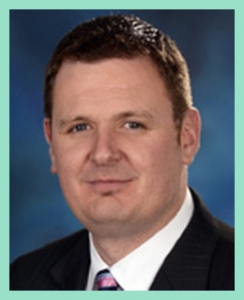 Dr. Kenneth Remy graduated with a medical degree from Jefferson Medical College and then completed a dual residency in Internal Medicine-Pediatrics at Case Western University in Cleveland. After that, he completed his first fellowship in Pediatric Critical Care at Columbia University. At Columbia, he joined the laboratory of Dr. Charles Emala, and co-discovered a novel family of calcium-activated chloride channels in human airway smooth muscle. He next transitioned to the National Institutes of Health to complete his second and third fellowship training in adult critical care and a postdoctoral research fellowship. At the NIH, Dr. Remy began his research career in Sepsis-Host Inflammation with mentorship by Drs. Charles Natanson and Peter Eichacker. At the NIH, his dual mentorship plan explored two separate sepsis models to optimize understanding of disease physiology and potential therapeutics. This exploration included understanding the pathogenesis and therapeutic interventions of septic shock and host inflammation in canines using anthrax immunomodulation and evaluating the storage age of RBC transfusions in S. aureus pneumonia. Additionally, during his postdoctoral research fellowship at the NIH, he further refined his career goals to focus on the effects of hemolysis from RBC transfusions or similar mechanisms [extracorporeal therapeutics such as continuous renal replacement therapy (CRRT) or extracorporeal membrane oxygenation (ECMO)] on host inflammation responses, including disturbances in heme and iron metabolism. After completing a Clinical Research Certificate Program at the NIH and a Master of Health Sciences in Clinical Research at Duke University, he transitioned to open his laboratory and become faculty in the Departments of Pediatrics, Medicine, and Anesthesiology at Washington University in St. Louis. At Washington University, Dr. Remy is mentored by Drs. Allan Doctor and Richard Hotchkiss with support from both Department of Pediatrics Chair Dr. Gary Silverman (formerly Dr. Alan Schwartz) and Division of Pediatric Critical Care director Dr. Julianne Bubeck-Wardenburg. He is a quadruple boarded (Pediatrics, Internal Medicine, Adult Critical Care Medicine, Pediatric Critical Care Medicine) physician-scientist at Washington University.
Dr. Kenneth Remy graduated with a medical degree from Jefferson Medical College and then completed a dual residency in Internal Medicine-Pediatrics at Case Western University in Cleveland. After that, he completed his first fellowship in Pediatric Critical Care at Columbia University. At Columbia, he joined the laboratory of Dr. Charles Emala, and co-discovered a novel family of calcium-activated chloride channels in human airway smooth muscle. He next transitioned to the National Institutes of Health to complete his second and third fellowship training in adult critical care and a postdoctoral research fellowship. At the NIH, Dr. Remy began his research career in Sepsis-Host Inflammation with mentorship by Drs. Charles Natanson and Peter Eichacker. At the NIH, his dual mentorship plan explored two separate sepsis models to optimize understanding of disease physiology and potential therapeutics. This exploration included understanding the pathogenesis and therapeutic interventions of septic shock and host inflammation in canines using anthrax immunomodulation and evaluating the storage age of RBC transfusions in S. aureus pneumonia. Additionally, during his postdoctoral research fellowship at the NIH, he further refined his career goals to focus on the effects of hemolysis from RBC transfusions or similar mechanisms [extracorporeal therapeutics such as continuous renal replacement therapy (CRRT) or extracorporeal membrane oxygenation (ECMO)] on host inflammation responses, including disturbances in heme and iron metabolism. After completing a Clinical Research Certificate Program at the NIH and a Master of Health Sciences in Clinical Research at Duke University, he transitioned to open his laboratory and become faculty in the Departments of Pediatrics, Medicine, and Anesthesiology at Washington University in St. Louis. At Washington University, Dr. Remy is mentored by Drs. Allan Doctor and Richard Hotchkiss with support from both Department of Pediatrics Chair Dr. Gary Silverman (formerly Dr. Alan Schwartz) and Division of Pediatric Critical Care director Dr. Julianne Bubeck-Wardenburg. He is a quadruple boarded (Pediatrics, Internal Medicine, Adult Critical Care Medicine, Pediatric Critical Care Medicine) physician-scientist at Washington University.
Dr. Remy’s Laboratory is focused on elucidating and identifying mechanisms in sepsis (adult and pediatric) that cause host immune dysregulation. With this understanding these mechanisms will enhance current understanding of host innate and adaptive immune responses in sepsis and enable the application and identification of potential targets for disease intervention including the use of immunoadjuvants. As such, Dr. Remy’s current body of work explores two areas: heme-based trafficking and signaling in immune dysregulation in context of diseases of intravascular hemolysis (sepsis, malaria, sickle cell disease, thalassemia) and after red blood cell transfusion; and real time immunophenotyping of pro and hypoinflammatory states to identify timing for immunoadjuvant therapies.
As an independent investigator, Dr. Remy is an NIH funded investigator that more specifically evaluates whether free heme functions as a danger-associated molecular pattern (DAMP) that alters host immune function using a mechanistic murine sepsis model and in a multicenter pediatric sepsis and trauma study (Remy/Doctor). As such his Independent laboratory is the first to discover the immunosuppressive activity of heme upon septic and healthy humans, and in animal models. Additionally, he investigates novel immunoadjuvant therapies for sepsis in adults and children including the use of IL-7 and PD-L1 (Remy/Hotchkiss). These two platforms can be translated directly to hemolytic diseases including sickle cell disease, acute malarial infection, atherosclerotic disease, and cancer; and have allowed him to be actively engaged in related-focus areas for research in global health. For his work, he has been awarded fellowship into the Society of Critical Care Medicine (SCCM), an American Thoracic Society Career Award, A SCCM-Weil Young Investigator grant, and a Master of Science in Clinical Investigation with immunology-translational focus from Washington University. He is the current SCCM Research Section basic and translational science chair and the Pediatric Acute Lung Injury and Sepsis Investigators Bloodnet Immunology Section Chair. Dr. Remy is very excited to be a part of SPR and actively engage with the Pediatric Academic Society.
Henry Roane
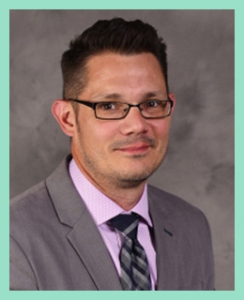 Dr. Henry Roane received his Ph.D. in Psychology with an emphasis in Applied Behavior Analysis from Louisiana State University. He completed a pre-doctoral internship at the Kennedy Krieger Institute and the Johns Hopkins University School of Medicine. Dr. Roane has held previous clinical and faculty positions at the Marcus Institute/Emory University School of Medicine and the Munroe-Meyer Institute/University of Nebraska Medical Center. At present, Dr. Roane is the Gregory S. Liptak MD Professor of Child Development in the Department of Pediatrics at Upstate Medical University in Syracuse NY. In this capacity, Dr. Roane serves as the Chief of the Division of Development, Behavior and Genetics where he directs medical and behavior analysis clinics that provide treatment services for children affected by autism and related disorders. Dr. Roane is also the Chair of the Behavior Analysis Studies program in the College of Health Professions at Upstate.
Dr. Henry Roane received his Ph.D. in Psychology with an emphasis in Applied Behavior Analysis from Louisiana State University. He completed a pre-doctoral internship at the Kennedy Krieger Institute and the Johns Hopkins University School of Medicine. Dr. Roane has held previous clinical and faculty positions at the Marcus Institute/Emory University School of Medicine and the Munroe-Meyer Institute/University of Nebraska Medical Center. At present, Dr. Roane is the Gregory S. Liptak MD Professor of Child Development in the Department of Pediatrics at Upstate Medical University in Syracuse NY. In this capacity, Dr. Roane serves as the Chief of the Division of Development, Behavior and Genetics where he directs medical and behavior analysis clinics that provide treatment services for children affected by autism and related disorders. Dr. Roane is also the Chair of the Behavior Analysis Studies program in the College of Health Professions at Upstate.
Dr. Roane is the Editor-in-Chief of Behavioral Development, an academic journal published by the American Psychological Association. He is a current Associate Editor for the Journal of Developmental and Physical Disabilities, a former Associate Editor for the Journal of Applied Behavior Analysis and Behavior Analysis in Practice, and serves on the Editorial Boards of several journals in the field of behavior analysis and pediatrics, including the Journal of Pediatrics. Dr. Roane serves on the Board of Directors for the Society for the Experimental Analysis of Behavior, and he has previously served on the Board of Directors for the Behavior Analysis Certification Board and the Association of Professional Behavior Analysts. Dr. Roane has co-authored over 90 research articles and chapters as well as several academic texts on the assessment and treatment of behavior disorders in children with autism and related disorders. He also has been the principle investigator on grants funded by National Institute of Health and the New York State Department of Health and serves as a consultant to programs nationwide. He is a Fellow of the Association for Behavior Analysis – International. In 2018, Dr. Roane received the State University of New York Chancellor’s Award for Excellence in Faculty Service.
Jonathan Roberts
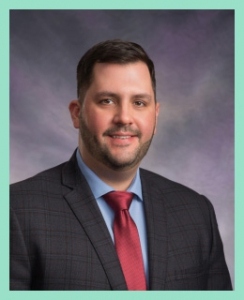 Jonathan C. Roberts, MD is the Associate Medical Director and Associate Research Director at the Bleeding & Clotting Disorders Institute (BCDI) and Assistant Professor of Pediatrics at the University of Illinois College of Medicine at Peoria in Peoria, IL, USA. Dr. Roberts graduated from the Southern Illinois School of Medicine in 2008 and completed his internship and residency in Pediatrics at the University of Illinois College of Medicine at Peoria at OSF St. Francis Children’s Hospital in 2011. After finishing his residency, Dr. Roberts completed fellowship in Pediatric Hematology/Oncology/Blood & Marrow Transplantation at the Medical College of Wisconsin/Children’s Hospital of Wisconsin in 2014, and worked as a post-doctoral fellow under Dr. Robert Montgomery and Dr. Joan Cox Gill at the BloodCenter of Wisconsin Blood Research Institute. Dr. Roberts’ research areas of interest are in advancing novel laboratory assay development to improve the diagnosis of von Willebrand Disease and to enhance individualized clinical management of hemophilia. He has received numerous young investigator research awards, has over 20 peer-reviewed research publications and abstracts including lead author publications in Blood and the New England Journal of Medicine, and has had grant funding from the National Hemophilia Foundation, World Federation of Hemophilia, and NIH among others. Dr. Roberts has a personal passion for the bleeding disorders community as he is also an individual with severe hemophilia A.
Jonathan C. Roberts, MD is the Associate Medical Director and Associate Research Director at the Bleeding & Clotting Disorders Institute (BCDI) and Assistant Professor of Pediatrics at the University of Illinois College of Medicine at Peoria in Peoria, IL, USA. Dr. Roberts graduated from the Southern Illinois School of Medicine in 2008 and completed his internship and residency in Pediatrics at the University of Illinois College of Medicine at Peoria at OSF St. Francis Children’s Hospital in 2011. After finishing his residency, Dr. Roberts completed fellowship in Pediatric Hematology/Oncology/Blood & Marrow Transplantation at the Medical College of Wisconsin/Children’s Hospital of Wisconsin in 2014, and worked as a post-doctoral fellow under Dr. Robert Montgomery and Dr. Joan Cox Gill at the BloodCenter of Wisconsin Blood Research Institute. Dr. Roberts’ research areas of interest are in advancing novel laboratory assay development to improve the diagnosis of von Willebrand Disease and to enhance individualized clinical management of hemophilia. He has received numerous young investigator research awards, has over 20 peer-reviewed research publications and abstracts including lead author publications in Blood and the New England Journal of Medicine, and has had grant funding from the National Hemophilia Foundation, World Federation of Hemophilia, and NIH among others. Dr. Roberts has a personal passion for the bleeding disorders community as he is also an individual with severe hemophilia A.
Lazaro Sanchez-Pinto

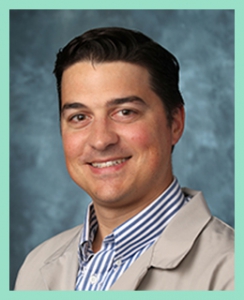 Dr. L. Nelson Sanchez-Pinto is a pediatric critical care physician, biomedical informatics specialist, and clinical data scientist. He graduated from medical school at the Autonomous University of Barcelona in 2006, and then completed a Pediatrics residency program at Cincinnati Children’s Hospital Medical Center in 2011 and a fellowship in Pediatric Critical Care Medicine at Children’s Hospital Los Angeles (CHLA) in 2014. He obtained advanced fellowship training in informatics and data science research also at CHLA and completed a Masters of Biomedical Informatics program at Oregon Health & Science University in 2015. He then joined The University of Chicago as a faculty member where he obtained a KL2 Career Development Award. He later joined the faculty in the Departments of Pediatric and Preventive Medicine at Northwestern University Feinberg School of Medicine and Ann & Robert H. Lurie Children’s Hospital of Chicago in 2017. In 2019 he was invested in the endowed Bernard L. Mirkin PhD MD Research Scholar position at the Stanley Manne Children’s Research Institute. Dr. Sanchez-Pinto is interested in discovering and evaluating data-driven phenotypes of critical illness by integrating clinical, physiologic, and multi-omics data. Dr. Sanchez-Pinto is particularly interested in developing data-driven approaches to study the complex interactions between the host response, the gut and lung microbiomes, and other clinical and genetic factors in patients with sepsis, acute respiratory distress syndrome (ARDS), and multiple organ dysfunction syndrome (MODS). His ultimate goal is to discover subgroups of patients who have similar phenotypes –and potentially similar response to targeted therapy– in order to develop a personalized approach to critical illness. Dr. Sanchez-Pinto was one of the first pediatric critical care physicians to obtain a board certification in clinical informatics and the first one to be invested as a Fellow of the American Medical Informatics Association.
Dr. L. Nelson Sanchez-Pinto is a pediatric critical care physician, biomedical informatics specialist, and clinical data scientist. He graduated from medical school at the Autonomous University of Barcelona in 2006, and then completed a Pediatrics residency program at Cincinnati Children’s Hospital Medical Center in 2011 and a fellowship in Pediatric Critical Care Medicine at Children’s Hospital Los Angeles (CHLA) in 2014. He obtained advanced fellowship training in informatics and data science research also at CHLA and completed a Masters of Biomedical Informatics program at Oregon Health & Science University in 2015. He then joined The University of Chicago as a faculty member where he obtained a KL2 Career Development Award. He later joined the faculty in the Departments of Pediatric and Preventive Medicine at Northwestern University Feinberg School of Medicine and Ann & Robert H. Lurie Children’s Hospital of Chicago in 2017. In 2019 he was invested in the endowed Bernard L. Mirkin PhD MD Research Scholar position at the Stanley Manne Children’s Research Institute. Dr. Sanchez-Pinto is interested in discovering and evaluating data-driven phenotypes of critical illness by integrating clinical, physiologic, and multi-omics data. Dr. Sanchez-Pinto is particularly interested in developing data-driven approaches to study the complex interactions between the host response, the gut and lung microbiomes, and other clinical and genetic factors in patients with sepsis, acute respiratory distress syndrome (ARDS), and multiple organ dysfunction syndrome (MODS). His ultimate goal is to discover subgroups of patients who have similar phenotypes –and potentially similar response to targeted therapy– in order to develop a personalized approach to critical illness. Dr. Sanchez-Pinto was one of the first pediatric critical care physicians to obtain a board certification in clinical informatics and the first one to be invested as a Fellow of the American Medical Informatics Association.
Augusto Schmidt
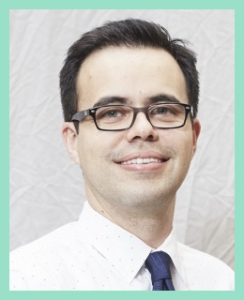 Dr. Schmidt graduated from medical school in Brazil, where he also completed his graduate research on the effects of antenatal therapies on lung vascular development in animal models of congenital diaphragmatic hernia. He then completed his residency and fellowship at Cincinnati Children’s Hospital Medical Center. During this time he developed his interest for perinatal brain injury and demonstrated the presence of brain inflammation in a rhesus macaque model of chorioamnionitis. After completing his fellowship he joined the faculty at Cincinnati Children’s Hospital to continue his studies on the effects of prenatal inflammation and antenatal corticosteroids in lung and brain development. He also pursued a graduate certificate in bioinformatics, which became an important tool in his research. Recently, Dr. Schmidt joined the faculty at the University of Miami and is continuing to pursue his interest in the link between neonatal brain and lung injury. His research efforts are now focused in understanding the mechanisms of ventilation-associated brain injury in preterm newborns.
Dr. Schmidt graduated from medical school in Brazil, where he also completed his graduate research on the effects of antenatal therapies on lung vascular development in animal models of congenital diaphragmatic hernia. He then completed his residency and fellowship at Cincinnati Children’s Hospital Medical Center. During this time he developed his interest for perinatal brain injury and demonstrated the presence of brain inflammation in a rhesus macaque model of chorioamnionitis. After completing his fellowship he joined the faculty at Cincinnati Children’s Hospital to continue his studies on the effects of prenatal inflammation and antenatal corticosteroids in lung and brain development. He also pursued a graduate certificate in bioinformatics, which became an important tool in his research. Recently, Dr. Schmidt joined the faculty at the University of Miami and is continuing to pursue his interest in the link between neonatal brain and lung injury. His research efforts are now focused in understanding the mechanisms of ventilation-associated brain injury in preterm newborns.
Sonal Shah
 Dr. Sonal Shah is a graduate of Tufts University, Tufts University School of Medicine and the Tufts University School of Public Health. She trained in Pediatrics at Children’s Hospital of Philadelphia and Pediatric Emergency Medicine at Boston Children’s Hospital. Dr. Shah is currently an Associate Physician in the Division of Emergency Medicine at Boston Children’s Hospital, and an Assistant Professor of Pediatrics and Emergency Medicine at Harvard Medical School. Dr. Shah has established her expertise in the field of pediatric pneumonia. Her research has filled a gap in the understanding of clinical predictors of disease. Her studies have provided clinicians with reliable indicators of pneumonia, and have helped guide the judicious use of chest radiography in children. Most recently, Dr. Shah performed a systematic review and meta-analysis of clinical factors associated with the diagnosis of pneumonia, published in the Journal of the American Medical Association (JAMA) as part of its Rational Clinical Examination series. Her findings regarding the significance of work of breathing and hypoxia have the potential to significantly inform the diagnosis of pneumonia in both the developed world as well as low-resource settings. At this time, Dr. Shah’s research efforts include a large meta-analysis to identify clinical factors associated with the diagnosis of pneumonia in wheezing children, a population in which her prior research suggests the detection of pneumonia is particularly challenging.
Dr. Sonal Shah is a graduate of Tufts University, Tufts University School of Medicine and the Tufts University School of Public Health. She trained in Pediatrics at Children’s Hospital of Philadelphia and Pediatric Emergency Medicine at Boston Children’s Hospital. Dr. Shah is currently an Associate Physician in the Division of Emergency Medicine at Boston Children’s Hospital, and an Assistant Professor of Pediatrics and Emergency Medicine at Harvard Medical School. Dr. Shah has established her expertise in the field of pediatric pneumonia. Her research has filled a gap in the understanding of clinical predictors of disease. Her studies have provided clinicians with reliable indicators of pneumonia, and have helped guide the judicious use of chest radiography in children. Most recently, Dr. Shah performed a systematic review and meta-analysis of clinical factors associated with the diagnosis of pneumonia, published in the Journal of the American Medical Association (JAMA) as part of its Rational Clinical Examination series. Her findings regarding the significance of work of breathing and hypoxia have the potential to significantly inform the diagnosis of pneumonia in both the developed world as well as low-resource settings. At this time, Dr. Shah’s research efforts include a large meta-analysis to identify clinical factors associated with the diagnosis of pneumonia in wheezing children, a population in which her prior research suggests the detection of pneumonia is particularly challenging.
Saba Sheikh
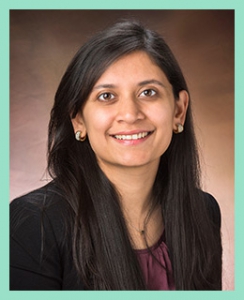 Dr. Sheikh is an assistant professor of Pediatrics in the Division of Pulmonary Medicine and the Cystic Fibrosis Center at the Children’s Hospital of Philadelphia and University of Pennsylvania. Dr. Sheikh is fascinated by the mechanisms of pulmonary disease and enjoys caring for patients with Cystic Fibrosis, Primary Ciliary Dyskinesia and those with end stage lung disease and lung transplantation. Her research expertise includes clinical and translational studies of Cystic Fibrosis (CF) and Cystic Fibrosis Related Diabetes (CFRD). She hopes to deepen understanding of CFRD pathophysiology and the mechanisms underlying CFRD-related pulmonary decline. She investigates the mechanistic links between muscle function, mass, glucose abnormalities and pulmonary function. She is also interested in body composition and exercise physiology as they relate to CF and CFRD.
Dr. Sheikh is an assistant professor of Pediatrics in the Division of Pulmonary Medicine and the Cystic Fibrosis Center at the Children’s Hospital of Philadelphia and University of Pennsylvania. Dr. Sheikh is fascinated by the mechanisms of pulmonary disease and enjoys caring for patients with Cystic Fibrosis, Primary Ciliary Dyskinesia and those with end stage lung disease and lung transplantation. Her research expertise includes clinical and translational studies of Cystic Fibrosis (CF) and Cystic Fibrosis Related Diabetes (CFRD). She hopes to deepen understanding of CFRD pathophysiology and the mechanisms underlying CFRD-related pulmonary decline. She investigates the mechanistic links between muscle function, mass, glucose abnormalities and pulmonary function. She is also interested in body composition and exercise physiology as they relate to CF and CFRD.
Elaine Shelton
 Dr. Shelton is an Assistant Professor of Pediatrics and Pharmacology at Vanderbilt University Medical Center. She completed her PhD in molecular and developmental biology at Cincinnati Children’s Hospital Medical Center (2008). She then completed a postdoctoral fellowship at Vanderbilt in 2013 before joining the Division of Neonatology as a junior faculty member. Dr. Shelton’s research interests center on understanding the molecular, genetic, and biomechanical regulation of an essential fetal blood vessel, the ductus arteriosus (DA). The Shelton laboratory focuses on identifying factors that set the DA apart from other vessels in the body in the hopes of developing novel DA-specific therapeutics. Furthermore, Dr. Shelton is interested in identifying adverse ductus-related side effects of pharmacological agents that are commonly administered to pregnant mothers or neonatal infants. For these studies, her lab uses a combination of primary cell culture models, high throughput drug screens, cannulated vessel myography assays, and whole animal models to identify factors that constrict or relax the DA.
Dr. Shelton is an Assistant Professor of Pediatrics and Pharmacology at Vanderbilt University Medical Center. She completed her PhD in molecular and developmental biology at Cincinnati Children’s Hospital Medical Center (2008). She then completed a postdoctoral fellowship at Vanderbilt in 2013 before joining the Division of Neonatology as a junior faculty member. Dr. Shelton’s research interests center on understanding the molecular, genetic, and biomechanical regulation of an essential fetal blood vessel, the ductus arteriosus (DA). The Shelton laboratory focuses on identifying factors that set the DA apart from other vessels in the body in the hopes of developing novel DA-specific therapeutics. Furthermore, Dr. Shelton is interested in identifying adverse ductus-related side effects of pharmacological agents that are commonly administered to pregnant mothers or neonatal infants. For these studies, her lab uses a combination of primary cell culture models, high throughput drug screens, cannulated vessel myography assays, and whole animal models to identify factors that constrict or relax the DA.
Andrew South
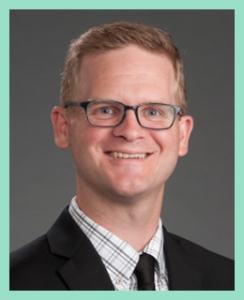 Dr. Andrew M. South is a pediatric nephrologist and physician-scientist with a Master of Epidemiology and Clinical Research at Wake Forest School of Medicine and Brenner Children’s Hospital. His research program is predominantly focused on hypertension and the developmental origins of health and disease. In particular, Dr. South is investigating the early-life origins of hypertension and renal and cardiovascular disease with particular emphasis on the translational applications of the renin-angiotensin system (RAS), especially angiotensin-(1-7), in those diseases. Dr. South is a nationally and internationally recognized expert on the clinical role of the angiotensin-(1-7) pathway in disease and on the specific mechanisms underlying programming of hypertension, renal, and cardiovascular disease in humans. As Principal Investigator, he has received pilot grants from the Wake Forest School of Medicine Cardiovascular Sciences Center and the Clinical and Translational Science Institute to study these topics. Dr. South has joint appointments to the Department of Epidemiology and Prevention and Department of Surgery-Hypertension and Vascular Research to further his research programs and which emphasize his commitment and dedication to team science. Dr. South is passionate about collaboration and utilizing best practices in his research, including in epidemiology, biostatistics, study design, laboratory methods, and clinical translation and implementation. As Director of the Hypertension Clinic at Brenner Children’s Hospital, Dr. South integrates numerous clinical and translational research programs directly with clinical care of children with hypertension. He is the Principal Investigator of the Pediatric Hypertension Registry (NCT03305562), a national multicenter cohort study which he leads, and the PHRAS study (NCT03310684), a prospective cohort study investigating angiotensin-(1-7) as a marker of disease and treatment response in children with primary hypertension, in addition to numerous other studies that he has initiated and leads at Wake Forest. Dr. South is Co-Investigator on an NIH-funded longitudinal birth cohort study of adults born preterm with very low birth weight (the Prenatal Events-Postnatal Consequences study) whose goal is to study the effects of preterm birth on the development of cardiovascular, renal, and metabolic disease mediated by perinatal RAS programming. Dr. South is a Co-Investigator on the NIH-funded SEARCH for Diabetes in Youth Cohort Study and is an active investigator in the Pediatric Nephrology Research Consortium and the Neonatal Kidney Collaborative.
Dr. Andrew M. South is a pediatric nephrologist and physician-scientist with a Master of Epidemiology and Clinical Research at Wake Forest School of Medicine and Brenner Children’s Hospital. His research program is predominantly focused on hypertension and the developmental origins of health and disease. In particular, Dr. South is investigating the early-life origins of hypertension and renal and cardiovascular disease with particular emphasis on the translational applications of the renin-angiotensin system (RAS), especially angiotensin-(1-7), in those diseases. Dr. South is a nationally and internationally recognized expert on the clinical role of the angiotensin-(1-7) pathway in disease and on the specific mechanisms underlying programming of hypertension, renal, and cardiovascular disease in humans. As Principal Investigator, he has received pilot grants from the Wake Forest School of Medicine Cardiovascular Sciences Center and the Clinical and Translational Science Institute to study these topics. Dr. South has joint appointments to the Department of Epidemiology and Prevention and Department of Surgery-Hypertension and Vascular Research to further his research programs and which emphasize his commitment and dedication to team science. Dr. South is passionate about collaboration and utilizing best practices in his research, including in epidemiology, biostatistics, study design, laboratory methods, and clinical translation and implementation. As Director of the Hypertension Clinic at Brenner Children’s Hospital, Dr. South integrates numerous clinical and translational research programs directly with clinical care of children with hypertension. He is the Principal Investigator of the Pediatric Hypertension Registry (NCT03305562), a national multicenter cohort study which he leads, and the PHRAS study (NCT03310684), a prospective cohort study investigating angiotensin-(1-7) as a marker of disease and treatment response in children with primary hypertension, in addition to numerous other studies that he has initiated and leads at Wake Forest. Dr. South is Co-Investigator on an NIH-funded longitudinal birth cohort study of adults born preterm with very low birth weight (the Prenatal Events-Postnatal Consequences study) whose goal is to study the effects of preterm birth on the development of cardiovascular, renal, and metabolic disease mediated by perinatal RAS programming. Dr. South is a Co-Investigator on the NIH-funded SEARCH for Diabetes in Youth Cohort Study and is an active investigator in the Pediatric Nephrology Research Consortium and the Neonatal Kidney Collaborative.
John Spencer
 As a Physician-Scientist at Nationwide Children’s Hospital and The Ohio State University College of Medicine, the objective of Dr. John David Spencer’s research is to define the role of innate immunity and antimicrobial peptides in the regulation and prevention of urinary tract infection (UTI). Specifically, Dr. Spencer’s NIH-funded research focuses on the function and regulation of antimicrobial proteins in the Ribonuclease A Superfamily. His ongoing research has demonstrated that peptides in this family, including Ribonuclease 4, Ribonuclease 6, and Ribonuclease 7, are potent, novel, and may play a critical role in maintaining urinary tract sterility and shielding the urothelium from invading pathogens. These findings are significant because treatment strategies for acute and recurrent UTI are limited. Moreover, antibiotic resistance in pathogenic bacteria is increasing and antibiotics are subsequently becoming less effective. By identifying how antimicrobial peptides promote urinary tract sterility, we can begin to develop therapeutic strategies that leverage the body’s endogenous immune defenses as therapeutic targets for novel UTI treatment and prevention strategies. Also, by studying the structure and function of these endogenous peptides, we can design novel antimicrobials that mimic their structure that overcome the limitations of conventional antibiotics. In addition to Dr. Spencer’s role as a basic science and translational investigator, he is also a practicing Pediatric Nephrologist. Dr. Spencer currently serves as the Division Chief of the Nephrology Division at Nationwide Children’s. In addition to UTI, his clinical interests reside in why children develop urinary tract anomalies and congenital kidney disease (CAKUT). Finally, Dr. Spencer is passionate about training the next generation of clinical Pediatric Nephrologists and Physician-Scientists. He serves as a co-director of the Pediatric Residency Research Pathway at Nationwide Children’s.
As a Physician-Scientist at Nationwide Children’s Hospital and The Ohio State University College of Medicine, the objective of Dr. John David Spencer’s research is to define the role of innate immunity and antimicrobial peptides in the regulation and prevention of urinary tract infection (UTI). Specifically, Dr. Spencer’s NIH-funded research focuses on the function and regulation of antimicrobial proteins in the Ribonuclease A Superfamily. His ongoing research has demonstrated that peptides in this family, including Ribonuclease 4, Ribonuclease 6, and Ribonuclease 7, are potent, novel, and may play a critical role in maintaining urinary tract sterility and shielding the urothelium from invading pathogens. These findings are significant because treatment strategies for acute and recurrent UTI are limited. Moreover, antibiotic resistance in pathogenic bacteria is increasing and antibiotics are subsequently becoming less effective. By identifying how antimicrobial peptides promote urinary tract sterility, we can begin to develop therapeutic strategies that leverage the body’s endogenous immune defenses as therapeutic targets for novel UTI treatment and prevention strategies. Also, by studying the structure and function of these endogenous peptides, we can design novel antimicrobials that mimic their structure that overcome the limitations of conventional antibiotics. In addition to Dr. Spencer’s role as a basic science and translational investigator, he is also a practicing Pediatric Nephrologist. Dr. Spencer currently serves as the Division Chief of the Nephrology Division at Nationwide Children’s. In addition to UTI, his clinical interests reside in why children develop urinary tract anomalies and congenital kidney disease (CAKUT). Finally, Dr. Spencer is passionate about training the next generation of clinical Pediatric Nephrologists and Physician-Scientists. He serves as a co-director of the Pediatric Residency Research Pathway at Nationwide Children’s.
Rachel Stanley
 Rachel Stanley, MD, MHSA is the Division Chief for Emergency Medicine at Nationwide Children’s Hospital and an Associate Professor of Pediatrics at The Ohio State University College of Medicine. Dr. Stanley was educated in her home country of Ireland, receiving her MD equivalent degree at the Royal College of Surgeons in Dublin. After training in Emergency Medicine and Pediatrics in Ireland, she came to the US and did her Pediatrics residency at the University of Connecticut, and completed a Pediatric Emergency Medicine Fellowship at Children’s Hospital in Boston. In 2000, she moved to the University of Michigan, where she served as a faculty member and earned a Masters in Health Services Administration. Dr Stanley has been continuously funded as the principal investigator of the Great Lakes Emergency Medical Services for Children Research Node of the Pediatric Emergency Care Applied Research Network (PECARN) since 2008. PECARN is a research network of 18 children’s hospitals. Nationwide Children’s Hospital is currently a member of the PECARN node that Dr. Stanley leads. She has also served as the Chair of the PECARN Steering Committee. She currently serves on the Ohio Emergency Medical Services for Children state advisory committee and the Central Ohio Trauma System (COTS) Emergency Medical Services (EMS) advisory committee. Dr. Stanley’s research interests include traumatic brain injury, and multi-center clinical trials in pediatric emergency medicine. She also has a strong interest in mentoring and developing the next generation of academic pediatric emergency physicians.
Rachel Stanley, MD, MHSA is the Division Chief for Emergency Medicine at Nationwide Children’s Hospital and an Associate Professor of Pediatrics at The Ohio State University College of Medicine. Dr. Stanley was educated in her home country of Ireland, receiving her MD equivalent degree at the Royal College of Surgeons in Dublin. After training in Emergency Medicine and Pediatrics in Ireland, she came to the US and did her Pediatrics residency at the University of Connecticut, and completed a Pediatric Emergency Medicine Fellowship at Children’s Hospital in Boston. In 2000, she moved to the University of Michigan, where she served as a faculty member and earned a Masters in Health Services Administration. Dr Stanley has been continuously funded as the principal investigator of the Great Lakes Emergency Medical Services for Children Research Node of the Pediatric Emergency Care Applied Research Network (PECARN) since 2008. PECARN is a research network of 18 children’s hospitals. Nationwide Children’s Hospital is currently a member of the PECARN node that Dr. Stanley leads. She has also served as the Chair of the PECARN Steering Committee. She currently serves on the Ohio Emergency Medical Services for Children state advisory committee and the Central Ohio Trauma System (COTS) Emergency Medical Services (EMS) advisory committee. Dr. Stanley’s research interests include traumatic brain injury, and multi-center clinical trials in pediatric emergency medicine. She also has a strong interest in mentoring and developing the next generation of academic pediatric emergency physicians.
Martina Steurer
 Martina Steurer received her medical degree from the University of Zurich in Switzerland. She completed pediatric Residency and Neonatology Fellowship at the Children’s Hospital of Luzerne, Switzerland and her Pediatric Critical Care Fellowship at the University of California San Francisco (UCSF). She received a master’s degree in the methods of clinical research from UCSF. She joined the faculty in the Department of Pediatrics and Epidemiology and Biostatistics at UCSF in 2014.
Martina Steurer received her medical degree from the University of Zurich in Switzerland. She completed pediatric Residency and Neonatology Fellowship at the Children’s Hospital of Luzerne, Switzerland and her Pediatric Critical Care Fellowship at the University of California San Francisco (UCSF). She received a master’s degree in the methods of clinical research from UCSF. She joined the faculty in the Department of Pediatrics and Epidemiology and Biostatistics at UCSF in 2014.
Her research focuses on outcomes of neonates with cardiovascular disease such as pulmonary hypertension and congenital heart disease. She focuses on non-traditional risk factor such as fetal environment, metabolomics, sociodemographic and environmental risk factors and their impact on hospital course and mortality using a variety of large population based and clinical data bases.
Jennifer Sucre
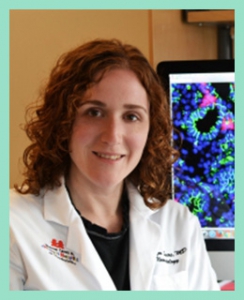 Dr. Sucre received her undergraduate degrees at the University of Georgia and graduated from Harvard Medical School in 2009. She then completed her pediatrics residency at St. Louis Children’s Hospital at Washington University, and neonatal-perinatal medicine Fellowship at Mattel Children’s Hospital at UCLA. In July 2016, Dr. Sucre joined the faculty at Vanderbilt University as an Assistant Professor in Pediatrics. Under the mentorship of Dr. Susan Guttentag and Dr. Timothy Blackwell, Dr. Sucre studies epithelial-mesenchyme interactions in lung development and lung injury. Her overall goal is to understand the molecular mechanisms that promote bronchopulmonary dysplasia, with a goal of developing targeted therapies to restore normal lung development after preterm birth.
Dr. Sucre received her undergraduate degrees at the University of Georgia and graduated from Harvard Medical School in 2009. She then completed her pediatrics residency at St. Louis Children’s Hospital at Washington University, and neonatal-perinatal medicine Fellowship at Mattel Children’s Hospital at UCLA. In July 2016, Dr. Sucre joined the faculty at Vanderbilt University as an Assistant Professor in Pediatrics. Under the mentorship of Dr. Susan Guttentag and Dr. Timothy Blackwell, Dr. Sucre studies epithelial-mesenchyme interactions in lung development and lung injury. Her overall goal is to understand the molecular mechanisms that promote bronchopulmonary dysplasia, with a goal of developing targeted therapies to restore normal lung development after preterm birth.
Francisco Sylvester

Dr. Francisco Sylvester’s laboratory conducts human translational studies. His laboratory has projects to uncover mechanisms behind clinical observations in children with inflammatory bowel diseases (IBD). Dr. Sylvester and his team formulate hypotheses based on these findings, which they test in human samples, mouse models and cell culture systems. Areas of interest include bone health in pediatric IBD and intestinal inflammation and intestinal stem cells. Since his arrival at UNC at the end of October 2014, his laboratory has been developing the following projects: Adult stem cells in intestinal biopsies from children with Crohn disease Stem cells regenerate the normal intestinal and colonic epithelium. Dr. Sylvester collaborates with Drs. Frank McKeon and Wa Xian to isolate, propagate and study intestinal stem cells. The investigator team has observed that intestinal stem cells from biopsies of children with Crohn disease have an abnormal phenotype, which is stable even after multiple passages. This model system of intestinal cells, which can be grown in monolayers in multi-well plates, is well suited to screen for new therapies in the laboratory. Osteoprotegerin (OPG) as part of the innate immune response to infection in the colonic epithelium OPG is an inhibitor of osteoclast formation and development. Dr. Sylvester has discovered that the colonic epithelium expresses OPG robustly. Dr. Sylvester’s team has shown that OPG binds to bacteria and parasite eggs. He hypothesizes that OPG adheres to carbohydrates expressed on the surface of colonic microbes via OPG’s heparin-binding domain. Dr. Sylvester postulates that OPG is an innate opsonin that facilitates phagocytosis by mucosal macrophages. OPG may help to clear microbes that penetrate the colonic lamina propria. Dr. Sylvester has reported that colonic expression of OPG tracks with disease severity of ulcerative colitis. Dr. Sylvester’s laboratory has also demonstrated that mice that lack OPG are resistant to experimental colitis. Consequently, blocking OPG activity in the lumen of the colon may become a new therapeutic strategy to treat colitis in humans. The effects of the Crohn disease microbiome on skeletal development Dr. Sylvester has shown that Crohn disease can affect normal skeletal development and linear growth in children. Children with Crohn disease have significant deficits in bone mineral density, alterations in bone geometry and growth stunting. These abnormalities are present at diagnosis, and may persist despite adequate control of symptoms of inflammation. Dr. Sylvester’s laboratory is investigating if the altered intestinal microbiota present in Crohn disease, affects the activity of bone cells.
Jay Thiagarajah
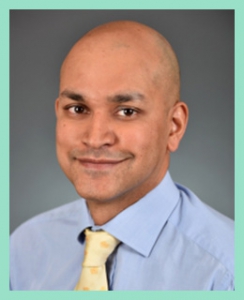 Dr Jay Thiagarajah is a pediatric gastroenterologist and basic and translational research scientist at Boston Children’s Hospital. His major interests revolve around basic research in intestinal epithelial function and mucosal biology, and translational research in diarrheal disorders. Clinically, he sees patients with a wide range of general pediatric gastrointestinal disorders and specializes in the evaluation and management of infants and children with rare genetic enteropathies. The overarching theme of his basic research program is to understand how membrane channels and transporters contribute to immune function, host-microbial symbiosis, and cellular metabolism of the intestinal epithelium. One major project relates to hydrogen peroxide signaling in the intestine and specifically how aquaporin channels and cellular NADPH oxidase enzymes shape intestinal epithelial repair and innate immune function. Other projects investigate how membrane channels form important and conserved regulatory pathways that shape epithelial environmental responses, stem cell function and maintenance of barrier function in the gut. His translational research program investigates the genetics, biology, and clinical management of congenital diarrheal disorders. These are rare but life-threatening diseases that affect infants and are associated with genetic mutations in genes primarily expressed in the intestinal epithelium. The aim of this research is to understand the underlying biology of the genes involved, develop new therapies and optimize management for children with these disorders. Recent advances include development of a novel diagnostic pathway for evaluation of infants with chronic diarrhea, the formation of a clinical program specializing in the diagnosis and management of congenital enteropathies and discovery of novel disease-associated gene variants. A key aspect of the research methodology in the lab, that is integrated into many research projects, is the use of live cell and tissue imaging and the development of novel optical methods for the intestine. This includes the use of ratio-metric probes targeted to different cellular compartments to measure the spatio-temporal dynamics of redox signals, application of recent methods in multiplex and sub-cellular imaging to the intestine, as well as the development of in vivo intestinal tissue imaging methods
Dr Jay Thiagarajah is a pediatric gastroenterologist and basic and translational research scientist at Boston Children’s Hospital. His major interests revolve around basic research in intestinal epithelial function and mucosal biology, and translational research in diarrheal disorders. Clinically, he sees patients with a wide range of general pediatric gastrointestinal disorders and specializes in the evaluation and management of infants and children with rare genetic enteropathies. The overarching theme of his basic research program is to understand how membrane channels and transporters contribute to immune function, host-microbial symbiosis, and cellular metabolism of the intestinal epithelium. One major project relates to hydrogen peroxide signaling in the intestine and specifically how aquaporin channels and cellular NADPH oxidase enzymes shape intestinal epithelial repair and innate immune function. Other projects investigate how membrane channels form important and conserved regulatory pathways that shape epithelial environmental responses, stem cell function and maintenance of barrier function in the gut. His translational research program investigates the genetics, biology, and clinical management of congenital diarrheal disorders. These are rare but life-threatening diseases that affect infants and are associated with genetic mutations in genes primarily expressed in the intestinal epithelium. The aim of this research is to understand the underlying biology of the genes involved, develop new therapies and optimize management for children with these disorders. Recent advances include development of a novel diagnostic pathway for evaluation of infants with chronic diarrhea, the formation of a clinical program specializing in the diagnosis and management of congenital enteropathies and discovery of novel disease-associated gene variants. A key aspect of the research methodology in the lab, that is integrated into many research projects, is the use of live cell and tissue imaging and the development of novel optical methods for the intestine. This includes the use of ratio-metric probes targeted to different cellular compartments to measure the spatio-temporal dynamics of redox signals, application of recent methods in multiplex and sub-cellular imaging to the intestine, as well as the development of in vivo intestinal tissue imaging methods
Andrea Trembath
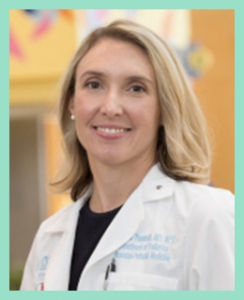
No biography provided.
Omolara Uwemedimo
 Dr. Omolara Thomas Uwemedimo is Assistant Professor of Pediatrics and Occupational Medicine, Epidemiology and Prevention at Zucker School of Medicine at Hofstra/Northwell and co-director of the Community Health and Social Medicine (CHASM) Initiatives in the Office of Academic Affairs at Northwell Health. She is a social justice pediatrician, advocate, professor & researcher who is passionate about health equity for children. Over the past 15 years, she has practiced clinically as a pediatrician in sub-Saharan Africa, Asia and Caribbean and continues to work in New York as an outpatient pediatrician for ethnically-diverse children from low-income backgrounds. As a professor, she has taught over 100 medical, public health and law students at Hofstra University in community, immigrant, and global health. Dr. Uwemedimo has created a wide array of innovative research programs targeted at addressing the health inequities caused by social determinants of health in clinical settings and in the community at-large. To date, she has received nearly $2 million in funding to implement and oversee these programs. In 2013, she became the founding director of GLOhBAL (Global Learning. Optimizing health. Building Alliances Locally) at Cohen Children’s Medical Center of NY. Since then, the program has provided inter-professional research training in global health in Kenya for over 20 medical and public health trainees; In 2016, she started the Social Health Alliance to Promote Equity (SHAPE), a clinic-based model that provides universal screening for families for unmet social needs during healthcare visits, referrals to social services and navigation & follow-up support. Building on this work in 2017, she received funding from the Robert Wood Johnson Foundation to expand SHAPE to partner with community based organizations to target housing insecurity in Queens and Nassau counties. Most recently in 2018, she became the pediatric director of the Hofstra-Northwell Medical Legal Partnership, a program which co-locates lawyers in clinical practices to provide pro-bono poverty and housing legal services. As a researcher, she evaluates how these novel community- clinic partnerships improve child health outcomes, among children in the US and internationally. Dr. Uwemedimo was named a Health Disparities Scholar at the NIH National Institute of Minority Health and Health Disparities and is a Robert Wood Johnson Foundation Clinical Scholars fellow. She is also the recipient of the first Innovative Leadership Award from Child Center of New York, one of the largest non-profits in NY, serving over 30,000 children and families with over 70 programs. She is a staunch advocate for child health equity and serves on the American Academy of Pediatrics (AAP) Immigrant Health Special Interest Group, AAP Immigration Steering Committee and has been an invited speaker on child advocacy, immigration and social medicine across a number of venues including South by Southwest (SXSW), Idaho Voices for Children, Immigration Advocates Network, United Hospital Fund, Greater NY Hospital Association, NY Immigration Coalition, Center for Law and Social Policy and the New York State Pediatric Advocacy Conference.
Dr. Omolara Thomas Uwemedimo is Assistant Professor of Pediatrics and Occupational Medicine, Epidemiology and Prevention at Zucker School of Medicine at Hofstra/Northwell and co-director of the Community Health and Social Medicine (CHASM) Initiatives in the Office of Academic Affairs at Northwell Health. She is a social justice pediatrician, advocate, professor & researcher who is passionate about health equity for children. Over the past 15 years, she has practiced clinically as a pediatrician in sub-Saharan Africa, Asia and Caribbean and continues to work in New York as an outpatient pediatrician for ethnically-diverse children from low-income backgrounds. As a professor, she has taught over 100 medical, public health and law students at Hofstra University in community, immigrant, and global health. Dr. Uwemedimo has created a wide array of innovative research programs targeted at addressing the health inequities caused by social determinants of health in clinical settings and in the community at-large. To date, she has received nearly $2 million in funding to implement and oversee these programs. In 2013, she became the founding director of GLOhBAL (Global Learning. Optimizing health. Building Alliances Locally) at Cohen Children’s Medical Center of NY. Since then, the program has provided inter-professional research training in global health in Kenya for over 20 medical and public health trainees; In 2016, she started the Social Health Alliance to Promote Equity (SHAPE), a clinic-based model that provides universal screening for families for unmet social needs during healthcare visits, referrals to social services and navigation & follow-up support. Building on this work in 2017, she received funding from the Robert Wood Johnson Foundation to expand SHAPE to partner with community based organizations to target housing insecurity in Queens and Nassau counties. Most recently in 2018, she became the pediatric director of the Hofstra-Northwell Medical Legal Partnership, a program which co-locates lawyers in clinical practices to provide pro-bono poverty and housing legal services. As a researcher, she evaluates how these novel community- clinic partnerships improve child health outcomes, among children in the US and internationally. Dr. Uwemedimo was named a Health Disparities Scholar at the NIH National Institute of Minority Health and Health Disparities and is a Robert Wood Johnson Foundation Clinical Scholars fellow. She is also the recipient of the first Innovative Leadership Award from Child Center of New York, one of the largest non-profits in NY, serving over 30,000 children and families with over 70 programs. She is a staunch advocate for child health equity and serves on the American Academy of Pediatrics (AAP) Immigrant Health Special Interest Group, AAP Immigration Steering Committee and has been an invited speaker on child advocacy, immigration and social medicine across a number of venues including South by Southwest (SXSW), Idaho Voices for Children, Immigration Advocates Network, United Hospital Fund, Greater NY Hospital Association, NY Immigration Coalition, Center for Law and Social Policy and the New York State Pediatric Advocacy Conference.
Roy Wade
 The candidate’s career goals are to improve outcomes for children from economically distressed communities by providing the highest quality primary care services; educating medical students, residents, academic fellows, and faculty regarding approaches to trauma informed care; and conducting academic research with a focus on decreasing disparities in health caused by exposure to childhood trauma. His research mission is to 1) improve approaches to the early identification of individuals impacted by significant childhood adversity, 2) advance current understanding of the mechanisms through which childhood stress translate into poor outcomes throughout the life course, and 3) develop evidence-informed pediatric primary care-based approaches to improving outcomes for traumatized children and youth. Dr. Wade’s training as a basic scientist examining respiratory chain physiology of facultative anaerobic bacteria, clinician working with underserved marginalized populations, and healthy policy/public health have uniquely prepared him for this career pathway. The American Academy of Pediatrics (AAP) has encouraged pediatricians to take a leading role in translating childhood adversity research into practice. As a general pediatrician working in an urban economically-distressed community, Dr. Wade recognized that current conceptualizations of childhood adversity did not reflect the life experiences of the families he served and thus current measures of childhood trauma and adversity may lack the sensitivity to accurately correlate phenotypic manifestations of childhood trauma with underlying genotypic changes. Securing a Stoneleigh Foundation early career development award, the candidate’s initial work focused on developing more sensitive childhood adversity measures and promoting the adoption of trauma-informed approaches among health and social service organizations. In conducting this work, Dr. Wade has authored several papers including a qualitative study of adverse childhood experiences amongst urban youth published in Pediatrics in which he found that urban economically distressed youth endorsed a broader set of childhood stressors than those included in the Adverse Childhood Experience (ACE) Study and in many cases used contextually specific language to describe these experiences. In a separate study examining data from a survey of adverse childhood experiences and health outcomes amongst Philadelphia adults published in the journal Child Abuse & Neglect, Dr. Wade found that many of the broader experiences endorsed by young people in his prior qualitative studies were strongly associated with poor health outcomes and certain populations particularly impoverished adults with significant childhood adversity were at increased risk for poor health outcomes such as substance abuse problems and mental disorders. This work received local and national media coverage including stories on National Public Radio and in the Philadelphia Inquirer. Dr. Wade’s research interests also include examining the mechanisms through which significant childhood adversity translate into poor health throughout the life course and negatively impact offspring. Developing effective interventions that improve health outcomes for trauma-impacted children will require an increased focus on clinical and translational research that explore the roles molecular and psychosocial systems play in the persistence of stress-related disparities in human health and strategies for applying this knowledge to practice. Building on basic science research in animal models demonstrating sex-specific influences of parental stress on offspring health, Dr. Wade received a Building Interdisciplinary Research Careers in Women’s Health (BIRCWH) K12 Scholar Mentored-Career Development award to investigate the impact of paternal childhood adversity on offspring health. In previous work, he found evidence for gender-specific exposure to early childhood stressors among clients of children and youth social service organizations. A higher prevalence of adverse childhood experiences among females was correlated with longer stays in residential facilities, an increased number of out of home placements, and lower self-reported health among female respondents. Dr. Wade presented these findings at a Congressional briefing in Washington, DC and at a White House symposium on trauma-informed approaches to supporting girls of color. As part of his BIRCWH project, Dr. Wade used survey responses from the National Longitudinal Study of Adolescent to Adult Health to demonstrate that male offspring born to male respondents who were physically or emotionally abused as children displayed nearly a 2-fold increased risk for developmental, behavioral, and learning problems. Dr. Wade’s current projects include using a case-control study design to sample participants from a representative cohort of children from 31 primary care practices across the Children’s Hospital of Philadelphia Primary Care Network to explore associations between paternal childhood adversity, parenting practices, and offspring behavioral disorders as well as developing and evaluating a primary care-based parenting intervention designed to address the impact of prior exposure to significant childhood adversity on parenting. Through training in basic science and health services research with a focus on community-based interventions, the candidate has acquired the requisite skills to build a successful career as a clinical/translational researcher whose work will ultimately inform treatment/intervention development and health care policy.
The candidate’s career goals are to improve outcomes for children from economically distressed communities by providing the highest quality primary care services; educating medical students, residents, academic fellows, and faculty regarding approaches to trauma informed care; and conducting academic research with a focus on decreasing disparities in health caused by exposure to childhood trauma. His research mission is to 1) improve approaches to the early identification of individuals impacted by significant childhood adversity, 2) advance current understanding of the mechanisms through which childhood stress translate into poor outcomes throughout the life course, and 3) develop evidence-informed pediatric primary care-based approaches to improving outcomes for traumatized children and youth. Dr. Wade’s training as a basic scientist examining respiratory chain physiology of facultative anaerobic bacteria, clinician working with underserved marginalized populations, and healthy policy/public health have uniquely prepared him for this career pathway. The American Academy of Pediatrics (AAP) has encouraged pediatricians to take a leading role in translating childhood adversity research into practice. As a general pediatrician working in an urban economically-distressed community, Dr. Wade recognized that current conceptualizations of childhood adversity did not reflect the life experiences of the families he served and thus current measures of childhood trauma and adversity may lack the sensitivity to accurately correlate phenotypic manifestations of childhood trauma with underlying genotypic changes. Securing a Stoneleigh Foundation early career development award, the candidate’s initial work focused on developing more sensitive childhood adversity measures and promoting the adoption of trauma-informed approaches among health and social service organizations. In conducting this work, Dr. Wade has authored several papers including a qualitative study of adverse childhood experiences amongst urban youth published in Pediatrics in which he found that urban economically distressed youth endorsed a broader set of childhood stressors than those included in the Adverse Childhood Experience (ACE) Study and in many cases used contextually specific language to describe these experiences. In a separate study examining data from a survey of adverse childhood experiences and health outcomes amongst Philadelphia adults published in the journal Child Abuse & Neglect, Dr. Wade found that many of the broader experiences endorsed by young people in his prior qualitative studies were strongly associated with poor health outcomes and certain populations particularly impoverished adults with significant childhood adversity were at increased risk for poor health outcomes such as substance abuse problems and mental disorders. This work received local and national media coverage including stories on National Public Radio and in the Philadelphia Inquirer. Dr. Wade’s research interests also include examining the mechanisms through which significant childhood adversity translate into poor health throughout the life course and negatively impact offspring. Developing effective interventions that improve health outcomes for trauma-impacted children will require an increased focus on clinical and translational research that explore the roles molecular and psychosocial systems play in the persistence of stress-related disparities in human health and strategies for applying this knowledge to practice. Building on basic science research in animal models demonstrating sex-specific influences of parental stress on offspring health, Dr. Wade received a Building Interdisciplinary Research Careers in Women’s Health (BIRCWH) K12 Scholar Mentored-Career Development award to investigate the impact of paternal childhood adversity on offspring health. In previous work, he found evidence for gender-specific exposure to early childhood stressors among clients of children and youth social service organizations. A higher prevalence of adverse childhood experiences among females was correlated with longer stays in residential facilities, an increased number of out of home placements, and lower self-reported health among female respondents. Dr. Wade presented these findings at a Congressional briefing in Washington, DC and at a White House symposium on trauma-informed approaches to supporting girls of color. As part of his BIRCWH project, Dr. Wade used survey responses from the National Longitudinal Study of Adolescent to Adult Health to demonstrate that male offspring born to male respondents who were physically or emotionally abused as children displayed nearly a 2-fold increased risk for developmental, behavioral, and learning problems. Dr. Wade’s current projects include using a case-control study design to sample participants from a representative cohort of children from 31 primary care practices across the Children’s Hospital of Philadelphia Primary Care Network to explore associations between paternal childhood adversity, parenting practices, and offspring behavioral disorders as well as developing and evaluating a primary care-based parenting intervention designed to address the impact of prior exposure to significant childhood adversity on parenting. Through training in basic science and health services research with a focus on community-based interventions, the candidate has acquired the requisite skills to build a successful career as a clinical/translational researcher whose work will ultimately inform treatment/intervention development and health care policy.
Lloyd Werk
 Lloyd N. Werk, MD, MPH has been with Nemours since 1999. He has specific interests in quality improvement interventions, in how information technology can enhance healthcare delivery, and in the prevention of childhood obesity. Dr. Werk’s activities at Nemours are divided among administrative duties, research and quality improvement projects and a clinical role in prevention and management of childhood obesity. For several years, he had worked with Nemours clinicians and researchers in health services research and quality improvement projects as a core member of the Nemours Clinical Management Program. Currently he works in the Nemours Office of Quality and Safety developing systems and measures to help clinicians reach institutional goals in quality and health outcomes with managing the Nemours portfolio of Maintenance of Certification projects. Dr. Werk serves as the Chief of the Divisions of General Academic Pediatrics and Hospital Medicine at Nemours Children’s Hospital (NCH) and directs an integrated multidisciplinary weight management program focusing on the medical, nutritional and psychosocial assessment and management of obesity, as well as its related multiple comorbidities. He extends prevention work beyond the Orlando clinic’s walls and into the community as Director of the Florida Prevention Initiative for central Florida. He has been active in health sciences research and community pediatrics interventions since that time, pioneering this space in Central Florida. Over the past five years, he has been responsible for several active grants dedicated to promoting childhood health and wellness across the Nemours Children’s Health System. As the Department of Pediatrics Vice Chair, Faculty Development and Engagement, he mentors NCH faculty around career growth and promotion. Dr. Werk completed his undergraduate degree at Johns Hopkins University in Baltimore Maryland in 1983. He earned a Doctor of Medicine degree from Tel Aviv University in Tel Aviv, Israel in 1987 and a Master of Public Health degree with concentration in Epidemiology & Biostatistics from Boston University in Boston, Massachusetts in 1999. He completed a pediatric residency at Children’s Hospital of Buffalo in Buffalo, New York, and practiced primary care pediatrics for several years on Long Island, New York, prior to completing a general academic pediatrics fellowship at Boston University in Boston, Massachusetts. Dr. Werk has authored and contributed to several manuscripts, presentations and abstracts related to how patient care delivery can be improved and related to promoting healthy lifestyle changes. He is a Professor of Pediatrics at the University of Central Florida College of Medicine.
Lloyd N. Werk, MD, MPH has been with Nemours since 1999. He has specific interests in quality improvement interventions, in how information technology can enhance healthcare delivery, and in the prevention of childhood obesity. Dr. Werk’s activities at Nemours are divided among administrative duties, research and quality improvement projects and a clinical role in prevention and management of childhood obesity. For several years, he had worked with Nemours clinicians and researchers in health services research and quality improvement projects as a core member of the Nemours Clinical Management Program. Currently he works in the Nemours Office of Quality and Safety developing systems and measures to help clinicians reach institutional goals in quality and health outcomes with managing the Nemours portfolio of Maintenance of Certification projects. Dr. Werk serves as the Chief of the Divisions of General Academic Pediatrics and Hospital Medicine at Nemours Children’s Hospital (NCH) and directs an integrated multidisciplinary weight management program focusing on the medical, nutritional and psychosocial assessment and management of obesity, as well as its related multiple comorbidities. He extends prevention work beyond the Orlando clinic’s walls and into the community as Director of the Florida Prevention Initiative for central Florida. He has been active in health sciences research and community pediatrics interventions since that time, pioneering this space in Central Florida. Over the past five years, he has been responsible for several active grants dedicated to promoting childhood health and wellness across the Nemours Children’s Health System. As the Department of Pediatrics Vice Chair, Faculty Development and Engagement, he mentors NCH faculty around career growth and promotion. Dr. Werk completed his undergraduate degree at Johns Hopkins University in Baltimore Maryland in 1983. He earned a Doctor of Medicine degree from Tel Aviv University in Tel Aviv, Israel in 1987 and a Master of Public Health degree with concentration in Epidemiology & Biostatistics from Boston University in Boston, Massachusetts in 1999. He completed a pediatric residency at Children’s Hospital of Buffalo in Buffalo, New York, and practiced primary care pediatrics for several years on Long Island, New York, prior to completing a general academic pediatrics fellowship at Boston University in Boston, Massachusetts. Dr. Werk has authored and contributed to several manuscripts, presentations and abstracts related to how patient care delivery can be improved and related to promoting healthy lifestyle changes. He is a Professor of Pediatrics at the University of Central Florida College of Medicine.
Sarah Wiehe
 Sarah Wiehe is Director of Community Health Partnerships and the Patient Engagement Core with the Indiana Clinical and Translational Sciences Institute. She is a pediatrician and public health researcher Children’s Health Services Research at Indiana University School of Medicine, Affiliated Scientist at Regenstrief Institute, and adjunct faculty of Geography and Public Health. Her research focuses on health equity issues among children, adolescents, and young adults. Specifically, she engages community stakeholders and leverages existing data to identify mechanisms and opportunities for intervention in order to improve health among vulnerable populations. She partners with patients and community stakeholders to strengthen the relevance, the impact and the sustainability to her both administrative and research work.
Sarah Wiehe is Director of Community Health Partnerships and the Patient Engagement Core with the Indiana Clinical and Translational Sciences Institute. She is a pediatrician and public health researcher Children’s Health Services Research at Indiana University School of Medicine, Affiliated Scientist at Regenstrief Institute, and adjunct faculty of Geography and Public Health. Her research focuses on health equity issues among children, adolescents, and young adults. Specifically, she engages community stakeholders and leverages existing data to identify mechanisms and opportunities for intervention in order to improve health among vulnerable populations. She partners with patients and community stakeholders to strengthen the relevance, the impact and the sustainability to her both administrative and research work.
Aaron Wightman
 Dr. Aaron Wightman is a pediatric nephrologist and bioethicist at the University of Washington School of Medicine, Seattle Children’s Hospital and the Treuman Katz Center for Pediatric Bioethics. His research interests focus on medical decision-making for children with complex, chronic medical conditions.
Dr. Aaron Wightman is a pediatric nephrologist and bioethicist at the University of Washington School of Medicine, Seattle Children’s Hospital and the Treuman Katz Center for Pediatric Bioethics. His research interests focus on medical decision-making for children with complex, chronic medical conditions.
Nicole Yamada
 Nicole Yamada, MD, MS, is a Clinical Assistant Professor in the Division of Neonatal and Developmental Medicine, Department of Pediatrics at Stanford University. After graduating from Washington University in St. Louis, School of Medicine, Dr. Yamada completed residency training in Pediatrics at the University of California at San Diego and fellowship training in Neonatal-Perinatal Medicine at Stanford University. She also has a Master of Science in Human Factors and Ergonomics from San Jose State University. She is certified by the American Board of Pediatrics in both General Pediatrics and Neonatal-Perinatal Medicine, and she is a Fellow of the American Academy of Pediatrics. Dr. Yamada is an attending neonatologist in the Level 4 Neonatal Intensive Care Unit at Lucile Packard Children’s Hospital at Stanford. In addition to her clinical appointment, she is the Associate Director of the Center for Advanced Pediatric and Perinatal Education (CAPE, http://cape.stanford.edu) at Stanford University. As an experienced instructor in simulation-based training, she provides instruction to local, regional, national, and international healthcare professionals in the cognitive, behavioral, and technical skills necessary to deliver safe, effective, and efficient patient care. Her skills as a simulation instructor provide her with the ability to design and execute high-quality, realistic, objective-oriented clinical scenarios for both training and research. Dr. Yamada’s research interests are in neonatal resuscitation and improving human and team performance within this realm. Dr. Yamada has conducted prospective quantitative and qualitative study of the types of errors made by healthcare professionals during simulated neonatal resuscitation, and she is currently investigating the effects of standardized communication techniques on mediating those errors. In 2016, Dr. Yamada received a 5-year Mentored Clinical Scientist Research Career Development Award (K08) from the Agency for Healthcare Research and Quality to fund a prospective, simulation-based study of the effect of team training in standardized communication techniques on human performance during neonatal resuscitation. While much attention has been paid to the science of resuscitation as it pertains to patient physiology and response to interventions, surprisingly little is known about how to optimize the performance of healthcare professionals during resuscitation. In particular, there has been no research on the complexity of the rapid and multi-personal communication that characterizes resuscitations, nor how to maximize the quality of these exchanges of information. This project examines a novel intervention that translates the precise, concise methods of communication used and validated by commercial aviation into a lexicon for standardized communication during neonatal resuscitation. This method of communication holds the potential to improve the clarity of and speed with which information is communicated and thereby reduce the frequency of errors committed during resuscitation of newborns.
Nicole Yamada, MD, MS, is a Clinical Assistant Professor in the Division of Neonatal and Developmental Medicine, Department of Pediatrics at Stanford University. After graduating from Washington University in St. Louis, School of Medicine, Dr. Yamada completed residency training in Pediatrics at the University of California at San Diego and fellowship training in Neonatal-Perinatal Medicine at Stanford University. She also has a Master of Science in Human Factors and Ergonomics from San Jose State University. She is certified by the American Board of Pediatrics in both General Pediatrics and Neonatal-Perinatal Medicine, and she is a Fellow of the American Academy of Pediatrics. Dr. Yamada is an attending neonatologist in the Level 4 Neonatal Intensive Care Unit at Lucile Packard Children’s Hospital at Stanford. In addition to her clinical appointment, she is the Associate Director of the Center for Advanced Pediatric and Perinatal Education (CAPE, http://cape.stanford.edu) at Stanford University. As an experienced instructor in simulation-based training, she provides instruction to local, regional, national, and international healthcare professionals in the cognitive, behavioral, and technical skills necessary to deliver safe, effective, and efficient patient care. Her skills as a simulation instructor provide her with the ability to design and execute high-quality, realistic, objective-oriented clinical scenarios for both training and research. Dr. Yamada’s research interests are in neonatal resuscitation and improving human and team performance within this realm. Dr. Yamada has conducted prospective quantitative and qualitative study of the types of errors made by healthcare professionals during simulated neonatal resuscitation, and she is currently investigating the effects of standardized communication techniques on mediating those errors. In 2016, Dr. Yamada received a 5-year Mentored Clinical Scientist Research Career Development Award (K08) from the Agency for Healthcare Research and Quality to fund a prospective, simulation-based study of the effect of team training in standardized communication techniques on human performance during neonatal resuscitation. While much attention has been paid to the science of resuscitation as it pertains to patient physiology and response to interventions, surprisingly little is known about how to optimize the performance of healthcare professionals during resuscitation. In particular, there has been no research on the complexity of the rapid and multi-personal communication that characterizes resuscitations, nor how to maximize the quality of these exchanges of information. This project examines a novel intervention that translates the precise, concise methods of communication used and validated by commercial aviation into a lexicon for standardized communication during neonatal resuscitation. This method of communication holds the potential to improve the clarity of and speed with which information is communicated and thereby reduce the frequency of errors committed during resuscitation of newborns.
Nava Yeganeh
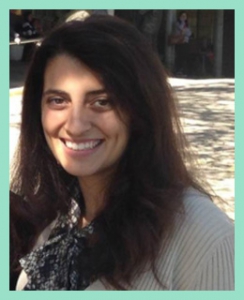 Dr. Yeganeh is an Assistant Professor in the Department of Pediatrics, Division of Infectious Disease at the UCLA David Geffen School of Medicine. She obtained her medical degree at University of Washington School of Medicine, a Master of Public Health at Johns Hopkins School of Public Health, and has been at UCLA since 2005, completing her training in pediatrics and infectious diseases. Her current NIH-supported research focuses on preventing transmission of HIV and other sexually transmitted infections (STIs) to infants by offering testing for STIs to partners of pregnant women. As part of her career development, she has performed qualitative and quantitative work assessing facilitators and barriers to male partner involvement in prenatal care. This project is currently enrolling patients at sites in South Brazil, with an aim to protect mothers from infection during the vulnerable time of pregnancy, when they are more susceptible to HIV, syphilis and other highly prevalent STIs, and more likely to vertically transmit infection to their infants. She has been collaborating with sites in Brazil since 2010, evaluating HIV and other STIs in vulnerable populations, and have worked extensively with collecting and analyzing data collected during large trials including the HPTN 040/IMPAACT 1043 trial. Through her research, she has created close collaborations with both members of the School of Medicine, the School of Public Health, and School of Engineering. She is also the Pediatric Infectious Disease Fellowship Director and the Director of the International Travel and Adoption Clinic at Mattels Children’s Hospital.
Dr. Yeganeh is an Assistant Professor in the Department of Pediatrics, Division of Infectious Disease at the UCLA David Geffen School of Medicine. She obtained her medical degree at University of Washington School of Medicine, a Master of Public Health at Johns Hopkins School of Public Health, and has been at UCLA since 2005, completing her training in pediatrics and infectious diseases. Her current NIH-supported research focuses on preventing transmission of HIV and other sexually transmitted infections (STIs) to infants by offering testing for STIs to partners of pregnant women. As part of her career development, she has performed qualitative and quantitative work assessing facilitators and barriers to male partner involvement in prenatal care. This project is currently enrolling patients at sites in South Brazil, with an aim to protect mothers from infection during the vulnerable time of pregnancy, when they are more susceptible to HIV, syphilis and other highly prevalent STIs, and more likely to vertically transmit infection to their infants. She has been collaborating with sites in Brazil since 2010, evaluating HIV and other STIs in vulnerable populations, and have worked extensively with collecting and analyzing data collected during large trials including the HPTN 040/IMPAACT 1043 trial. Through her research, she has created close collaborations with both members of the School of Medicine, the School of Public Health, and School of Engineering. She is also the Pediatric Infectious Disease Fellowship Director and the Director of the International Travel and Adoption Clinic at Mattels Children’s Hospital.
Dwight Yin
 Dwight E. Yin, MD, MPH obtained his M.D. from the University of Texas Southwestern Medical School in Dallas, TX, in 2003, then completed his internship and residency in pediatrics at the Washington University/Barnes-Jewish Hospital/St. Louis Children’s Hospital Consortium from 2003-2006, then joined Baylor College of Medicine’s Pediatrics AIDS Corps in Botswana from 2006-2009, then completed a pediatric infectious diseases fellowship and advanced research training program in pediatric infectious diseases at Duke University Medical Center from 2009-2013, and since then has been on faculty in the Division of Infectious Diseases at Children’s Mercy Kansas City and an Assistant Professor of Pediatrics at the University of Missouri-Kansas City School of Medicine. During his infectious diseases fellowship, he completed an MPH in epidemiology, and as faculty, he has worked on a PhD in epidemiology, focusing on methods for estimation of treatment effects in dynamic treatment models with time-varying exposures and time-varying outcomes. Dr. Yin has a research program focusing on combining principles of pharmacogenomics and pharmacokinetics/pharmacodynamics with methodological approaches of pharmacoepidemiology to translate discoveries about interindividual variation into improving health outcomes. His interests lie in precision medicine by optimizing drug exposure through both biological (genetics, ontogeny, pharmacokinetics/pharmacodynamics) and social-behavioral (medication adherence) strategies to improve infectious diseases outcomes in immunocompromised children. Substantive areas of interest have been in pediatric HIV/AIDS, pediatric invasive fungal infections, and pediatric antifungal pharmacology. His work in pediatric HIV/AIDS has informed guidelines on optimal timing of starting antiretroviral therapy in children, and his international pediatric HIV/AIDS work has highlighted areas of needed strategic focus to achieve UNAIDS 90-90-90 goals. His work in other pediatric immunocompromised populations has generated data on epidemiology, diagnosis, treatment, and outcomes of children with opportunistic illnesses, particularly related to invasive fungal infections. As Children’s Mercy’s principal investigator for the NIH-sponsored International Pediatric Fungal Network, Dr. Yin has been an investigator in multicenter studies to improve the diagnosis and management of invasive fungal infections in children. Dr. Yin has received funding from federal, industry, and foundation sources to investigate the clinical pharmacology of new antiviral and antifungal agents to improve the health of children with immunocompromising conditions.
Dwight E. Yin, MD, MPH obtained his M.D. from the University of Texas Southwestern Medical School in Dallas, TX, in 2003, then completed his internship and residency in pediatrics at the Washington University/Barnes-Jewish Hospital/St. Louis Children’s Hospital Consortium from 2003-2006, then joined Baylor College of Medicine’s Pediatrics AIDS Corps in Botswana from 2006-2009, then completed a pediatric infectious diseases fellowship and advanced research training program in pediatric infectious diseases at Duke University Medical Center from 2009-2013, and since then has been on faculty in the Division of Infectious Diseases at Children’s Mercy Kansas City and an Assistant Professor of Pediatrics at the University of Missouri-Kansas City School of Medicine. During his infectious diseases fellowship, he completed an MPH in epidemiology, and as faculty, he has worked on a PhD in epidemiology, focusing on methods for estimation of treatment effects in dynamic treatment models with time-varying exposures and time-varying outcomes. Dr. Yin has a research program focusing on combining principles of pharmacogenomics and pharmacokinetics/pharmacodynamics with methodological approaches of pharmacoepidemiology to translate discoveries about interindividual variation into improving health outcomes. His interests lie in precision medicine by optimizing drug exposure through both biological (genetics, ontogeny, pharmacokinetics/pharmacodynamics) and social-behavioral (medication adherence) strategies to improve infectious diseases outcomes in immunocompromised children. Substantive areas of interest have been in pediatric HIV/AIDS, pediatric invasive fungal infections, and pediatric antifungal pharmacology. His work in pediatric HIV/AIDS has informed guidelines on optimal timing of starting antiretroviral therapy in children, and his international pediatric HIV/AIDS work has highlighted areas of needed strategic focus to achieve UNAIDS 90-90-90 goals. His work in other pediatric immunocompromised populations has generated data on epidemiology, diagnosis, treatment, and outcomes of children with opportunistic illnesses, particularly related to invasive fungal infections. As Children’s Mercy’s principal investigator for the NIH-sponsored International Pediatric Fungal Network, Dr. Yin has been an investigator in multicenter studies to improve the diagnosis and management of invasive fungal infections in children. Dr. Yin has received funding from federal, industry, and foundation sources to investigate the clinical pharmacology of new antiviral and antifungal agents to improve the health of children with immunocompromising conditions.
Noelle Younge
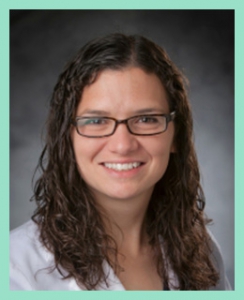
Dr. Younge is an Assistant Professor of Pediatrics in the Division of Neonatology at Duke University School of Medicine. She completed her medical degree and pediatrics residency at the University of Minnesota Medical School. She then went on to complete her fellowship in neonatal-perinatal medicine and a Masters of Health Sciences degree at Duke University School of Medicine. Dr. Younge’s research focuses on the intestinal microbiome of premature infants. She is currently funded by the National Institutes of Health on a career development award to study the relationship of the microbiome with infant growth and metabolism. She also has interests in the outcomes of premature infants born in the periviable period.
Joshua Zaritsky
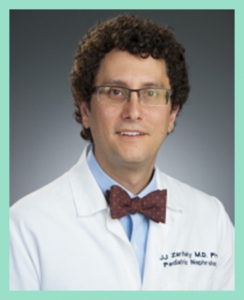 Dr. Zaritsky trained at Stanford Medical School where he received both his MD/Ph.D. through the medical scientist training program. He went on to do residency at Denver Childrens Hospital and then fellow ship in pediatric nephrology at UCLA. He is boarded in both pediatrics and pediatric nephrology. He is currently Chief of Pediatric Nephrology at A.I . DuPont Hospital for Children and Professor of Pediatrics at the Sidney Kimmel Medical College, Thomas Jefferson University. His Ph.D. thesis included the generation two mouse knockout models in order to characterize the role of 2 inwardly rectifying potassium channels in the murine heart. In fellowship and as an instructor at UCLA he explored role of a novel iron regulatory peptide, hepcidin, in the pathogenesis of anemia in CKD. This included seminal papers on hepcidin levels in CKD, HD and PD patients along with a paper on iron metabolism in a mouse model of CKD. More recently his research has focused on pediatric CKD. Most notably he has pioneered the use of lipid apheresis in order to treat focal segmental glomerulosclerosis (FSGS). His recent publication on this technique is the first to show successful application of lipid apheresis in order to treat recurrent FSGS post renal transplant. This particular paper may transform the ability to care for all patients (including adults) with this otherwise very difficult to treat disease. His other research interests include best-practices in peritoneal and hemodialysis especially in infants.
Dr. Zaritsky trained at Stanford Medical School where he received both his MD/Ph.D. through the medical scientist training program. He went on to do residency at Denver Childrens Hospital and then fellow ship in pediatric nephrology at UCLA. He is boarded in both pediatrics and pediatric nephrology. He is currently Chief of Pediatric Nephrology at A.I . DuPont Hospital for Children and Professor of Pediatrics at the Sidney Kimmel Medical College, Thomas Jefferson University. His Ph.D. thesis included the generation two mouse knockout models in order to characterize the role of 2 inwardly rectifying potassium channels in the murine heart. In fellowship and as an instructor at UCLA he explored role of a novel iron regulatory peptide, hepcidin, in the pathogenesis of anemia in CKD. This included seminal papers on hepcidin levels in CKD, HD and PD patients along with a paper on iron metabolism in a mouse model of CKD. More recently his research has focused on pediatric CKD. Most notably he has pioneered the use of lipid apheresis in order to treat focal segmental glomerulosclerosis (FSGS). His recent publication on this technique is the first to show successful application of lipid apheresis in order to treat recurrent FSGS post renal transplant. This particular paper may transform the ability to care for all patients (including adults) with this otherwise very difficult to treat disease. His other research interests include best-practices in peritoneal and hemodialysis especially in infants.
